#like objectively mass murder is generally considered not great
Explore tagged Tumblr posts
Text
as much as I love wei wuxian and slander against him is banned from this house I Do sometimes think that people forget he's like. supposed to be a morally complex person who did things that were bad. like the whole point of him and his story is that he was a good man who was pushed to do terrible things, and when we fail to examine those terrible things/completely ignore them, we're sort of doing wei wuxian and the points being made by his arc a disservice
#I think ppl get very defensive#and don't realize that bad actions =/= bad person#which is kind of the whole point of story#or even more so like. how justification works into all of it#like objectively mass murder is generally considered not great#but wei wuxian was practically forced through years of mistreatment and public ostracization#into the bloodbath and nevernight#like thats the whole THING thats the whole STORY#and part of his resurrection is him coming to terms with the fact that he did things he never wanted to!!!!#like aaaaadghfhhh shakes you shakes you shakes you THATS THE WHOLE POINT#like I love him we know this I'm his number 1 fan I think his war crimes are sexy etc etc#but when engaging in genuine thoughtful analysis of his character#it is a disservice to say he did nothing wrong#and loving his character Anyway is also kind of the point#someone can do terrible things and still deserve to be loved#ghost posts#text#wwx
20 notes
·
View notes
Text




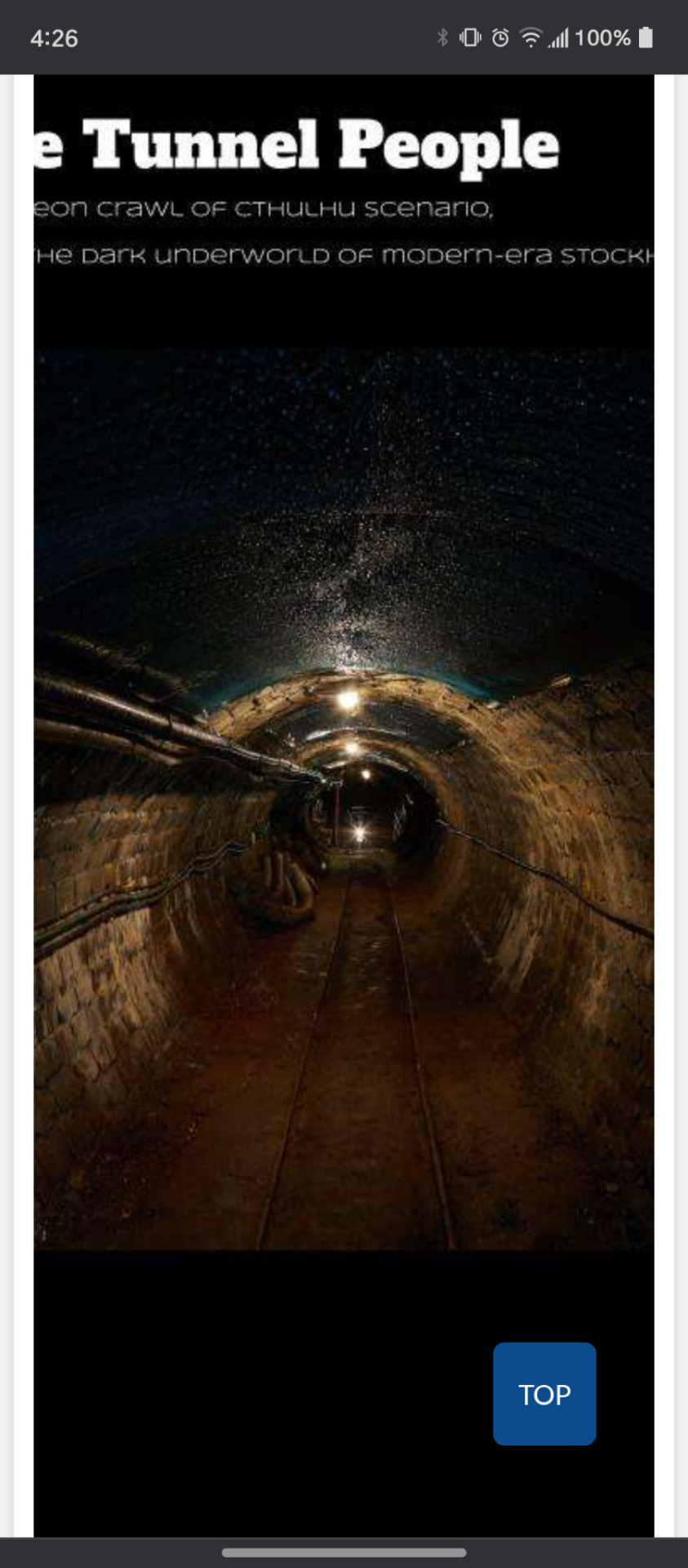

Pics:
1 & 2. The astronomer turned writer himself. Traveling - thru some twilit zone - into the darkness of the human soul. And, raising the fear therein...
3 & 4. Lovecraftian currency!! The easy way to corrupt - & consume - the all too weak human soul!
5 & 6. Following the slick slime trails, found deep beneath all cities's guts, leads (all worshippers of darkness) into their own mouth of madness...
1907: Astronomer in Residence.
Life: In January, Lovecraft lectured the Boys Club of the 1st Baptist Church on general astronomy.
Otherwise, HPL is busy with school work, his astronomical observations, writing a newspaper column & in his Jellygraphing a "special" for his few friends.
He has little time for fiction. Or, so it seems...
Output:
1. "The Picture" is a short horror story that was never published & which now seems to no longer exists.
It's plot is about a Parisian artist painting what he considers to be the ultimate embodiment of evil itself.
Sadly, the artist is later found - murdered to death!
It seems that, in his death struggle, the finished painting was almost totally destroyed.
Only a small corner of the canvas still remains...
On it, is a picture of the bloody claw that killed the artist!!
Note: Only a description of this tale is known to survive. The story itself is thought to be lost to history.
But, even this small bit of plot, shows off HPL's growth as a writer.
Previously, Howard's work relied heavily on Poe as a model.
Now, Lovecraft's tales carried the mark of writer Robert W. Chambers. And, HPL was heavily influenced by Chambers's story "The Yellow Sign."
Howard loved the work's archaic style, it's artistic atmosphere & the exotic setting.
Howard's "Picture" is now seen as a precursor to his later horror short "Pickman's Model."
Even it's title was later reused by Lovecraft, as "The Picture in the House"...
"The Picture" might be part of the early tales that HPL considered unreadable & which he destroyed...
2. "Celestial Objects For All" describes itself as an "Easy Guide to observing the skies with Opera or Field Glasses."
I could only find a single mention of this publication. And, it's Howard's 'dismissal' of our solar system's last 2 planets.
"Both", he wrote, "are visible as faint stars in opera glasses, ... their study seldom repays the observer."
9 years later, Lovecraft would opine that Uranus was likely "a hot & molten semi-sun."
We now know how close his remark really was.
Ice giants are mostly composed of hot liquid water, methane & ammonia.
Their atmosphere is full of hydrogen, helium & trace amounts of methane.
I've only heard of the planet Jupiter as being considered a proto-sun. Which is what most of us saw in "2010: The Year We Make Contact."
Note: HPL would remain interested in astronomy til his final days.
Even being able to visit NYC's Hayden Planetarium twice since it 1st opened in 1935.
Quotes:
1. Howard, on his scientific interest, "My grandma... was a lover of astronomy... And, it is to her obsolete collection of... books (on space), that I owe my affection for (the) celestial..."
2. HPL, on astronomy, "How trivial seem the rays of a (street) lamp, to him who is (used) to looking upon... suns & worlds."
3. Lovecraft, on journalism, "I was a great reformer... & had... ideas about uplifting the masses."
4. HPL, on friendships, "I believed in equality then &... invited a... bright Swedish boy (home) despite maternal protest."
2 notes
·
View notes
Text
ltdan2288 asked: As a fellow veteran of the Afghan Campaign, might I ask if you have any thoughts about the imminent end of Allied air support & combat-advisory operations over there? The fall of large swaths of the country to the Taliban is already underway, which can only be seen as an unspeakable tragedy for the people there. From a strategic perspective, there’s no reason to believe that we won’t have to return in some capacity of AQ or ISIS reestablish themselves under Taliban sponsorship. At the same time, it’s not clear to me that our presence did anything beyond kick the can down the road and delay this inevitable outcome. As someone with such a deep knowledge of military history, I’m curious if you have a different perspective.
I have been avoiding answering this post for a while now because Afghanistan dredges up so many conflicting emotions inside me. I wrestle with so many memories of my time there with my regiment to fight in a war that we all didn’t really understand what we were fighting for.
Deep breath.
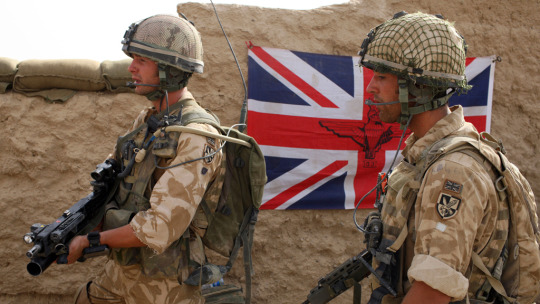
Almost two decades of conflict in Afghanistan has cost British taxpayers £22.2billion, or $31.3 billion according to UK government figures. As British troops prepare to leave Afghanistan, the 20-year deployment bill could be even higher. As of May 2021, the total cost of Operation Herrick (codename for the deployment of British soldiers to Helmand province) is £22.2billion. There were 457 fatalities on, or subsequently due to, Op Herrick. Of which 403 were due to hostile action. During the operation between January 1, 2006 and November 30, 2014, there were 10,382 British service personnel casualties. Of these 5,705 were injuries and the remainder being illness or disease. The UK’s remaining 750 troops in Afghanistan, involved in training local forces, started exiting the war-devastated country in May. Most of them will return home by the end of July.
They, like every one of us who went to fight in Afghanistan, will ask the same questions, ‘Why did we go there?’ ‘What was the real purpose of the mission?’ ‘Was it worth it?’
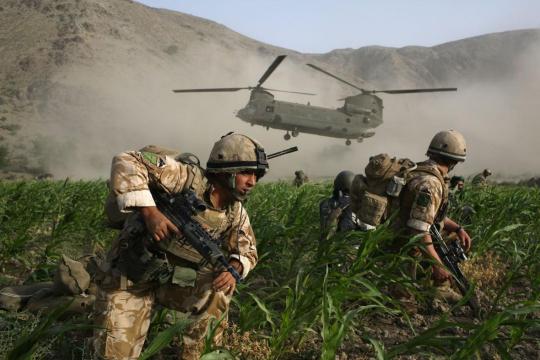
Both my older brothers fought there with special distinction and I later fought there too. I have very mixed emotions when I think about my time in Afghanistan. For all its faults and tortured history, I love that country and love its many ethnic people. I even started to learn Pashtu as I already had a spoken command of Urdu because I had been raised partly in both Pakistan and India and it’s where many Afghan refugees living in the UN camps for over a generation had learned Urdu too.
It’s not just that my family has history in Afghanistan going back to the days of the East India Company but I had a sincere respect for its culture and history as one of the central hot spots for great civilisational achievements, but also as a stubborn and unruly country who proudly defied the Great Powers to bend the knee and turned it into a ‘graveyard of empires’. Most of all I think of the friendships I made there and how my perspective on life changed as a consequence of knowing such resilience and fortitude in the face of catastrophe and death.
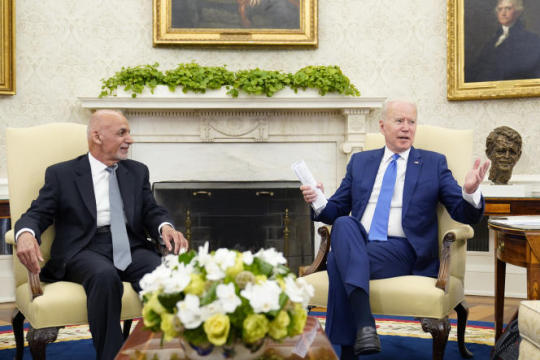
I’m sure like everyone else I wasn’t too surprised by President Biden’s announcement that he was announcing the imminent withdrawal of all American troops in Afghanistan. He wanted to pivot to something else when asked about it. “I want to talk about happy things, man!” He said. Who could begrudge him given that America has been at war in Afghanistan for a better part of 20 years and has nothing to really show for it. Except of course the loss of its brave service men and women as well as the death of thousands of Afghan civilians. It spent more than $2 trillion to kill Osama bin Laden, the architect behind 9/11 attacks and failed to convincingly snuff out both murderous terror groups, Al Qaeda and ISIS.
When the Secretary General of Nato announced back in April 2021 all alliance troops were to be withdrawn from Afghanistan, it was made to look like a nice, clean, enunciation of a joint decision. The end date was set for 11 September, 2021 - 20 years after the terrorist attacks on New York and Washington - and it was in line with the oft-repeated alliance maxim: we went in together; we will come out together. Except that, on closer examination, it was all rather messier.
This was partly because the withdrawal from Afghanistan had actually been Trump’s policy, so here was Joe Biden, the anti-Trump, co-opting a policy from his predecessor (a policy Trump had been so keen on that he tried to accelerate the withdrawal after he lost the election). Biden then tried to detach it from Trump by slowing down the withdrawal date a little and expressing it in terms more comprehensible to the Washington establishment and to US allies.
Where Trump had essentially done a deal with the Taliban and set a withdrawal date of 1 May, Biden left the Taliban out of it and invoked the totemic date of 9/11. This does not mean, of course, that the withdrawal will not be completed a good deal sooner - once you announce a withdrawal, you might as well get on with it.
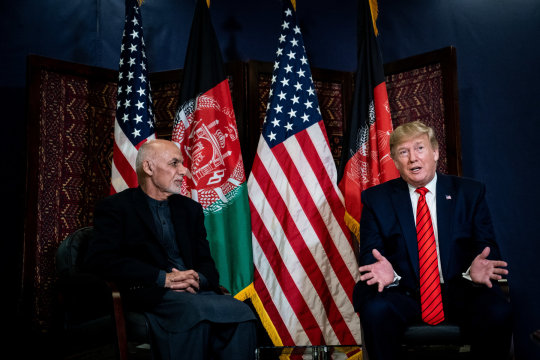
In fact, Biden had to make a decision one way or another, given the rapid approach of Trump’s 1 May withdrawal date. And, whether it came from Washington or Nato, it was pretty low key for an announcement that a 20-year military involvement that had cost 4,000 allied lives was ending. Indeed, many people beyond Washington and Afghanistan might not quite have registered the news, given the considerable noises from Nato’s simultaneous dire warnings about Russia massing troops on the Ukrainian border, the death of the Duke of Edinburgh in the UK, and the Covid pandemic everywhere.
And distractions were needed not just because Biden was implementing a Trump policy. It was also because he was ordering an unconditional withdrawal – which he justified, correctly, by saying that setting preconditions would mean that the troops could be there forever. It was a risk Biden knew all too well, given that Barack Obama had been persuaded by General David Petraeus – against his election pledges and his better judgement – that what Obama really wanted was not a withdrawal, but a ‘surge’ with conditions attached before a withdrawal could take place.
Distractions were also useful for London, where the timing was hardly ideal. Imagine you were in government in London, you had watched the dismal failure of the UK’s Herrick operations in Helmand Province between 2006 and 2014, you knew that your armed forces had suffered 456 deaths in 20 years, with many more severely injured, but you had hung on in there.
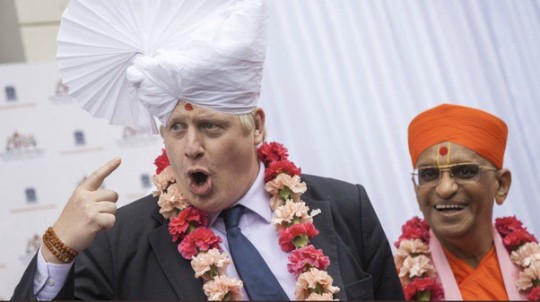
Your government had also just released a blueprint for foreign and security policy, setting future priorities even further from home, in the Indo-Pacific, and your Prime Minister was about to make a high-profile visit to India as part of his post-Brexit ‘Global Britain’ branding . In those circumstances, an announcement that the US had decided to leave Afghanistan, giving you no choice but to follow, was almost exactly what you did not need. Rather than showing the UK as a powerful, autonomous military actor and a valued ally, it showed the exact opposite.
It also reminded an unhappy British public about a costly conflict it had rather forgotten. And those who did more than bother to remember - like the families who lost loved ones on the battlefield - and who over the years have blamed successive governments for moving the goalposts and lacking an exit strategy (all true too).
All of which might explain why the UK’s Foreign and Defence Secretaries followed the US example by changing the subject to the iniquities of Russia and China, rather than issuing a joyous pronouncement to the effect of: hooray and thank goodness, our boys and girls are coming home.
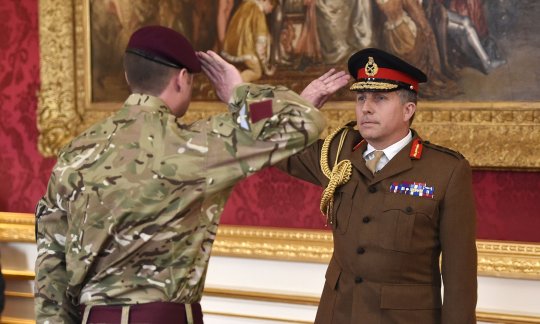
The UK’s Chief of Defence Staff, General Sir Nick Carter gave a subdued, unenthusiastic response to Biden’s announcement. I cannot remember such open acknowledgement of UK-US military policy friction in recent decades - or such an abject admission by the UK of its defence dependence on the US. What Carter said was that the unconditional withdrawal was ‘not a decision we had hoped for, but we obviously respect it and it is clearly an acknowledgement of an evolving US strategic posture’. In other words, the UK had opposed Biden’s decision – or would have done, if asked (which is not clear). Also, that it was Washington’s ‘strategic posture’ that had ‘evolved’, not the UK’s. He suggested there was a real danger that progress made could be lost and that there could be a return to civil war, with the Taliban maybe returning to power - again, all true.
Given that the UK officially has only 750 troops in Afghanistan at present, and most of them are there in a training capacity, to dissent from the US position so openly would be considered decidedly rude in the Ministry of Defence. Perhaps to that end, General Carter played the dutiful soldier and had to - through gritted teeth - put a positive gloss on Afghanistan’s future, insisting that the objective in going into Afghanistan, ‘to prevent international terrorism emerging from the country’, had been achieved which was ‘great tribute to the work of British forces and their allies’.
He also said that Afghan forces were ‘much better trained than one might imagine’ and that the Taliban ‘is not the organisation it once was’, so that ‘a scenario could play out that is actually not quite as bad as perhaps some of the naysayers are predicting.’ Blah blah blah. He’s wrong, and I think he knows it but only in the sanctity of his gentlemen’s club might he truly admit it.
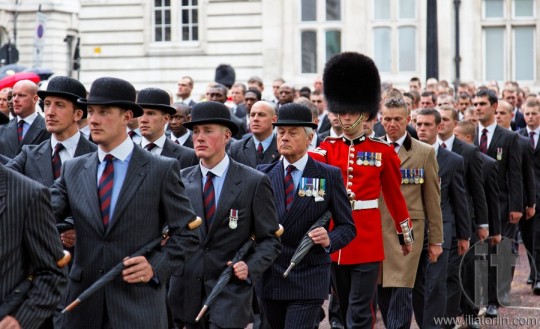
I know he’s wrong because the chatter amongst ex-veterans I know is that we’ve made a balls up of Afghanistan yet again - by ‘again’ I mean from the past 200 years of us Brits trying to bring order to chaos in Afghanistan and getting burned for our troubles.
Both my father and my older siblings tell me what their friends and ex-service peers (some very senior indeed) have been nattering over a drink at their gentlemen clubs where ex-veterans haunt the club bar. Many just shake their heads in sighed resignation before burying themselves in the Times crossword or drowning their sorrows with a beer or two at how lock in step we’ve become to the Americans at a time when the British army is re-branding itself as a more independent nimble hi-tech impact army (the creation of a new ranger regiment being but one example).
Still if President Biden wanted to tie a neat bow on U.S. involvement in Afghanistan - saying, as he had, that the logic for the war ended once al-Qaida was gutted and Osama bin Laden killed - then it reveals a stunning lack of introspection about the United States’ role in the conflict that will continue in Afghanistan long after the last American and British troops leave.
Less than three months after President Joe Biden declared that the last American troops would be out of Afghanistan by September 11th, the withdrawal is nearly complete. The departure from Bagram air base, an hour’s drive north of the capital, Kabul, in effect marked the end of America’s 20-year war. But that does not mean the end of the war in Afghanistan. If anything, it is only going to get worse.
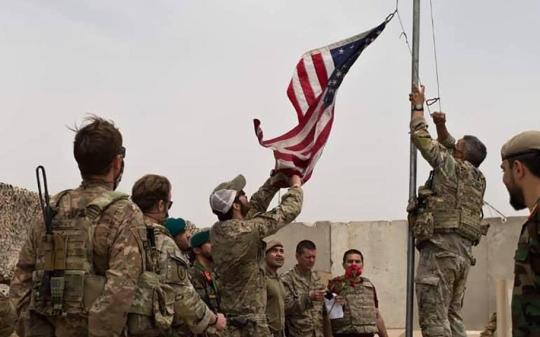
It is true that the president had no good choice on Afghanistan, and that he inherited a bad deal from his predecessor. There are never good choices when it comes to Afghanistan: only bloody trade offs.
But in announcing an unconditional withdrawal, he made the situation worse by throwing out the minimal conditions U.S. Special Envoy Zalmay Khalilzad had negotiated under the Trump administration. U.S. envoy Zalmay Khalilzad has delivered to the Afghan government and Taliban a draft Afghanistan Peace Agreement - the central idea of which is replacing the elected Afghan government with a so-called transitional one that would include the Taliban and then negotiate among its members the future permanent system of government. Crucial blank spaces in the draft include the exact share of power for each of the warring sides and which side would control security institutions.
The refrain now from the Biden administration is that the United States is not abandoning Afghanistan, that it will aim to do right by Afghan women and girls, and that it will try to nudge the Taliban and Kabul toward a peace deal using a diplomatic tool kit.
But the narrative ignores much of the reality on the ground. It also ignores history.
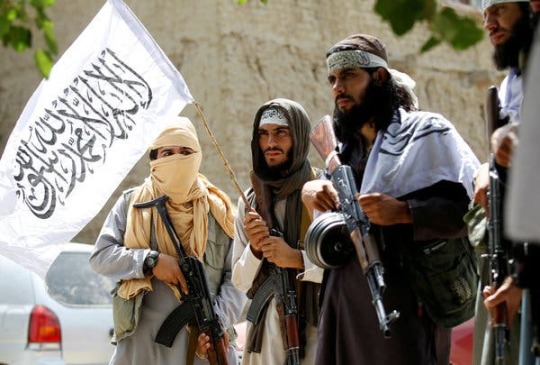
In theory, the Taliban and the American-backed government had been negotiating a peace accord, whereby the insurgents lay down their arms and participate instead in a redesigned political system. In the best-case scenario, strong American support for the government, both financial and military (in the form of continuing air strikes on the Taliban), coupled with immense pressure on the insurgents’ friends, such as Pakistan, might succeed in producing some form of power-sharing agreement.
But even if that were to happen - and the chances are low - it would be a depressing spectacle. The Taliban would insist on moving backwards in the direction of the brutal theocracy they imposed during their previous stint in power, when they confined women to their homes, stopped girls from going to school and meted out harsh punishments for sins such as wearing the wrong clothes or listening to the wrong music.
More likely than any deal, however, is that the Taliban try to use their victories on the battlefield to topple the government by force. They have already overrun much of the countryside, with government units mostly restricted to cities and towns. Demoralised government troops are abandoning their posts. In the first week of July 2021, over 1,000 of them fled from the north-eastern province of Badakhshan to neighbouring Tajikistan. The Taliban have not yet managed to capture and hold any cities, and may lack the manpower to do so in lots of places at once. They may prefer to throttle the government slowly rather than attack it head on. But the momentum is clearly on their side.
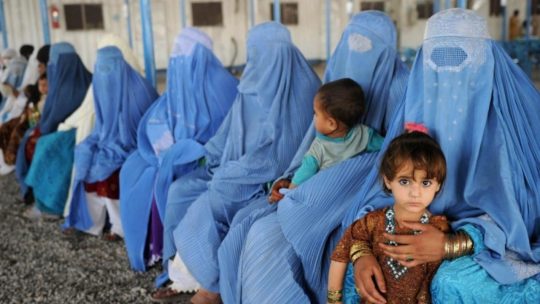
America and its NATO allies have spent billions of dollars training and equipping Afghan security forces in the hope that they would one day be able to stand alone. Instead, they started buckling even before America left. Many districts are being taken not by force, but are simply handed over. Soldiers and policemen have surrendered in droves, leaving piles of American-purchased arms and ammunition and fleets of vehicles. Even as the last American troops were leaving Bagram over the weekend of July 3rd, more than 1,000 Afghan soldiers were busy fleeing across the border into neighbouring Tajikistan as they sought to escape a Taliban assault.
As the outlook for the army and for civilians looks increasingly desperate, so do the measures proposed by the government. Ashraf Ghani, the president, is trying to mobilise militias to shore up the flimsy army. He has turned for help to figures such as Atta Mohammad Noor, who rose to power as an anti-Soviet and anti-Taliban commander and is now a potentate and businessman in Balkh province. “No matter what, we will defend our cities and the dignity of our people,” said Mr Noor in his gilded reception hall in Mazar-i-Sharif, the key to holding the north (sounds like Game of Thrones). The thinking is that such a mobilisation would be a temporary measure to give the army breathing space and allow it to regroup and the new forces would co-ordinate with government troops to push back hard on the Taliban.
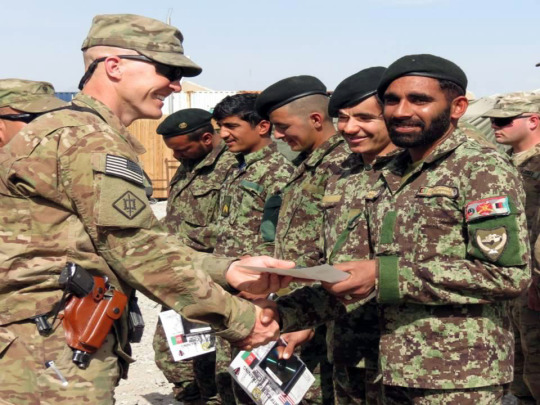
However this is Afghanistan. The prospect of unleashing warlords’ private armies fills many Afghans with dread, reminding them of the anarchy of the 1990s. Such militias, raised along ethnic lines, tended to turn on each other and the general population.
With America gone and Afghan forces melting away, the Taliban fancy their prospects. They show little sign of engaging in serious negotiations with Mr Ghani’s administration. Yet they control no major towns or cities. Sewing up the countryside puts pressure on the urban centres, but the Taliban may be in no hurry to force the issue. They generally lack heavy weapons. They may also lack the numbers to take a city against sustained resistance. On July 7th they failed to capture Qala-e-Naw, a small town. Besides, controlling a city would bring fresh headaches. They are not good at providing government services.
Perhaps the Taliban have learned their history lesson and might refrain from attacking Kabul this time around. Their best course may be to tighten the screws and wait for the government to buckle. American predictions of its fate are getting gloomier. Intelligence agencies think Mr Ghani’s government could collapse within six months, according to the Wall Street Journal. So clearly the momentum is on the side of the Taliban and they just need to chip away at Ghani’s forces one district after another until the inevitable and hateful surrender of the central Afghan government to their demands.
At the very least, the civil war is likely to intensify, as the Taliban press their advantage and the government fights for its life. Other countries - China, India, Iran, Russia and Pakistan - will seek to fill the vacuum left by America. Some will funnel money and weapons to friendly warlords. The result will be yet more bloodshed and destruction, in a country that has suffered constant warfare for more than 40 years. Those who worry about possible reprisals against the locals who worked as translators for the Americans are missing the big picture: America, Britain and other allies are abandoning an entire country of almost 40m people to a grisly fate.

Nothing exemplifies - at least in Afghan eyes - of all that has gone wrong with American involvement in Afghanistan than in the manner of their leaving.
The U.S. left Afghanistan's Bagram Airfield after nearly 20 years by shutting off the electricity and slipping away in the night without notifying the base's new Afghan commander, who discovered the Americans' departure more than two hours after they left in the middle of the night without raising any alarms.
They left behind 3.5 million items, including tens of thousands of bottles of water, energy drinks and military MRE's (Meals Ready to Eat ration packs to the uninitiated). Thousands of civilian vehicles were left, many without keys to start them, and hundreds of armoured vehicles. The Americans also left small weapons and ammunition, but the departing US troops took heavy weapons with them. Ammunition for weapons not left for the Afghan military was blown up.
Now that is some feat considering the logistics of this mass exodus without drawing any attention. You have obviously been to Bagram and so you will know just how big and sprawling it is. Bagram Airfield is the size of a small city, roadways weaving through barracks and past hangar-like buildings. There are two runways and more than 100 parking spots for fighter jets known as revetments. One of the two runways is 12,000 feet long and was built in 2006. There's a passenger lounge, a 50-bed hospital and giant hangar-size tents filled with furniture. And all those shops to remind Americans of home from familiar fast food restaurants and hairdressers and massage parlours to buying clothing and jewellery and buying a Harley Davidson motorbike (or so I’ve been told).
I’m guessing that the Afghans were certainly outside of the wire and probably had not been inside Bagram Airfield for months. So from the outset they would not have had any reason to think anything was going on until the generators probably ran out of fuel and it started to go a little too quiet. The inner gate was probably discretely left unlocked and when the US stopped answering the radio/phone and then they probably investigated.
Before the Afghan army could take control of the airfield about an hour's drive from the Afghan capital, Kabul, it was invaded by a small army of looters, who ransacked barrack after barrack and rummaged through giant storage tents before being evicted, according to Afghan troops. Afghan military leaders insist the Afghan National Security and Defense Force could hold on to the heavily fortified base despite a string of Taliban wins on the battlefield. The airfield includes a prison with about 5,000 prisoners, many of them allegedly Taliban members.
I’m pretty sure some bright spark in the US Pentagon public affairs dept convinced his military superiors that it was important to avoid the optics of Americans leaving in the same way they did in Vietnam in case it depresses the American public and the US military. Instead it demoralised its allies, the Afghan national army who are now the only line of defence against the Taliban. In one night, they lost all the goodwill of 20 years by leaving the way they did, in the night, without telling the Afghan soldiers who were outside patrolling the area. The manner in which the Americans left Bagram air base amounts to a resounding vote of no confidence in Afghanistan’s future. It just looks bad.
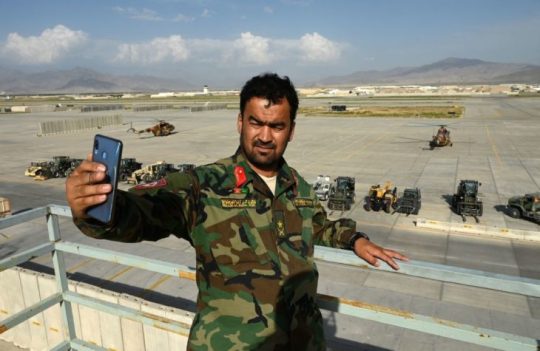
The U.S. choice came with costs attached to each decision. With staying, the cost was potential U.S. troop casualties and a fear that things would not change on the ground. With leaving comes the cost of a deeper conflict in Afghanistan and a backsliding of progress made there over the past two decades. In many ways, the costs of staying seem shorter-term and borne by the United States, while the costs of leaving will be predominantly borne by Afghans over a longer time horizon. Yet, even if those costs seem remote now, history tells us that they will be blamed on the United States.
Biden perhaps reflective of history of Americans getting into quagmires abroad didn’t want to be seen exerting time and energy for a losing cause. His decision also reflects his administration’s foreign policy for the American middle-class paradigm, which focuses on domestic considerations over international ones (and is this so different from Trump’s “America First”? No, it is not). The irony, though, is that the American middle class largely doesn’t care about Afghanistan - their ambivalence gave way to support for this decision once it was announced, but it wouldn’t be hard to visualise the public approving of a scenario that kept a couple thousand troops there for a while longer.
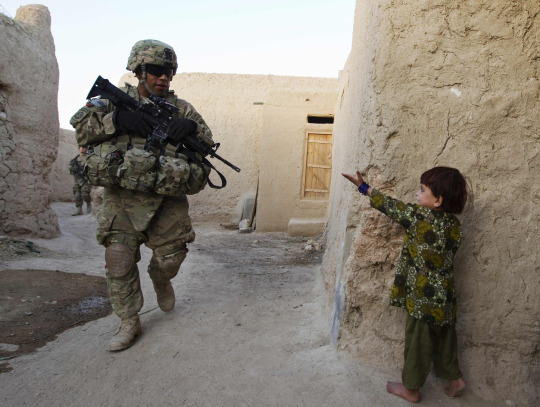
What’s perhaps most disturbing is the narrative the president has presented along with the rationale for withdrawal: that America went to Afghanistan to defeat al-Qaida after 9/11, that mission creep led America to stay on too long and, therefore, it is time to get out. This takes an incomplete view of U.S. agency in the war in Afghanistan. The narrative implies that the civil conflict in Afghanistan today did not originate with America - that this more than 40-year war began with the Soviet invasion of Afghanistan in 1979, preceded America’s interference in Afghanistan, and will follow our departure.
The fact of the matter is that, by beginning the campaign in Afghanistan in 2001 and overthrowing the Taliban, who were then engaged in their draconian rule, and installing a new government, we western allies began a new phase of the Afghan conflict — one that pitted the Kabul government and the United States/Britain/NATO against the Taliban insurgency. The Afghan people did not have a say in the matter. That we allied powers are leaving Afghan women, children, and youth better off in many ways after 20 years is due to us, and we should be proud of that. But that we are leaving them mired in a bloody conflict is also due to us, because we could not hold off the Taliban insurgency, and we must all reckon publicly with that.
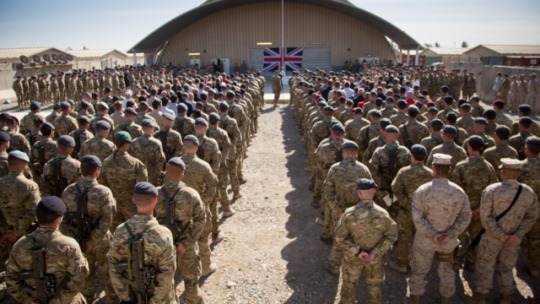
I have to ask myself why did we fail?
I’m only speaking about us Brits now as I’m sure you have your own thoughts as an ex-Marine officer of what you thought of the American military effort. Yes, I’m copping out of really bashing the yanks because first, I have too much respect for those fantastic American service men and women I did have the privilege to fight alongside with; and second, we Brits have nothing to crow about as we fucked up in lots of ways too, and to make things worse, we should have known better given our imperial history with Afghanistan.
The seeds of our failure in Afghanistan lies in not learning from history. We didn’t have a mission that was properly defined nor did we have a strategy that was clear, coherent, and easily communicated to both its fighting men and women as well as to the British public.
Were we there to get our hands bloody and to root out and destroy extreme Islamist terrorists or were we there to indulge in state building out of some idealistic notions of liberal humanitarianism? This question was at heart of our failure within our government and also within the British army as well as our relations with America and our NATO allies and finally the Afghans themselves.
Although never colonised in the same manner as other central and south Asian countries, the modern Afghan state is very much a creation borne out of great power rivalry. A land occupied by a number of different ethnic, linguistic and religious groups, it is a country whose borders were defined by, and whose sense of national identity was forged in response to western great power competition. Its geopolitical position - landlocked, mountainous, and surrounded by past great powers and present regional rivals - lends Afghanistan a dual role of geographic obscurity and great strategic significance, and has as such frequently been treated as little more than a buffer state between empires and a proxy of local powers. Its shared historical border with Russia and British India made it an object of imperial intrigue and, by consequence, has been subject to five European military interventions in the last 175 years.
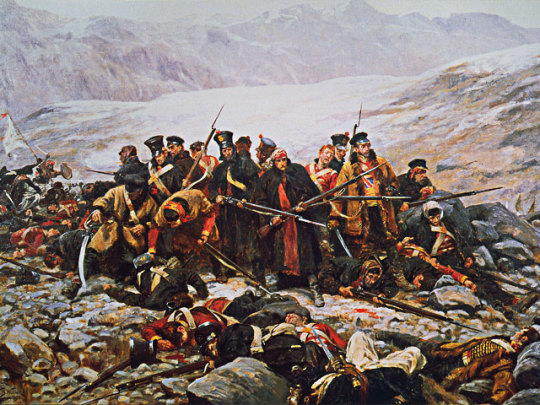
The first three interventions of these occurred during the era of ‘the Great Game’ in the nineteenth and early twentieth centuries, in which Britain and Russia (latterly the Soviet Union) competed for influence and control over Afghan politics in order to protect their respective imperial holdings in India and central Asia.
The fourth and fifth interventions, ranging from the late 1970s to the present day, similarly involved attempts by Soviets and then by an American-led international coalition to remove political leaders acting against their interests and to protect their favoured candidates.
The unifying feature of all these conflicts was the idea of Afghanistan as the site of potential threats to the interests and security of more powerful states.
Britain’s legacy in Afghanistan in particular set the tone for the country’s historical pattern of conflict and political contestation, fuelling both the intermittent emergence of Afghan national consciousness and a fractious political lineage that saw thirteen amirs in just eighty years. Interventions by the Empire during the Great Game set the conditions for the assassination of ostensibly national leaders by their compatriots (Shah Shuja Durrani in the First war) or their exile by the British (Shere Ali Khan and Ayub Khan in the Second).
Despite the British achieving their aim of protecting India in the second and third conflicts by maintaining Afghanistan as either a pro-British buffer state or as a neutral party, the Afghan narrative tends to emphasise successes such as the massacre of British forces retreating from Kabul to Jalalabad in 1842, the defeat of British and Indian forces at Maiwand in 1880, and the gaining of sovereignty in foreign affairs in 1919.
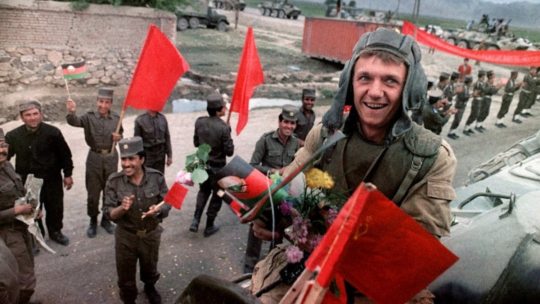
Soviet intervention in the late 1970s and 1980s further buttressed this identity of resistance, and the failure and ultimate overthrow of the Communist-backed Najibullah government, as well as the collapse of the Soviet Union shortly after their drawdown from Afghanistan, led to a sense amongst the victorious mujahidin of the country as the ‘graveyard of empires’.
Afghanistan’s modern history should thus be seen as inextricably linked to the ebbs and flows of great power politics. Each intervention exacerbated extant internal power struggles between rival elite individuals and groups vying for nominal control over the country. Foreign intervention in Afghanistan was met on each occasion with fierce resistance from tribal militias coalesced around religion; as has been remarked upon by one historian of the country, the threat of external domination has been one of the few means of uniting its disparate population around the concept of an Afghan ‘nation’, and in most cases this shared sense of identity cohered around religion, not nationalism.
Indeed, the presence of intervening powers and the development of the Afghan state may be seen as mutually supporting: whilst most Afghan leaders throughout the last two centuries have asserted their sovereignty over the country, the reality has in most circumstances been one of competing tribal chiefs and/or ‘warlords’ rather than a single dominant leader.
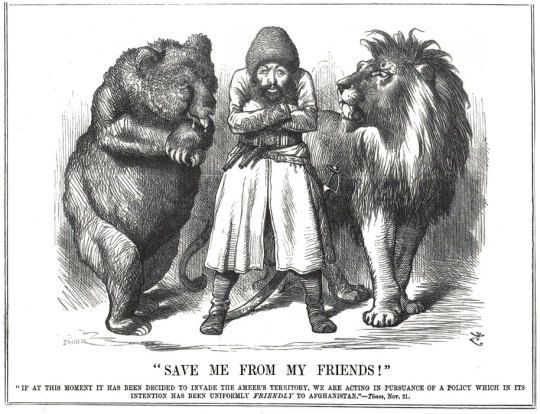
Where leaders have managed to cohere the disparate tribal and ethnic groupings of the country under one banner - most notably under the regime of Dost Mohamed Khan (1826-1839, 1845-1863) – this was due in large part to their diplomatic abilities of compromise and co-optation with Afghanistan’s regional power- brokers. In other cases, such as that of the reign of Abdurrahman (1880- 1901), power was maintained by an unflinching ‘internal imperialism’ and the use of punitive force against rebellious factions.
The challenges of maintaining and projecting centralised power in Afghanistan allow us to see the relationship of its leaders with world or regional powers in the last two centuries as one of mutual exploitation. Throughout the Great Game and the Cold War, whilst the British/Americans and Russians/Soviets would use threats and bribes (and occasionally force) to compel Afghan rulers to comply with their geopolitical needs, Afghan rulers themselves often deftly manipulated those powers to maintain and extend their own power.
The pattern followed by Afghan leaders from the nineteenth century to the present day is remarkably similar in the respect that most have relied upon a rentierist economic model, seeking external aid in order to sustain the cost of security and administration. The plan of modern rulers was to warm Afghanistan with the heat generated by the great power conflicts without getting drawn into them directly. Abdurrahman, for example, used British subsidies to fund his military campaigns against rebellious factions; the Musahiban rulers of the mid-twentieth century used American capital to develop its nascent economic infrastructure and Soviet finance to bolster its armed forces; and, following the overthrow of the last royal leader of Afghanistan, Mohamed Daoud, in 1978, the quasi-communist leadership of Babrak Karmal, Hafizullah Amin, Nur Muhammad Taraki, and Mohammad Najibullah during the late 1970s and 1980s relied in the main on Soviet money and military assistance in its ultimately failed attempt to implement socialist policies and put down the American, Saudi and Pakistani-backed mujahidin.
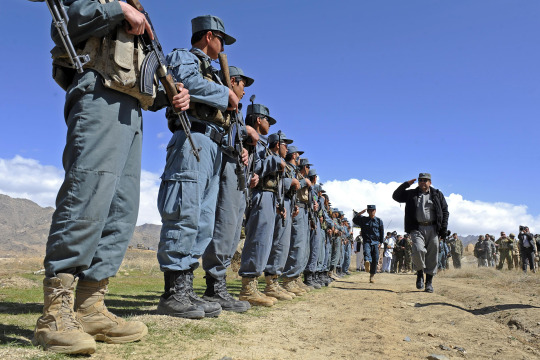
These trends continued into the post-Cold War period in respect to both the Taliban movement (essentially directed and funded by Pakistan), the Northern Alliance (funded largely by former Soviet central Asian states) and the regime of Hamid Karzai (maintained in economic and military terms by the American-led, NATO-operated International Security Assistance Force and the wider international community). In the former cases, occurring in the main in the period of civil war between 1992 and 2001, rentierism was limited to the maintenance of proxy parties and the continuation of conflict.
By contrast, the ISAF mission bore similarities with the Soviet-backed socialist regimes of the 1980s, insofar as it focused huge amounts of capital and military resources on stabilisation and state-building efforts. Both intervening parties made the error of ignoring Afghanistan’s political history and focused their efforts on bolstering the authority of a centralised state, both promoted policies that were deemed ‘universal’ in their application and were, unsurprisingly given such hubris, vulnerable to accusations by Afghan opposition to being alien and imperialistic ideologies, and both expended enormous amounts of blood and treasure in order to sustain the regimes they supported.
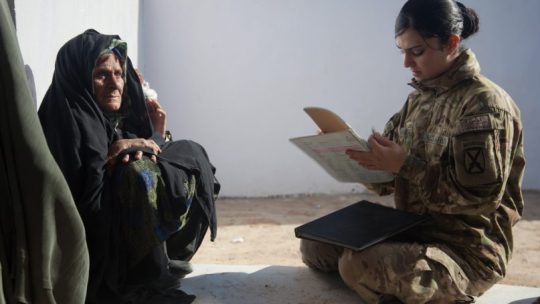
The UK’s struggle to locate a coherent strategy for Afghanistan should, therefore, be seen firstly in the light of the historical problematic of Afghan state-building. This is important in narrative terms because difficulties of defining strategy imply similar challenges in explaining strategy. As with its efforts to ‘think’ strategically, Britain’s ability to explain the strategy(ies) for the war in Afghanistan have been frequently criticised by various commentators. The most strategically debilitating aspect of the Afghan campaign has always been the incoherence of the mission’s purpose; indeed the question ‘‘why are we in Afghanistan?’’ has never really been settled in public consciousness. The international community massively underestimated the difficulties of state-building and greatly overstretched themselves in the commitments made to Afghanistan, and that they did so because ‘strategies’ for Afghanistan rested on assumptions of the universal applicability of liberal state-building.
The international community from the start (meaning from the Bonn Conference of late 2001) fundamentally misunderstood the nature of an Afghan society deeply ravaged by decades of conflict, and failed to foresee the malign effects state-building ventures would have on the country. Specifically, the Bonn Conference, which set out the parameters of the post-invasion Afghan state, implemented a centralised state system onto a state whose experience of such was limited, and where the success of such a system in extending its authority beyond the major cities was predicated on coercion and the use of force.
Historically this has rarely been a credible option for Afghan rulers or their international backers, and was even less so under the self-imposed restrictions of liberal war-fighting and state-building. Rather, re-creating a centralised state required Afghan and international actors to enter into the same methods of co-optation and compromise as those of the past; in necessitating these kind of measures – as opposed to implementing a looser, federal system of governance – the centralisation of the Afghan state paved the way for a reconstitution of a ruling order based on tribal elements and ‘strongmen’. This produced something of a paradox for state-builders, as the creation of a strong, central state capable of implementing liberal policies across Afghanistan came at the cost of entering into alliances with ‘warlords’ known for their illiberal and coercive political approaches and illicit economic activities.

Another unintended but unavoidable consequence of centralised state-building identified by scholars is the re-constitution of the rentier state in Afghanistan. Post-Bonn, Afghanistan returned to its historical norm of maintaining the state via the extraction of external security and development rents, without which it would almost certainly implode due to the ruinous state of its economy and taxation system. Studies have shown that his new rentierism differed from previous patronage systems at the state level insofar as it was fuelled by an unprecedented influx of capital and resources into the country. This had the effect of introducing regulated systems of ‘neo-patrimonalism’, where departments were to be distributed as rewards to the various factions that took part in the Bonn conference, and there had to be enough rewards to go around.
In other words, the structure of the post-invasion Afghan state was, to a great extent, defined not by the demands of good governance, the needs of the country or the demands of post-conflict stabilisation and reconstruction – the purposes for which the centralised model was chosen to promote – but rather by the first-order need to avoid the derailment of the centralised state by co-opting regional power brokers.
Because of the imperative of shoring up a nascent state by securing support from potential competitors, the gulf between the ends of liberal state-building and the illiberal means required to facilitate its functioning can therefore be seen to a certain extent as inevitable.
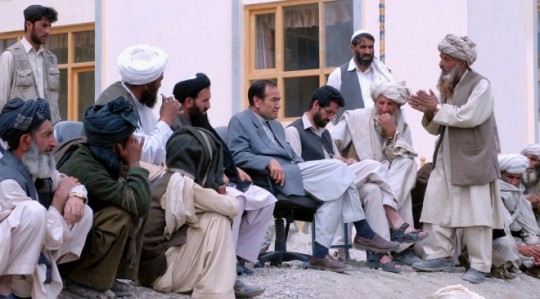
A major issue, however, was that the patrimonial linkages created by the state for its regional proxies was not comprehensive, as it did not extend to the Taliban’s Pashtun heartland and, as such, fuelled resentment and alienation as much as they placated and co- opted extra-state power brokers. Key players in the Northern Alliance - the primarily Tajik opposition to the Taliban - received prestigious posts within the state, whilst the predominantly Pashtun Taliban were themselves excluded from such arrangements. Because those rewarded by the state tended to be given ministerial or governorial roles in cities, the conflict dynamic tended to reflect an urban – rural divide similar to that of the Soviet occupation. Along this reading, the neo-Taliban insurgency was in many ways a product of the political miscalculations and deficiencies of post-invasion state- building activities.
Given this starting point, such a view concludes that the strategic problems encountered by the international community in Afghanistan were, to a large degree, problems created by (or at the very least exacerbated by) the state-builders themselves. They misread Afghan politics in a way that reflected their own philosophical assumptions about the state and society.
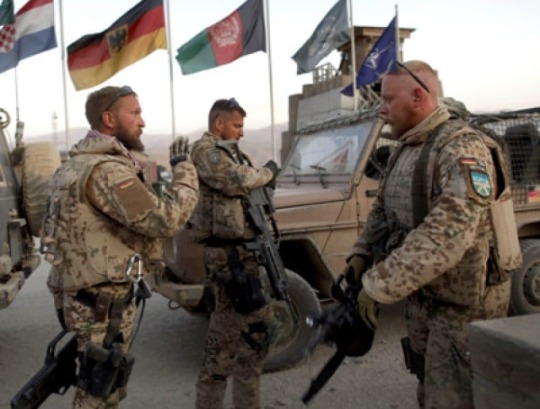
Strategy in Afghanistan suffered because the coalition effort, comprised of multiple national actors and the United Nations, rarely took on the form of a unified effort. Part of the reason for this was a divergence of opinion between actors as to the ultimate purpose – counter-terrorism or state-building – of the intervention.
In the first years of the Afghan campaign, the United States’ Bush Administration remained staunchly opposed to what it called ‘nation building’ and opted instead to pursue a policy of capture- or-kill missions against suspected terrorists. For the United Nations and most of the United States’ European NATO allies, however, state-building was considered a necessary element of any counter-terrorist strategy. This difference of opinion was manifest from the start by the creation of two parallel missions – the US-led, counter-terrorism-focused Operation Enduring Freedom (OEF) and the stabilisation missions of the European Union, United Nations (United Nations Assistance Mission in Afghanistan (UNAMA)) and NATO (International Security Assistance Force (ISAF)) – engaged in seemingly incompatible aims of military prosecution and peace building.
Opinion on the impact of this dual approach varies. Some scholars have noted, along lines similar to those critiquing the state-building efforts of the international community that the approach taken by the UN, EU and ISAF was too ambitious, naïve and unrealistic, and therefore bound to fall short of their liberal political and economic goals. Both Europe and these international agencies ignored the necessity of paring down the international community’s state-building efforts to core, security-centric capacity building within the Afghan National Security Forces. But of course one can make the counter argument, as many have of course, that on the contrary it was the insufficiencies of state-building approaches vis-��-vis OEF’s counter-terrorist approach that led to subsequent failures in UN and ISAF efforts; specifically, that a disproportionate focus on counter-terrorism missions meant that opportunities of peace- building were irreparably compromised.
Within NATO there was a division not just of opinions but also one of mission relating to different political perspectives about the purpose of the Afghan mission and its ultimate referent object – whether it was primarily about the interests of the coalition member states or concerned in the main with Afghanistan itself – and, from that, the methods to be employed in pursuit of one or another objective. This was not merely a debate bounded by strategic necessity, however; rather, such debates stemmed as much from institutional disagreements over who would or could do what in Afghanistan, which in turn arose from the differences in political constitutions and cultural attitudes towards counterinsurgency and counter- terrorism.
These ‘national caveats’ or ‘red cards’ of participation created significant problems for NATO in Afghanistan, both political, in terms of the relations between states and the abiding sense amongst some that others were ‘free-riding’ on the collective security system and, and strategic and operational, in the sense that command-and-control capabilities and cohesion between forces were limited by the engagement restrictions placed on certain armed forces. Indeed, the disproportionate burden placed on combat-oriented states like the United States, the United Kingdom, and several new member states in Eastern Europe led to political statements denouncing Europe’s perceived transgressors of collective security participation; former US Defence Secretary Robert Gates argued, for example, that NATO had effectively become a ‘two-tier alliance’ ‘between members who specialise in ‘soft’ humanitarian, development, peacekeeping and talking tasks and those conducting the ‘hard’ combat missions - between those willing and able to pay the price and bear the burdens of alliance commitments, and those who enjoy the benefits of NATO membership... but don’t want to share the risks and the costs’.
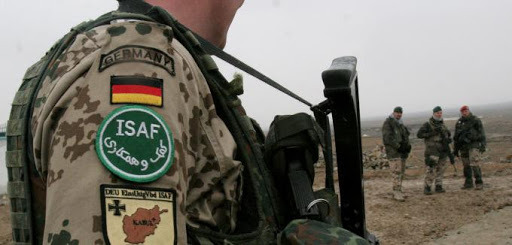
A lack of strategic unity was the natural consequence of a structural compromise that produced two distinct strategic authorities that were, in many ways, competing with one another. Along similar lines to the political arrangements between the Afghan state and its regional proxies, the NATO alliance structure can be seen (and evidently is seen by officials such as Gates) as patrimonial: states participated on the basis of fulfilling their own interests and along operational lines that were complementary to those interests, for the purposes of securing an alliance structure that accommodated all participants ahead of the imperative of creating a coherent strategy for stabilising Afghanistan. As with the neo-patrimonialism of the Karzai regime NATO’s efforts would be dictated by the limitations imposed upon it by circumstance.
Thus, in the cases of Afghanistan’s and the international community’s internal political dynamics, strategy was confined by the structure of the Afghan state and society, the structure of the international community and NATO, and the interplay between those structures. The implication here is that the agency required for the possibility of a workable strategy may have been illusory from the start.
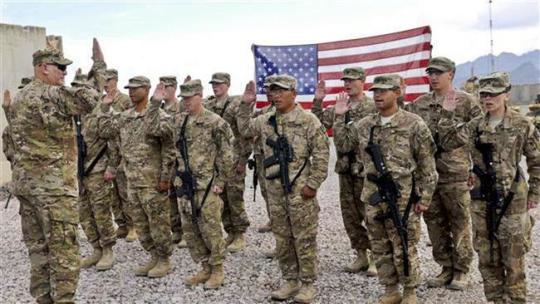
Leaving Afghanistan was never going to be pretty, but the latest turn is uglier than expected.
No one quite expected the speed of collapse within the Afghan National Army to hold of attacks of the Taliban. I don’t think it’s do with the lack of training or their professional skills is lacking (though there may be some truth in it). A big driver in the collapse is the money for wages, food and medical care for troops is syphoned to Dubai, so the Afghans who want to fight, and there are quite a few who hate the Taliban, get less replenishment than the 6th army in the last weeks of Stalingrad. They have arms, ammo and boots for this season only and that is it. Both money and morale are in short supply for these soldiers.
If I was a trained soldier in the Afghan National Army I would desert. I would say to them abandon the fixed defences these ‘ferenghis’ (foreigners) have gifted you and move to the hills and seek refuge with your tribal clan, who will be glad of the arms and experience you bring. Or get over the border if you are lucky to be in the North, if in the West you hire yourself to the Narcos in the badlands on the Iran border. Most other places it is either a last stand or defection, your Government and their relatives have already got their planes fuelled up in Kabul ready to move to their villa complexes in the UAE.
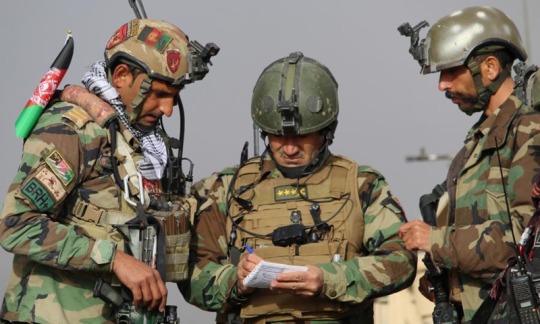
I’m being a trifle cynical but for good reason. Everyone who has been to Afghanistan sees the veil lifted on the corruption of aid and how the elites protect themselves ahead of defending the masses who bear the brunt of the bloodshed.
The corruption has been endemic from the get go, but the international community ignored it all for 'progress'. Any Afghan politico you hear on the media complaining about the West abandoning Afghanistan has at least $30 million parked in Dubai that should have gone to the soldiers, teachers, doctors, builders etc.
As spectacular as the collapse of the Afghan National Army has been it’s been even more scarier seeing how swift the Taliban has been in taking over vital provincial areas through propaganda, civilian intimidation, and rapid attacks. One by one, the Taliban has been taking over areas in a number of provinces in northern Afghanistan in recent weeks. The Taliban says it has taken control of 90 districts across the country since the middle of May. Some were seized without a single shot fired.
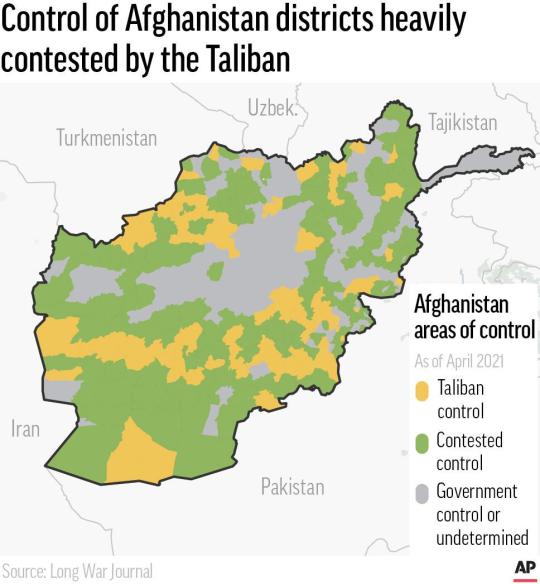
The UN's special envoy on Afghanistan, Deborah Lyon put the figure lower, at 50 out of the nation's 370 districts, but feared the worst was yet to come. Most districts that have been taken surround provincial capitals, suggesting that the Taliban are positioning themselves to try and take these capitals once all foreign forces are fully withdrawn. On a map, it's easy to see the point Lyon is making. A stark example is Mazar-i-Sharif, the biggest city in the north and a significant power centre in its own right. It was the rock upon which the Northern Alliance fought against the Taliban.
It is significant the Taliban are kicking off this offensive in the north, not their heartland in the south and east. The north was the toughest part of the country for them to crack last time. Their expectation is if they have victory there, success will flow much easier in their traditional homelands further south.
The strategy of taming the north extends to emasculating and profiting from trade routes to neighbours. On Monday night they captured the important border town of Shir Khan Bandar, Afghanistan's main crossing into Tajikistan. Earlier in the day, top Tajik government officials had met to discuss concerns about the growing instability next door. There is no indication that the Taliban intend to take their fight north of the border, but in the past Tajikistan has been a vital conduit for supplies flowing to the militants' northern enemies.
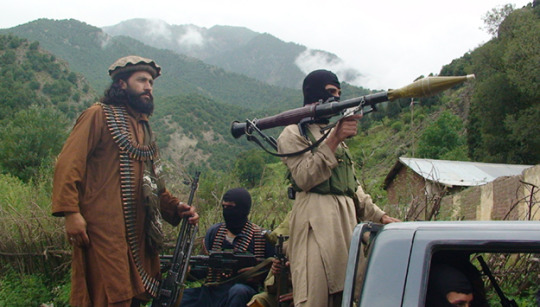
The last time the Taliban controlled the city was 20 years ago, when they left hundreds of captives in steel trucking containers to suffocate and die in the scorching desert heat. Now, the militants are back at the city gates once again, as part of a lightning offensive against Afghan government forces that has set alarm bells ringing from Kabul to Washington. So it should worry us all where will all this lead to.
America's drawdown seems to be the game changer. The Taliban have been beaten back several times in recent years, notably from Kunduz in 2015. The Taliban captured it briefly before US airstrikes were called in. Civilian casualties were high but the militants were driven out. The militant group has never been able to withstand the heavy US and NATO air assaults backing Afghan ground forces, but now the US and NATO are leaving, so is much of the threat of sophisticated and sustained air power. And the Taliban are well aware of this.
It seems to me behind the choice of withdrawal by the Biden government lies a bigger assumption that drives that choice. That is the Taliban militants' perceived desire for international recognition. This has been the mantra underpinning the American exit. The logic of the American argument has been simple: The Taliban wouldn't renege on their agreements with the US because they crave international acceptance. The events of this past week and more appear to blow a hole in that assumption.
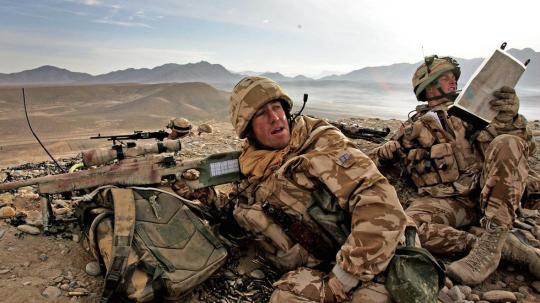
Another assumption that’s currently being blown out of the water is the US establishing some presence outside of Afghanistan so that if it needs to intervene again to combat terrorism or flush out militants then it can do so from the safety of a neighbouring country. But so far no country has come forward to reciprocate. And why would they? Like the Afghans, no one likes foreign troops with boots on the ground in their country. Only the central Asian republics and possibly Pakistan would come close to allowing that but there would be a political cost those governments would pay with their people. Moreover by welcoming the Americans in, they also allow the militants to target that country too.
Another assumption is the nature of the Taliban support and links to terrorist groups. The U.S. may not face any serious post-withdrawal Afghan support of extremist threats to the United States, even if the Taliban does take over. It is all too true that the Taliban continues to talk to the remnants of Al Qaeda, as do elements of the Pakistani military. It is unclear, however, that these remnants of Al Qaeda focus on attacks on the U.S., and the Taliban does seem to oppose ISIS. It is also unclear that the Taliban will host other extremist movements that focus on attacking the U.S. or states outside the region.
It is unclear that any key element of the Taliban has an interest in such attacks on the United States. Even Al Qaeda now focuses largely on objectives inside Islamic countries, and it is unclear that some other major extremist force will emerge in Afghanistan that do not focus on regional threats and on taking over vulnerable, largely Islamic states.
At the same time, one needs to be careful about the assumption that the U.S. can defeat any such threats by launching precision air and missile strikes against extremist targets. It is unclear that the forces in Afghanistan involved in any small covert attacks on the U.S. will be easy to target and cripple if they do emerge. The Taliban is unlikely to tolerate major training camps and facilities for extremist forces, and any such strikes will present major problems for the U.S. if the extremist threat consists of scattered small facilities and small expert cadres that shelter among the Afghan population.
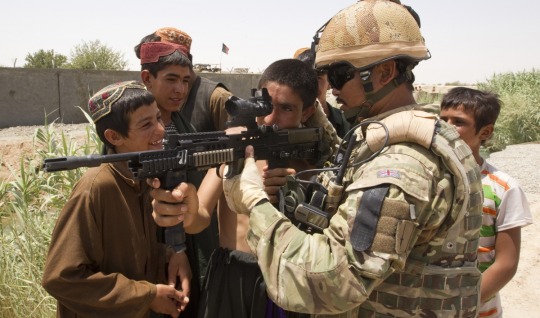
It is also far from clear that more intense U.S. air attacks on Taliban forces from outside Afghanistan will have any decisive effects. The loss of limited numbers of Taliban fighters as well as some key Taliban leaders and facilities will not offset the pace of their victories in the countryside or enable the central government to survive. A continuing U.S. ability to target and kill some key Taliban leaders and fighters also does not mean that the risk of such strikes will deter future Taliban willingness to let small, extremist strike groups conduct well-focused, well-planned strikes on U.S. or allied territory, especially if such groups in Afghanistan sponsor attacks on the U.S. or it strategic partner by strike units or cadres based in other countries.
At the same time, it does seem more likely that the Taliban, and/or any independent extremist groups, will focus largely on Iran, Pakistan, Russia, China, and the other “-Stans.”

Going forward I think we need to re-evaluate many of our assumptions about the war in Afghanistan.
The objectives of the Authorised Use of Military Force approved by the US Congress in 2001 have long been accomplished. Once Osama bin Laden was killed in Operation Neptune Spear in 2011, the last element of the AUMF was met. The American and British mission in Afghanistan was complete. But America and Britain did not leave because we wanted to do a spot of state building to curb the spread of militant islamist terror. That was a mistake as it turned out.
Post-Neptune Spear, The American, the British, and their allies’ conventional mission should have been ended, adopting instead a laser focus on intelligence collection and offensive special operations to prevent al-Qaeda (or any terrorist organisation) from re-establishing safe havens and training areas.
What was needed for an acceptable ‘victory’ and a ‘saving face’ withdrawal was to embrace the use of Afghan Militia Forces the same way the Allies did for our initial entry way back in 2001.
In 2001, Western powers won the initial military engagement in 42 days using special operations forces with local and regional allies - we need to return to this format - and through a combination of special operations and specific information operations efforts, regaining the high ground and influence over ‘centres of gravity’. The issue is not the number of troops, but the mission of the forces there. Once the mission is defined, the number of forces needed would be clear.
It has never been about the number of troops - it’s been about the lack of an achievable mission assigned to our forces in Afghanistan.
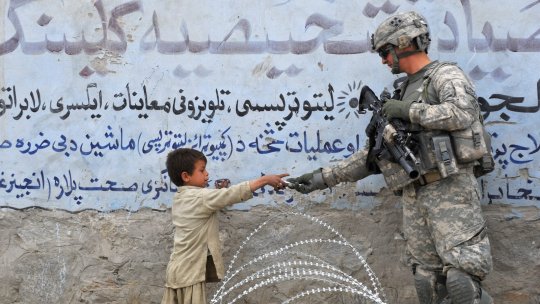
The US engaged in ‘nation-building’ for the wrong reasons - and has seen bad results. We installed Hamid Karzai, served as his praetorian guard to protect the new central government and abandon our AMF allies and attempted to build a large, bulky, expensive and ineffective Afghan National Army - a force that is now evaporating before our eyes. It was folly.
Americans will never make the Afghan people more like them - nor will they be able to instil what my American colleagues used to fondly refer to as ‘a Jeffersonian democracy’ in Afghanistan. That day may come but only when the Afghan people wish it to be so. Lest it be forgotten Americans sought independence in 1776; the Afghan people seek self-reliance and independence from foreign influence. This is their defining historical DNA: escape from any outside control.
The Afghan people are not ungoverned, they are self-governed - with no tradition of central democracy and no desire for our version of democracy or ‘prosperity’. By pushing ‘prosperity’ we had become targets for both the Afghan government and the Taliban. This has ended, but we must draw a distinction between the end of nation-building and the continuation of our own interests in Afghanistan and the region.
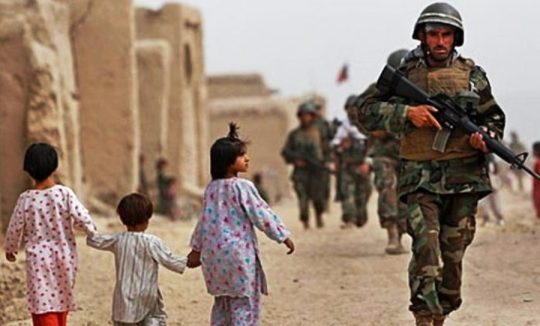
It is time to adopt a practical policy based on what will work and is in our allied interests, rather than by funding the aspirations of progressive politicians who have no real understanding of Afghanistan.
First, we must establish a clear post-‘state-building’ strategy - with achievable objectives. We must return to the policy and operational format we know will work - cooperation with Afghan tribal leaders and militia. This type of force was used to achieve the initial victory in 2001. Empowered warlords and regional leaders were the force multiplier that worked as the Afghan Militia Forces - and can again, in partnership with our Special Operations Forces work now. Intelligence collection and limited military operations should be our focus.
There is no way around it. One has to play the Great Game. Think tribal rather than central. Afghan nationhood is a liberal Western wet dream.
The central government is weak and corrupt just like all the other rulers of the past. The Afghan National Army is not as strong as it is on paper. It can hardly prop itself up rather than any government. Most of the Afghan National Army troops have stronger tribal loyalties than to the concept of a nation. Since the tribal chiefs play both sides to hedge their bets, it's no wonder 'their' people do what they're told. The Taliban know this because that has always been the Afghan way, so the tribes go with them. Provided the Taliban honour their promises to the tribal chiefs, the Taliban can do what they want.
On one hand, the tribes won't now be too bothered by central government and have a large pool of Western-trained troops to prop them up. On the other hand, they now have to do business formally with the Taliban again. Largely in order to get their hands on Western-supplied aid that will surely follow after the Americans leave.
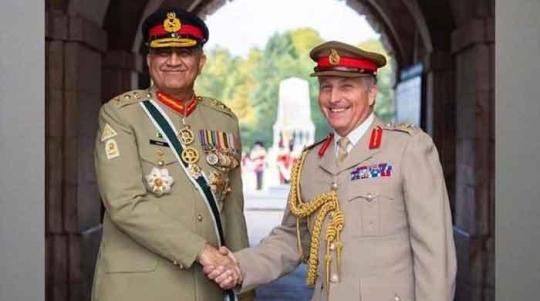
Second, we must accept the reality of Pakistani influence in Afghanistan - and work with the Pakistanis to counter al-Qaeda and the other militants now attacking Pakistani targets within Pakistan. Pakistan has made great advances in securing the tribal areas on the other side of the border and they have always been the de facto control of much of the Taliban force capacity, such as the Haqqani network. Working with Pakistan is the best option within the current circumstance.
‘Endless wars’ are not an American value. The use of the US military must only be used in response to genuine threats, when American interests are at stake or lives in danger. Withdrawal of conventional military forces and discontinuing nation building is in the US interest: leaving Afghanistan is not.
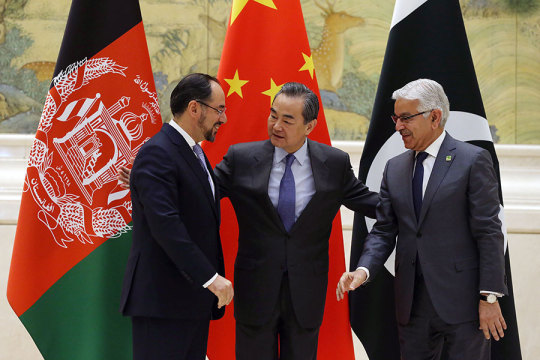
Third, make Afghanistan China’s problem. Afghanistan could easily become a hotbed for growing Islamic extremism, which would to some extent affect stability in Xinjiang.
It is not without reason that Afghanistan is known as the “graveyard of empires”. The ancient Greeks, the Mongols, the Mughals, the British, the Soviet Union and most recently the US have all launched vainglorious invasions that saw their ambitions and the blood of their soldiers drain into the sand. But after each imperial retreat, a new tournament of shadows begins. With the US pulling out of Afghanistan, China is casting an anxious gaze towards its western frontier and pursuing talks with an ascendant Taliban. The burning questions are not only whether the Taliban can fill the power vacuum created by the US withdrawal but also whether China - despite its longstanding policy of “non-interference” - may become the next superpower to try to write a chapter in Afghanistan’s history.
Beijing has held talks with the Taliban and although details of the discussions have been kept secret, government officials, diplomats and analysts from Afghanistan, India, China and the US said that crucial aspects of a broad strategy were taking shape. An Indian government official said China’s approach was to try to rebuild Afghanistan’s shattered infrastructure in co-operation with the Taliban by channelling funds through Pakistan, one of Beijing’s firmest allies in the region. China is Pakistan’s wallet.
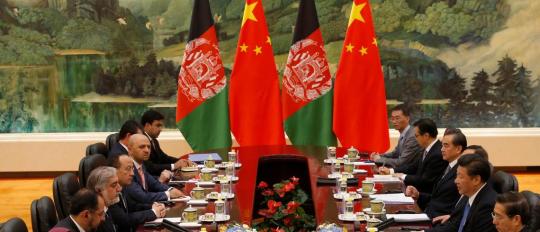
It has been reported that Beijing has been insisting that the Taliban limit its ties with groups that it said were made up of Uyghur terrorists in return for such support. The groups, which Beijing refers to as the East Turkestan Islamic Movement, are an essential part of China’s security calculus in the region. The ETIM groups were estimated by the UN Security Council last year to number up to 3,500 fighters, some of whom were based in a part of Afghanistan that borders China. Both the UN and the US designated the ETIM as terrorists in 2002 but Washington dropped its classification last year. China has accused the ETIM of carrying out multiple acts of terrorism in Xinjiang, its north-western frontier region, where Beijing has kept an estimated 1m Uyghur and other minority peoples in internment camps.
In a clear indication of Beijing’s determination to counter the ETIM, Wang Yi, China’s foreign minister, exhorted counterparts from the central Asian states of Kazakhstan, Uzbekistan, Kyrgyzstan, Tajikistan and Turkmenistan this year to co-operate to smash the group. “We should resolutely crack down on the ‘three evil forces’ [of extremism, terrorism and separatism] including the East Turkestan Islamic Movement,” Wang said in May according to Chinese news media which I follow.
The importance of this task derived in part from the need to protect large-scale activities and projects to create a safe Silk Road. Silk Road is one of the terms that Chinese officials use to refer to the Belt and Road Initiative, the signature foreign policy strategy of President Xi Jinping to build infrastructure and win influence overseas.
An important part of China’s motivation in seeking stability in Afghanistan is protecting existing BRI projects in Pakistan and the central Asian states while potentially opening Afghanistan to future investments. China would have to more actively support efforts to ensure political stability in Afghanistan. So make them work for it. Western powers need to leverage China’s problems in Xinjiang to be more active in Afghanistan.
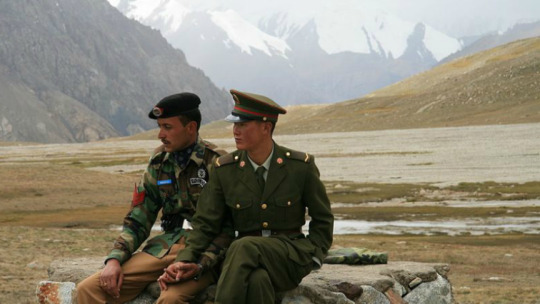
International media outlets and intelligence agencies worldwide have been circulating reports pointing toward the creation of a Chinese military base in the Wakhan Corridor of Afghanistan’s Badakhshan province for a while now. Although China has not embarked on militarisation programs on foreign soil historically, and has profusely denied the rumours about building an Afghan “mountain brigade,” China’s first overseas military base in Djibouti provides an example of China’s newly adopted strategy of leveraging economic influence to further its strategic objectives. There’s even some chatter amongst Chinese officials that Beijing may entertain the idea of being part of a future UN international force should one be needed in Afghanistan (a bad idea but hey, let China find out first hand for itself).
The Afghan government was able to maintain a measure of stability largely because of the superiority of US air support. The drones, gunships, helicopters and heavy air artillery were unmatched by the Taliban. But when the US leaves, that advantage will evaporate. China’s imperative to create overland trade routes to Europe and the Middle East may draw it inevitably into Afghanistan’s domestic strife.
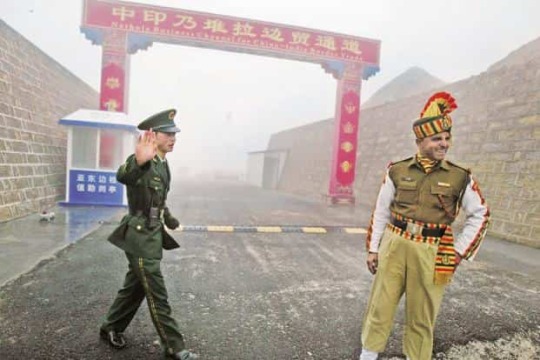
Of course China’s forward policy in the Wakhan Corridor needs to be assessed with a critical eye. Although on one level it seems to be motivated primarily by the threat of radicalisation, China’s interest in the region is also contingent on the strategic role that Afghanistan is capable of playing in the larger scheme of things. Despite China’s vehement denial, there seems to be sufficient evidence available indicating a definite military build up in the region, which provides China with an opportunity to showcase its ability to transform into a balancing force in the regional dynamics. I think that is a trade off that both America and Europe can afford to concede under the current circumstances.
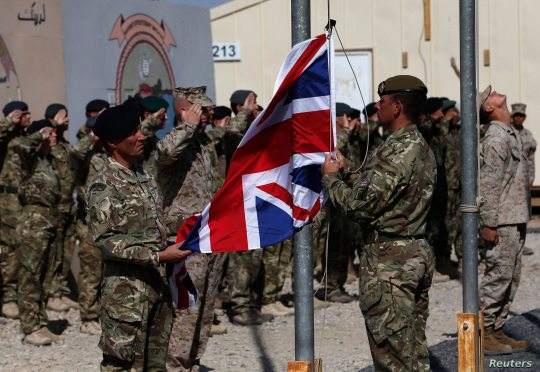
In conclusion In the face of failure, there is an impulse to move on and not ask “what led to this?” But to avoid a reckoning with our follies is to risk their repetition, or worse.
it is probably too late to salvage either the civil or military situation in Afghanistan. It almost certainly is too late to salvage it with limited in-country U.S. forces, outside U.S. airpower and intelligence assets, and with no real peace agreement or functional peace process. Limited military measures are not the answer, and neither is simply reinforcing the past processes of failure. Tragic as it may be, withdrawal may not solve anything and may well make conditions worse for millions of Afghans, but reinforcing failure is not a meaningful strategy.
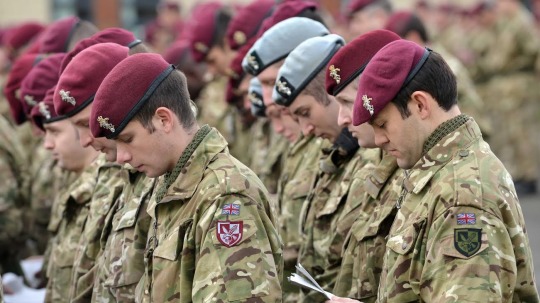
I do feel strongly that both the American and British governments must establish a clear path of redemption so that those who served and the families who sacrificed loved ones know that their loss was not wasted. At the same time our civilian governments must limit missions to intelligence collection and counter-terrorism missions that will prevent the metastasis of al-Qaeda or Isis in the region should the Afghan government fall. How we balance these two is going to be very interesting to follow in the next chapter in Afghanistan’s tortured history.
I apologise for the length of this post. This has been a hard post to write because of the subject matter and the many conflicted emotions and memories I have of my time in Afghanistan. I wish I had all the answers but I suppose the beginning of wisdom would be to know how to ask the right questions. Because we didn’t ask the right questions when we went in, we ended up making a real mess of it.
There is an understandable desire to bring all our allied troops home safe and that not another life is lost there. Yet I doubt this policy of withdrawing all troops will bring peace to anyone, not to us and most of all, the Afghanis themselves. As always in war it is the native population that will bear the real cost of war, in this case women, girls, and others brutalised under Taliban rule. What lies for them if the Taliban regain power to govern the country in their image is something I care not to imagine but retain a deep foreboding of their continued suffering. Ordinary Afghanis just want a respite from war and have a chance to live in peace, but without having us foreigners or the Taliban around. It is hard to imagine that happening at all. Our desire to save our soldiers’ lives set against ordinary Afghanis being left at the mercy of the Taliban is one of those humbling and brutalising trade offs that any war can only offer.
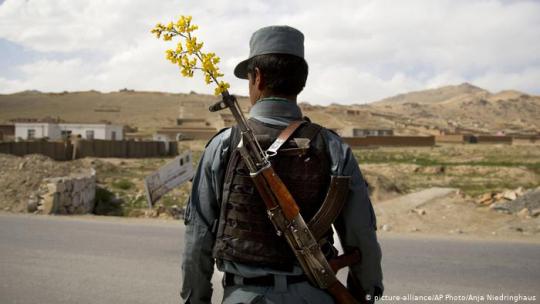
Near the end of his famed novel, The Great Gatsby, F. Scott Fitzgerald described two of his privileged characters, Tom and Daisy, as “careless people” who “smashed up things and creatures” and then “retreated back into their money or their vast carelessness” to “let other people clean up the mess they had made.”
That description applies to America as a whole but also to we Brits and other Europeans, especially when we tire of a misguided war. Americans and we Brits are a careless people. In both Iraq and Afghanistan, we smashed up things and human beings with abandon, only to retreat into our materialism. No scratch that, returning soldiers retreated into themselves struggling with PTSD whilst the rest of our citizenry carried on with their own material struggles and their insipid culture wars. The point is we always leave others to clean up the mess in a very bloody fashion that never troubles our conscience.
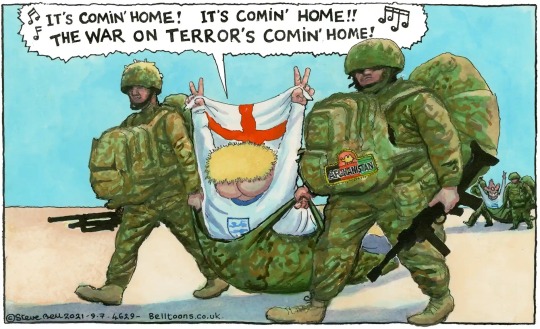
Count on us, probably sooner rather than later, doing precisely the same thing in Afghanistan. Again.
Thanks for your question
#question#ask#afghanistan#war#terrorism#warfare#history#america#britain#taliban#pakistan#china#south asia#security#intelligence#europe#un#isaf#nation building#politics#power#military#personal
163 notes
·
View notes
Text
Civil War, Stochastic Terrorism, and Free Speech
You might have heard recently that half of Americans anticipate a civil war soon. So, first off, key word: anticipate. That doesn’t mean they want it, or intend to participate in it - only that they expect it. Secondly, most people have a pretty vague notion of what “civil war” really means. I don’t think people really expect a repeat of the 1861-65 Civil War in the US. I would have compared it more to Shays’ Rebellion of 1786, or the Whiskey Rebellion of 1794, but the comparison I saw most often in a discussion $elsewhere was to the Irish Troubles of 1968-98 - massive civil unrest, terrorism, and demands for autonomy/devolution (but not necessarily full secession). But no matter how you slice it, I’m among those who expect some kind of Extremely Unpleasant times ahead.
The issue of terrorism is a particularly interesting one, and what I really want to write about now. Some people mentioned the recent uptick in (an already awful number of) mass shootings as a precursor to more severe or widespread violence. Others were quick to point out that “a civil war is not made up of lone wolf attacks” (direct quote). I think that objection is garbage, because the whole “lone wolf” idea is garbage. No, Tumblr, it’s not because “lone wolf” is based on bad biology. It’s because many of these “lone wolves” absolutely did choose specific targets and intended to foment greater violence. We know because they often expounded at great length on these topics in their subsequently found diaries, forum posts, TikToxic videos, etc. We shouldn’t exonerate people who most definitely were connected to a particular group or ideology, nor should we exonerate the leaders who planted these thoughts in their heads.
Will no one rid me of this turbulent priest?
That quote is attributed to Henry II of England, encouraging - but not outright telling - his knights to murder Thomas Becket - the archbishop of Canterbury who had opposed him on $doesntmatter. It’s one of the best known examples of what is now called stochastic terrorism (and it’s telling IMO that the definition even uses “lone wolf” to illustrate the point). “Stochastic” is not quite the same as “random” technically, but close enough for current purposes. The leaders who spout hateful rhetoric are not advocating for a specific action against a specific target, but they often know damn well that their words can lead some of their more unstable followers to commit such acts somewhere, at some place. They get the effects they want while retaining plausible deniability.
Unfortunately for them, people are onto this trick now. It’s why hate speech is even considered as an exception to general freedom of speech. People who incite these kinds of acts, even lacking specific details, should be held accountable - especially if their incitement can be directly linked to a subsequent specific act or event. I believe in free speech but it has limits and always has since before the First Amendment (or anything like it) was written. All those politicians or preachers who abuse their influence to cause murder absolutely should go to jail as accomplices.
2 notes
·
View notes
Note
Having seen your thoughts on his deeply-unpleasant daddy, might I please ask if you have any thoughts on The Gladiator himself, Hugo Danner? (THE SUPERMAN WHO MIGHT HAVE BEEN, if you will).

What would you do if you were the strongest man in the world, the strongest thing in the world, mightier than the machine? He made himself guess answers for that rhetorical query. "I would—I would have won the war. But I did not. I would run the universe single-handed. Literally single-handed. I would scorn the universe and turn it to my own ends. I would be a criminal. I would rip open banks and gut them. I would kill and destroy. I would be a secret, invisible blight. I would set out to stamp crime off the earth; I would be a super-detective, following and summarily punishing every criminal until no one dared to commit a felony. What would I do? What will I do?"
The thing that strikes me about Gladiator is that it almost feels like the book is unfinished. The quality and pace of the book is all over the place, but you can boil it's general story down to "unlucky bastard is born Superman before it's time for Superman to exist, without the necessary support, mindset and structure to become Superman, in a world that neither supports nor accepts the existence Superman, and just as he's about to have the life-changing epiphany that could make him something, he gets struck by lightning and dies in the 2nd-to-last paragraph".
The whole book is like if in the first Spider-Man story Peter Parker just gave up after Uncle Ben died and we never saw him again. It's a superhero/supervillain origin story that gets cut short right as it's about to lead to the birth of the character proper. It's frustrating, yes, but to my scavenger goblin brain that likes to dig through pop culture's trash to find nice forgotten trinkets to polish and make into something new, it also invites a lot of promise, if we get into the question of what could have happened to Hugo Danner if he didn't die on the cusp of his origin story. It's an idea I plan to use for my own pulp writings.
It's not so much whether or not Hugo MIGHT have been Superman, so much as: COULD he be Superman? Maybe, maybe not. I'd argue not, because even with all his power, and even with his parents trying to raise him as best they could, even with Hugo genuinely trying his best to be good and heroic and turn his gifts to mankind, it wasn't gonna pan out. The right pieces weren't there, the family structure wasn't there, the necessary aspects of the origin story weren't there, and ultimately, Hugo Danner wasn't cut for it. He is a failure at everything he tries to be super at.
At college on the football field, he kills a man. As a soldier on the Great War, he slaughters thousands for years, but fails to end the war, despite having been able to do so from the moment he enlisted. He is fired from a steel mill for working too far beyond the abilities of his fellows, and then fired from a bank for freeing a man from a locked safe, because the bank president suspected that Danner planned to use his powers to rob the vault. He tries using his powers to enact social change and fails again and again. He can't even enjoy daily life, because he cannot compete fairly with ordinary people, and because of that he must constantly hold himself in check, never able to fully express himself. And when he's presented with the idea of creating a race of people like him to dominate the world and to “conquer and stamp out all these things to which men of intelligence object,” he finds it ultimately distasteful, because he knows better than to expect good things to come out of his life. And then he curses God and dies. The whole book is one long argument as to why Being Superman Sucks.
He's not the break from tradition that Superman represented, he's a sci-fi superman who met the same tragic ending his predecessors did. In that paragraph above, the very first thing he thinks about, after remarking over his failure to end the war, is thinking about becoming some galactic dictator murdering everyone who steps out of line, before he considers becoming a fascist super-detective. Kind of a damning perspective to present your hero, isn't it? If Gladiator was released today, exactly as is, people would be quick to assume it's an origin story for a Homelander/Plutonian/Omni-Man kind of character. Hugo Danner was a Superman deconstruction before that became a pop culture cliche.
My favorite sections of the book are those that describe Hugo in the war. By far the best-written and most evocative, almost bordering on horror story. And they may be the most damning sections of them all. He never forgives himself for not ending the war when he could, because he's spent all those years killing and toiling away when he was just about the one person who could conceivably leap all the way to Germany and force the war to end. I imagine a lot of pulp heroes who suffered in the war, or any war, and walked out of it with a resolve to protect and do good by others, would be pretty pissed when discovering that, all along, there was this living god among them who actually could have ended the war single-handedly, but was just too damn busy slaughtering his way through fields of people who couldn't possibly fight back, to think about it.
And for all that Hugo says that he hates war and murder and bloodshed, he sure seems like a total natural for it:
Hugo, out of his scarlet fury, had one glimpse of his antagonist's face and person. The glimpse was but a flash. He was a little man—a foot shorter than Hugo. His eyes looked out from under his helmet with a sort of pathetic earnestness. And he was worried, horribly worried, standing there with his rifle lifted and trying to remember the precise technique of what would follow even while he fought back the realization that it was hopeless.
In that split second Hugo felt a human, amazing urge to tell him that it was all right, and that he ought to hold his bayonet a little higher and come forward a bit faster. The image faded back to an enemy. Hugo acted mechanically from the rituals of drill. His own knife flashed. He saw the man's clothes part smoothly from his bowels, where the point had been inserted, up to the gray-green collar. The seam reddened, gushed blood, and a length of intestine slipped out of it.
Hugo stepped over him. He was trembling and nauseated. The bellow of battle returned to Hugo's ears. He pushed back the threatening rifle easily and caught the neck in one hand, crushing it to a wet, sticky handful. So he walked through the trench, a machine that killed quickly and remorselessly
Hugo was learning about war. He thought then that the task which he had set for himself was not altogether to his liking. There should be other and more important things for him to do. He did not like to slaughter individuals. The day passed like a cycle in hell. No change in the personnel except that made by an occasional death. No food. No water. They seemed to be exiled by their countrymen in a pool of fire and famine and destruction.
And then later, after they kill a friend of his
He leaped to the parapet, shaking his fists. "God damn you dirty sons of bitches. I'll make you pay for this. You got him, got him, you bastards! I'll shove your filthy hides down the devil's throat and through his guts". He did not feel the frantic tugging of his fellows. He ran into that bubbling, doom-ridden chaos, waving his arms and shouting maniacal profanities. A dozen times he was knocked down. He bled slowly where fragments had battered him. He crossed over and paused on the German parapet. He was like a being of steel. Barbed wire trailed behind him.
Bayonets rose. Hugo wrenched three knives from their wielders in one wild clutch. His hands went out, snatching and squeezing. That was all. No weapons, no defence. Just—hands. Whatever they caught they crushed flat, and heads fell into those dreadful fingers, sides, legs, arms, bellies. Bayonets slid from his tawny skin, taking his clothes. By and by, except for his shoes, he was naked. His fingers had made a hundred bunches of clotted pulp and then a thousand as he walked swiftly forward in that trench. Ahead of him was a file of green; behind, a clogged row of writhing men. Scarcely did the occupants of each new traverse see him before they were smitten. The wounds he inflicted were monstrous. On he walked, his voice now stilled, his breath sucking and whistling through his teeth, his hands flailing and pinching and spurting red with every contact. No more formidable engine of desolation had been seen by man, no more titanic fury, no swifter and surer death. For thirty minutes he raged through that line. The men thinned. He had crossed the attacking front.
A man dipped in scarlet, nude, dripping, panting. Slowly in that hiatus he wheeled. His lungs thundered to the French. "Come on, you black bastards. I've killed them all. Come on. We'll send them down to hell."
And years later, when he's thinking back to the misery that had been his life:
His deeds frightened men or made them jealous. When he conceived a fine thing, the masses, individually or collectively, transformed it into something cheap. His fort in the forest had been branded a hoax. His effort to send himself through college and to rescue Charlotte from an unpleasant life had ended in vulgar comedy. Even that had been her triumph, her hour, and an incongruous strain of greatness had filtered through her personality rather than his. Now his years in the war were reduced to no grandeur, to a mere outlet for his savage instinct to destroy. After such a life, he reflected, he could no longer visualize himself engaged in any search for a comprehension of real values.
If he could but have ended the war single-handed, it might have been different. But he was not great enough for that. He had been a thousand men, perhaps ten thousand, but he could not be millions. He could not wrap his arms around a continent and squeeze it into submission. There were too many people, and they were too stupid to do more than fear him and hate him. Sitting there, he realized that his naïve faith in himself and the universe had foundered. The war was only another war that future generations would find romantic to contemplate and dull to study. He was only a species of genius who had missed his mark by a cosmic margin.
Even when he's thinking about the places where he went wrong, that he blames himself for, even when's engaged in introspection, his thoughts still gravitate towards violence and hatred, of squeezing continents into submission and of how much the masses are stupid to not appreciate him (because really, all Hugo wants is to be loved and appreciated for what he is), and how unlucky he was to miss his mark.
There's just no place for Hugo Danner. Maybe it was actually rather merciful that he got to have his misery ended briefly by lightning strikes, before he could either turn into something worse, or have his life ruined more throughly.
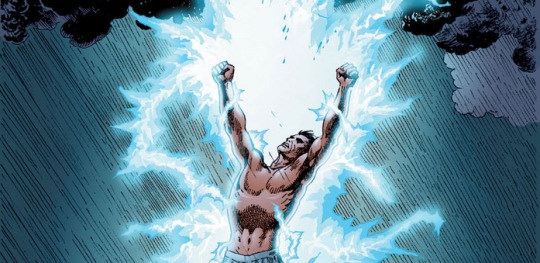
18 notes
·
View notes
Text
In my AU, I intend to include Herrah here, but I still don't know how to implement her to the story yet.
I do have have an idea on her AU counterpart. Like the Mantis Tribe, she and most of her clan members are Xenophobic. Both have really bad Cultural and Immigrant Xenophobia. And they are proud of it. It can be considered as confidence but it's not exactly fair judgement to others.
Her home rejects any objects, traditions and symbols that pertain to another nationality or group. And tend to resort to very hostile actions such as straight up murder. Now other always say this is a good thing, but it being very close-minded, inconsiderate, intolerant and seems to be problematic in the long run. The stuff I am describing is what defines the characteristics of xenophobia.
If she does tolerate you, she tend to unconsciously shun or marginalize you since she cares more about her direct family than to an outsider. It's rare for an outsider to be completely accepted to her clan society and treated like one of their own. That attitude is ingrained and taught to her from a young age, that is the social acceptable to hate and objectify outsiders.
Any foreigner in conservative countries will experience that bias first hand, mostly by the more older folks.
Her home is also very isolated with really bad or non-existent foreign relations. Most nations have that home turf bias, but their intense distrust to anyone they see as "different" to themselves makes it near impossible to trade. That isolationist attitude is more prevalent on the older, more traditional folks. They lived during at time where they have enough resources to be isolated without having food shortages or famine. And still think that time is considered the "golden" days.
This will cause some issues such as a huge food shortage if they have a bad hunting season or the crops died early. No one wants to trade with them since they are shitty people to deal with.
I was mostly inspired by how North Korea is so isolated with the world, they do have food shortages and cannot always import supplies due to how many sanctions they have.
And also at the many tv shows/movies from different countries I watched. Each always shows their home native as the protagonist or the good guy while reducing the role of the foreigners to 2d caricatures. They don't see it as bad, it helps boost the moral of the public, but it's a bit insensitive and racist to the foreigners. My own home have TV shows that show foreigners as 2d stereotypes with little or or personality.
I was also inspired by how Japan, while very, very proud of their own heritage, can have citizens who are just racist and really rude to foreigners. This idea of Japan as this exciting and exotic nation with badass ninjas and amazing technology is cool, but that's it, an ideal image in our heads that does not show the whole picture.
Like the saying goes, no man is an island, or rather no nation can depend on themselves forever.
The only time she can ever trust and be actually honest with a stranger is if her life and her home is endanger as a last resort.
Even then old habits die hard and It's always an internal dilemma for her since it feels treating an "outsider" as an equal is like a betrayal of the traditions her home are so proud of. Though she is slowly realizing isolating oneself is not really sustainable in the long run.
Good foreign relations and having allies is ultimately needed for her home to have a greater chances of survival, especially to avoid the upcoming food crisis she fears. But she knows the more older folks and her own nanny, who she have great respect for, will greatly disagree to the idea of it.
The decision of Leader don't always reflect the decision of the masses. I have seen some decisions by leaders that sounds like a good idea and is, but the masses and general populace will think otherwise. Both parties have a different view, perception, and intend on things. There are also always the older generations who have a clear view on what pertains as "tradition".
We all have traditions that was accepted and encouraged in the past, but now it will be seen as very, very inappropriate. Like Dog meat as a delicacy, foot binding, racial segregation, same sex marriage amongst others.
Midwife's dialogue, yes the huge centipede who will always try to eat us. She mentions she personally do not like Herrah's decision, but that's it. I've always wondered how that whole conversation went down when Herrah announce that she is going through PK's plan.
I think Herrah expected some form of back lash but it's never shown if Midwife did anything else or they just quietly accepted the idea immediately like a blind acolyte. This give me the odd impression that Midwife is the type who will gladly jump in a pot of lava if Herrah ask her to.
But this may not be the case, Midwife is anything but a blind acolyte. She have her own opinions and is just as headstrong and capable as any fighter is, but more into false trickery and lies. So either Midwife cares more about Herrah than her voicing out her own opinions, or she's afraid of her queen.
So for Herrah, her main issue and arc is trying to adapt and slowly introduce change in the modern world, while keeping the more traditional folks from getting angry too much to start a rebellion. She respects them and her home, they are who she looked up to and inspired her to be that fearless beast she is now. But she is also starting to realized that mind set of being closed off is not good for their survival. As a Leader she needs to think of her people's future, and they cannot survive on pride alone.
And also dealing with her own internalized xenophobia, which she was raised and taught with. She will definitely be outside her own comfort zone.
#hollow knight au#hollow knight#Herrah the Beast#alternate universe#human au#au#hk#Queen General Herrah
4 notes
·
View notes
Text
Sky
Perhaps this will be hard to read. Laments often are. It may bring you comfort, or it may make you angry. It may make you think more of me, or less. It may offend you. Rest assured, it offends me. So be it.
Once upon a time, there was a man who spoke of torture as a good in and of itself, to be pursued whether it was effective or not. Who promised to use the power of the state to enact violence upon scapegoated religious and ethnic minorities. Who insisted upon framing our struggle against Mideast terror groups in the same religious terms the terrorists themselves insist upon. Who praised himself for nursing petty grudges, for treating revenge as justice. Who threatened the free press with retaliation for reporting certain truths about him. Who bragged about sexual assault. Who mocked people more brave than himself and called their bravery weakness. Who lied seemingly without strategy, as if lies were good to tell only for the telling, who showed a shocking indifference to the very concept of truth. Who praised brutal dictators for their brutal methods. Who seemed (and seems) to be receiving shadowy support from a brutal dictator. Who claimed dictatorial power for himself.
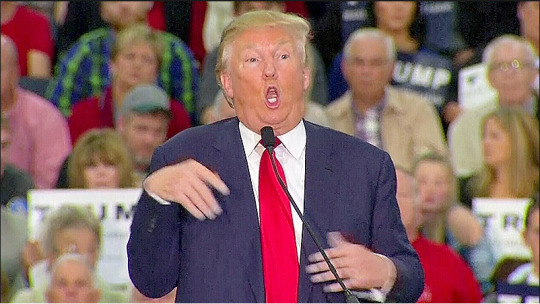
This is fine.
He appeared entirely confused about the basic facts of geopolitical reality, or of how our government works, or even of the function within our government of the role he proposed to take on. He had a clear and obvious history of fraud and hucksterism, of enriching himself at the benefit of others with less leverage, and was even engaged throughout his campaign in a lawsuit for defrauding college students, since settled for $25 million dollars. He speculated with frightening casualness about destabilizing actions: proliferation and even use of nuclear weapons, defaulting on our debts and our treaties, backing out of our most long-standing alliances. He publicly called upon the intelligence apparatuses of foreign governments to intercede in our election on his behalf, and it seems increasingly likely they may have obliged. He whipped his crowds into frenzies, then directed their ire toward journalists reporting the event, many of whom he threatened to prosecute once in power. He offered to imprison his political adversary, to the delight of his chanting crowds, who wore t-shirts decorated with the flag celebrating the war to preserve American slavery, decorated with vulgar slogans of violence and rage. He promised to steer us directly into the deadly heart of the oncoming climate catastrophe; having claimed the work of men more intelligent and knowledgeable than he was nothing but a Chinese hoax, he sneered at the very idea of new energy sources.

This is fine.
That’s a short list. It’s a hell of a short list. But wait, listen: The people went for it.
Tens of millions of people voted to make him the most powerful man in the world. He will soon have the ability to blast the planet to an irradiated cinder, if he sees fit. He will continue to run his business, which appears to involve sitting in a golden throne and putting his names on things. He's given every indication, despite some laughably thin feints toward divestment, he will run that business from the Oval Office. Maybe he’ll even put his name on new things, like laws. Laws: a whole new product line for Trump International, and a potentially lucrative one. He owes the banks of foreign powers millions and millions of dollars. One wonders what laws they’ll want passed. Word is, his first foreign trip will be to visit Vladimir Putin. Heigh-ho.

His party is in control, too. They don't seem bothered by any of this. They're a bit more focused on providing checks and balances upon ethics watchdogs who have pointed out their party leader's multifarious and historically unprecedented infractions. They'd rather ignore those, so they can immediately—immediately—get down to the serious business of divesting millions and millions of the most vulnerable people in our society from the only chance they have at affordable health coverage. They plan to replace this program with something...someday. Their speculation so far indicates they will be replacing it with the opportunity to save up hundreds of thousands of dollars to pay for medical bills if you need them someday, or, if you don't have hundreds of thousands of spare dollars, to maybe go screw yourself. So, a lot of people are going to die in coming years, that would otherwise have lived, and they're rushing to make it happen. My, look at them laugh.

Republican lawmakers sign legislation to repeal ACA and defund women's health care access through Planned Parenthood, January 2016
Meanwhile, they're ignoring as peccadilloes the caricatured infractions of a man who intends to keep his own private security detail around him, who expounds upon provable lies, and then when exposed simply doubles down on the lie, who is considering throwing the press out of the White House, and other maneuvers straight out of the dictator handbook. It's really something to see. It's a new order, trumping the old. Isn't it great again?
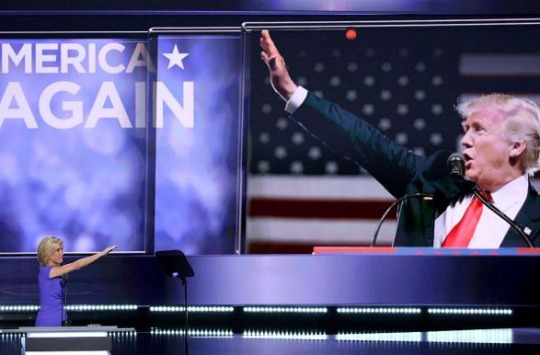
Laura Ingraham, speaker at the Republican National Convention, 2016.
It’s hard to understand what people hoped for from him other than this. It’s hard not to assume they were responding to the shockingly frank bigotry, his promises to return to an earlier time, the knowing use of slogans used byracists and fascists of days past. These are certainly what seemed to generate all the most popular applause lines. But I don’t want to think that of my country or my fellow citizens. I really want it to be something else. Let us consider other possibilities. Many seem to think that a great thing about him was his frankness. They liked that he “tells it the way it is.” Then again, those same people seemed most likely to think that he didn’t really mean his more shocking proposals. It’s a bit confusing, then, parsing what is meant by ‘telling it like it is,' as it appears to rely on selective trust in insincerity. Many voters, excited by promises to “drain the swamp,” but now disappointed by the recent appointment of a Goldman Sachs foreclosure kingpin to Treasury, of a Putin-connected oil executive to State, and by other signals the new president has given about his eagerness to rob us all blind, have been admonished by a key advisor for taking his words so literally. The 'alt-right' Neo Nazis and the KKK are very excited, for what it’s worth, about the more shocking proposals, and they remain confident our new leader meant every word.

You're really going to want to go to video on this one.
Some people thought he would be less likely to make them pay more in taxes, I suppose. So perhaps at last now we know the answer to the old hypothetical about whether we’d be willing to travel through time and sacrifice our lives to prevent the rise of a self-professing tyrant. Answer: We wouldn’t even suffer a hypothetical increase in our income taxes. I'm told folks voted for Trump because they were tired of being called racist. I imagine that was hard for them—who wants to be considered racist? If this complaint is yours, I imagine reading this (if you're still reading) is also hard. I sympathize; it's not particularly easy to write. But then again, the response seems an odd retort to the complaint. If your persistent problem is people keep telling you there is spinach in your teeth, you might consider getting a mirror and taking a look, rather than voting for the Jolly Green Giant running on a platform of outlawing all floss. And, perhaps, if it is painful to be considered racist, consider this: it may be all the more painful to live under racist oppression.
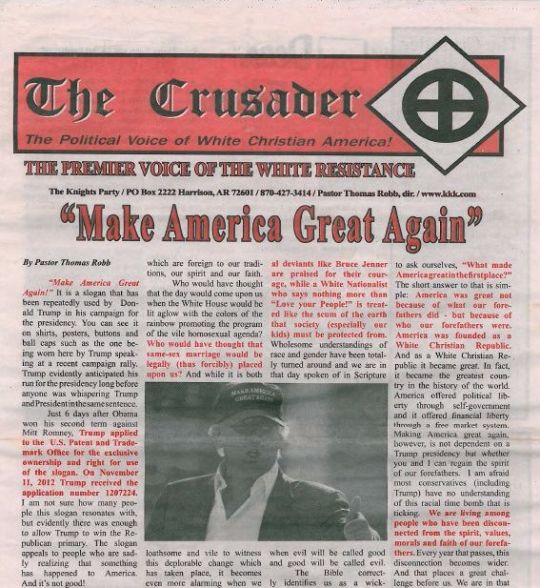
KKK Newspaper, The Crusader, endorses Trump.
Many seem to have mainly enjoyed that he wasn’t Hillary Clinton, and it’s certainly true to say many concerns and criticisms could be levied against her. But the man they voted for as an alternative already stood actualized as the cartoon parody of any potential danger she may have hypothetically posed. Bad judgment? Corruption? Fraud? A proclivity to violent retaliation? A worry about temperament? Untrustworthiness? Lack of transparency? It’s hard to believe this all had much to do with Hillary Clinton and her faults. Hard to believe this list of concerns would yours, but your acceptable alternative would be Donald Trump.
Or maybe they believed the more lurid stories, the debunked, the ridiculous. Hillary’s murdered 80 people close to her. She invented cancer and put it in your cell phone battery. She is secretly seven tiny demons all stacked up in a pantsuit and glued together with the blood of aborted fetuses. She controls the Yosemite supervolcano, along with a cabal comprised of George Soros and 17 other Jewish industrialists. I don’t know what all. I know there are people like this, who have seceded from objective reality into a dystopian alternate dimension, where they can perhaps supplement the powerlessness they feel in their lives with the comfort of false control, of being one of the few with the secret knowledge unavailable to the masses. I don’t know what to do with them, because they live in an alternate dimension. And, it must be said, I don’t think there are 63 million of them.
So here we are. In grave moral and physical danger. All of us. And for what? I’ve heard the same line again and again since the election: “America isn’t a different country today than it was before the election.” Jon Stewart trotted it out. I think I heard it from President Obama.
I fear I agree with the statement. I’m puzzled, though, because I think it is meant to be reassuring, to think we’ve always been the country capable of such a choice.
The statement doesn’t imply that we’re still great. It implies that we were never good.
It has to be admitted, people responded to Trump for what he is. Which means we are left with the statements and proposals by which he distinguished himself. And millions of us—tens of millions—preferred him specifically for his points of difference. Excited by his promises to return us to a time when our system existed only for certain people, and the preferences and needs of all others were beneath consideration, or at least willing to overlook that, in favor of some material or policy advantage somewhere. And ultimately, the reason is immaterial. A man ran for president promising to use the power of the state to bring violence to scapegoated religious and ethnic minorities, to make America torture again, to make it easier for an already-militarized police force to employ violence, who praised dictators, who bragged about sexual assault, who praised vengeance as good, who promoted as fact debunked conspiracy, who stated his determination to ignore as conspiracy what the data overwhelmingly indicates is an oncoming extinction-level event. There was some other reason to vote for him, that allowed you to overlook these facts? Save it, please. It really doesn't matter. It was a bad reason. We have seen this movie before. Historians have a word for Germans who joined the Nazi party, not because they hated Jews, but out of a hope for restored patriotism, or a sense of economic anxiety, or a hope to preserve their religious values, or dislike of their opponents, or raw political opportunism, or convenience, or ignorance, or greed. That word is "Nazi." Nobody cares about their motives anymore. They joined what they joined. They lent their support and their moral approval. And, in so doing, they bound themselves to everything that came after. Who cares any more what particular knot they used in the binding? What am I saying here? Am I saying we are Nazis? The answer, I suppose, has to be 'no.' Only Nazis are Nazis. We are Americans. But what that will mean in decades to come—'American'—has been thrown into hazard. We used to be the sort of place that doesn't allow Donald Trumps to happen. That's gone now, along with that specific sort of trust the world once had in us. In any case, what we seem to now be trying to redefine 'American' to mean seems like a rough beast, and omnivorous. Democracy reveals us by our choices and our actions, not our intentions. We are what we are. And Donald Trump will be president.
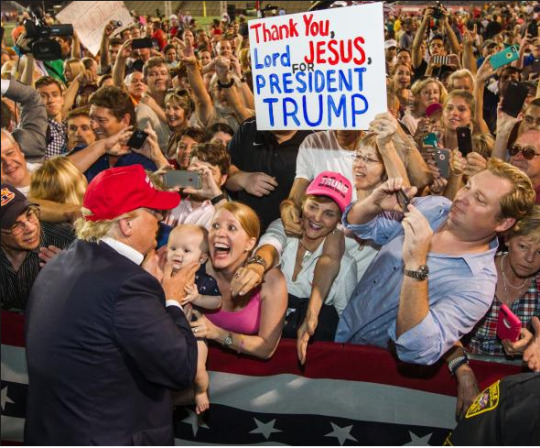
As a result, I’m bereft. Bereft of the country I thought I was living in. Bereft of the people I thought I lived among. Bereft of what I believed was a shared direction despite divergent opinions. Bereft of a belief in the possibility of a common dialogue or even a common reality. Bereft in confidence in basic decency and intelligence. Bereft of the spiritual heritage I was born into, because of course Trump’s most enthusiastic supporters were white Christians. Christians voting for a new Herod with the power of a Caesar is a pretty good joke for the universe to tell, I suppose. He’s even promised to go after the (anchor) babies.
My translation of the Bible is full of all this toff about loving your enemy, about how love of money is the root of evil, about showing hospitality to the widow and orphan and the immigrant, and admonishments against drawing the sword lest you die on it. My reading of the Bible doesn't ask "but who's going to pay for that?" My reading of the Bible suggests to me that if you wish to pretend to care about babies unborn, maybe you shouldn’t be so hostile to the idea of making sure they’re cared for once they are born and inconveniently and expensively needy, and perhaps you shouldn’t make so many of their mothers into the welfare-queen boogie-men of your whole realpolitik, and perhaps you shouldn't make weaponry a right more important than health and food. Maybe healing and wholeness and liberty is something that should be available to even the pagan. Maybe the door is open for the tax collector and the prostitute and the Samaritan. Maybe, unencumbered by the overweening need to be perceived as correct in every moral posture, they've even entered that door ahead of us as we do our best to hold it shut against unworthy access.

Maybe I got a trash translation. Maybe the other ones are all about the joys of using political power for your own aggrandizement instead of the call to self-sacrifice for the benefit of others, about the dangers of anchor babies and welfare mothers, about how paying tax money toward a shared life is tyranny, about how with terrorists you have to kill the families, folks, believe me, kill the women and children, you’ve got to go after the families, and we’re gonna torture again, folks, we’re gonna torture, believe me…
You know what? I believe him.
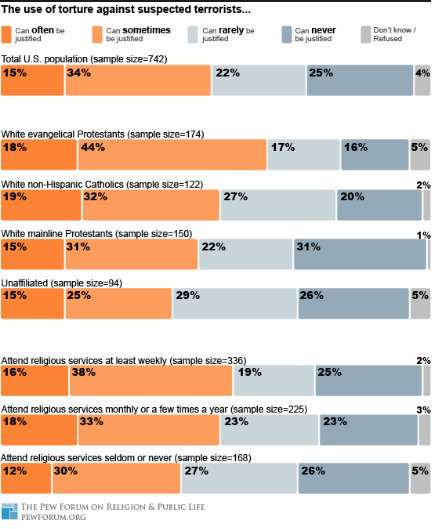
WWJD Check: White Evangelicals are the group most likely favor use of torture by a military superpower.
* * * You wake up and the sky is gone. At times that’s how it seems. You wonder at it: how could there not be a sky? What will become of us now, in this world without a sky? Was it ever there, or did we just imagine it there, as an exercise of collective will?
And then you talk to other people who insist the sky is there. They say: It’s not gone, it’s just red now. Don’t be a sore loser, just because you didn’t want it red. Accept that we did want it red. It’ll be fine if it’s red. And anyway, the banks seem to like it red. Move on with your life. Suck it up. Hope that the red sky will be as good as the blue one. But the sky isn’t red. It’s not anything. It’s just … not. It is a not-ness. An un-sky. A nothing.
And then you start talking to people who laugh, not without compassion, that you ever fell for the idea there was a sky. They say: That big vast emptiness? Oh, yes. That’s always been there for us. Is it there for you now? How… interesting. We can tell you a thing or two about that emptiness, if you’d listen. We’ve been watching it an awful long time.

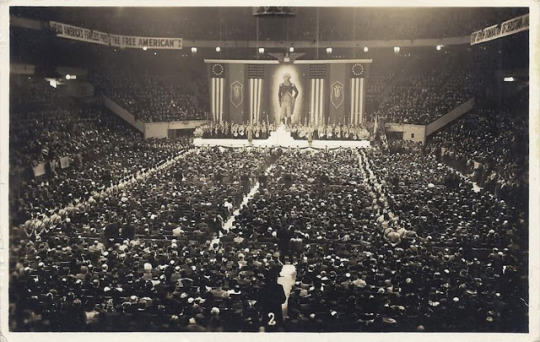
American Nazi Rally, Madison Square Garden, 1939
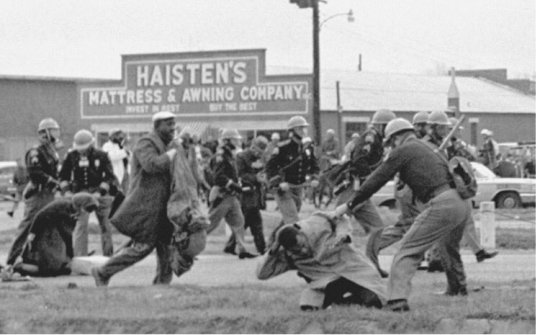
Future Georgia Representative and Civil Rights pioneer John Lewis, beaten by a state trooper on "Bloody Sunday" in 1965.

Oh. Will he. Will he do that.

The sky is the future. Or it was the future. That’s how it seems, at times. How odd, to speak of the future in the past tense.
But the past tense presents us with further troubles. It seems the past is gone, too.
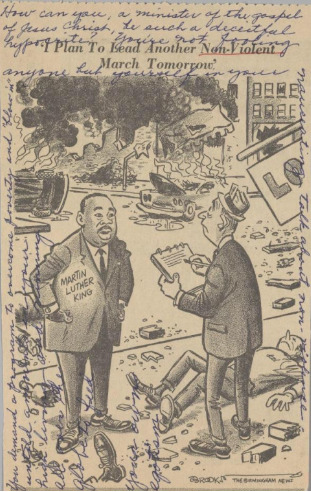
In 1965, everybody thought King was great, and nobody tried to dismiss him by tying him to violence.
Growing up, we were taught that we were a kind and good and just nation. The story we were given was of a nation born of a righteous cause, not quite made perfect by the godlike men who forged it, but honed to apotheosis over the decades that followed. The destruction of the native nations and their people, ah, tsk, a shame, we’d change it if we could, but unfortunately in the past and unrecoverable. Slavery, a dark stain, but by now expunged entirely. Jim Crow, its shameful cousin, absorbed by a saint named King, who led a boycott (a pleasant and polite and non-disruptive one, it seems, in our memories), then stood on some stairs to give a universally-admired speech about his dream of inclusion, and then, his work seemingly accomplished, having seemingly changed minds forever, ascended harmlessly into the clouds.
Somehow we are never culpable. It was always a long time ago. Mistakes were made, but we’d never make them ourselves. It was always somebody else holding the gun, the whip. We arrived here after that, you see, born blameless, without any afterbirth or shock, into the Greatest Country in the World. Our holocausts we absolved ourselves of, because they served to illustrate not the evil we’d done, but how far we’d come from it. We stood on the prow of the ship, looking forward as we cut new water, not aft looking back at whatever may have been churned up in the wake. Not big on the rear-view mirror, us, not fans of the over-the-shoulder glance. We’d tell ourselves stories of what lay behind. We’d imagine ourselves into those stories of darker times, making ourselves the protagonists. We would have been the ones to build false walls in our home to hide slaves. We would have marched with King. We would have spoken out against the Japanese camps. We would have stood at Stonewall.
Our moral arc bends ever toward justice; an inevitable thing. That was the story.
America was great, because it was good. All the old hits.
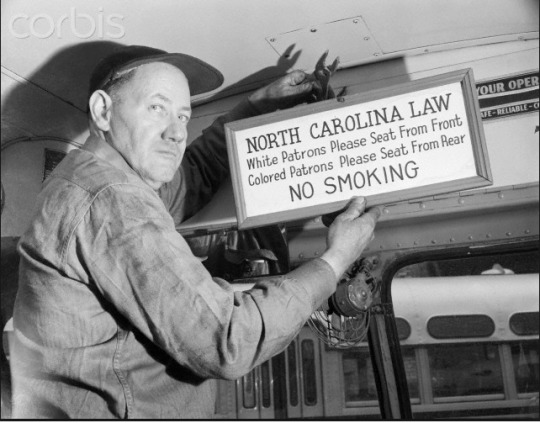
People still alive can remember this sort of thing very well.
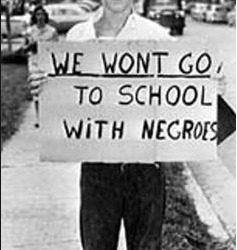
This kid is probably still alive. As are most of his classmates. As are the children with whom he refused to attend school.
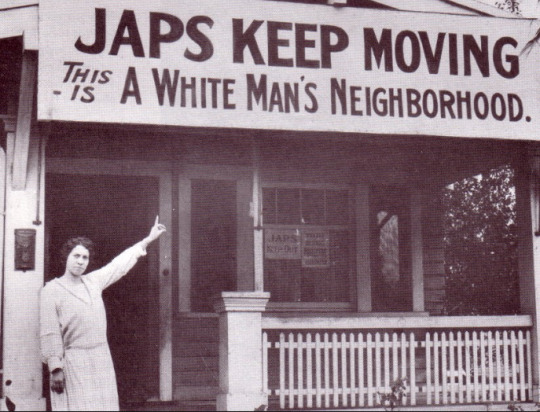
This also happened within living memory.

It's amazing what people consider communism. I mean back then, of course.
Sometimes you’d hear stories about a random injustice or brutality. A policeman who had become a little too enthusiastic. A bad apple, and surely justice was served. If not, it’d have been in the papers You’d hear about it in the papers if it hadn’t been. A gay teen beaten to death in a cornfield. A car with the banner of the struggle to preserve human slavery on the bumper sticker. The KKK marching again, how quaint. Ah, you’d think, if you were like me. We still have some work to do. Cleanup on aisle seven.
Technology has changed that. We see with new eyes now, unless we choose not to. We see videos, dozens and dozens of them now, new ones each week it seems, of police shooting unarmed black people. Again and again and again and again. Can you remember all the names? I can't anymore. And I ask myself: why can't I?
We see the speed with which so many seem willing to seek and find the nearest handy reason the victim deserved his or her fate. We see the news organizations find a Sunday School photo for the shooter and a mugshot to represent the victim. We see acquittal and acquittal and acquittal. We see failure to prosecute.
And, perhaps, we begin to wonder.
We see the people protesting, unarmed, asking only that their lives be thought to matter as much as another’s, and we see the stormtroopers with their massive guns and their tanks, arrayed against a civilian population almost reflexively, like defenses in an organism’s bloodstream mustering against a disease. And we wondered, perhaps: why do they look so much—so exactly, if we’re honest—like an occupying force?

We saw the white ranchers seize government land, pointing their guns directly at law enforcement officials, speaking openly of armed insurrection against the government, of revolution, of war. We saw them, later, seizing a government building. They weren’t protesting after centuries seeing their children and brothers and sisters killed without consequence by authority. Rather, they didn’t want to have to pay a grazing fee. Was it with surprise that we saw it: law enforcement seemed less frightened of these white men and their guns than they had an unarmed black woman in a sundress, or a 12 year old boy playing in a park? Were we surprised to see they seemed so level-headed in this situation, so much less likely to respond with immediate lethal force?
Why, those fellows with their arsenal didn’t even get convicted. They were less threatening to the system, apparently, than a man, arms up, lying on the ground next to his autistic ward begging not to be shot. (He was shot.) We might contrast to the treatment of the protesters at Standing Rock, and wonder…is the Holocaust against native people relegated only to the past? Would we change it, if we could?
We wonder: Are we seeing the system breaking down, unable to cope with new challenges? Or are we seeing a system working exactly as it’s always intended? Do we as a collective of 'white' people secretly want the police to control brown people by force? Are we secretly hoping that force will prove lethal, only occasionally enough to soothe our consciences, but frequently enough to promote an order less immediately costly, than the pain of culpability, than the justice of restitution?
If not, why are prosecutions so rare, and convictions even less so?
If not, why aren’t we protesting these killings? Why aren’t we in the streets?
Do all lives matter? If so, why wouldn’t we act like it?
White Christian America reveres Dr. King, it should be noted. You remember him—the peaceful guy who gave the speech that ended racism. If Facebook and newspaper op eds are any measure, we white Christians can’t stop bringing him up, almost as a cudgel, an admonishment to those today who would dare ask for their own human dignity, for not doing it as antiseptically as we remember it being done by him. And perhaps people begin to wonder: Why was King enshrined as 'the peaceful one' only once he was peacefully dead? Is King’s being safely dead our favorite thing about him? These days, we white Christians can claim to have brought his dream to reality (the white guy is usually the hero of the story in the movie), and Dr. Martin Luther King Jr. will not protest—and we white Christians don’t like protest. Heavens, no—it’s so divisive. Dr. King, he wouldn’t approve of this protest, nor that one, and certainly not that one. His protests were so polite! Why, nobody had any problem with them at all! Dr. King agrees with all of us in white Christian America so much, these days. Oh my, he never stops agreeing with us. Just ask us; we’ll tell you. Yes, and what ever happened to Dr. King, anyway, after he gave that speech that ended all inequality forever?
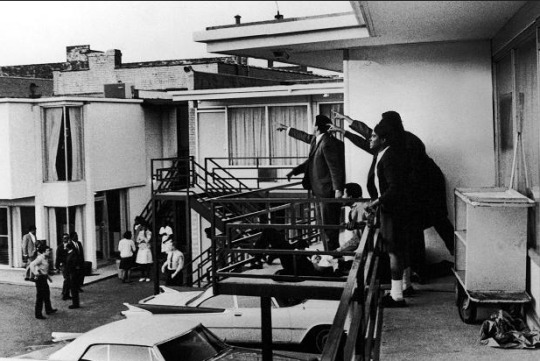
But no matter, I told myself. That’s a dying strain, it's not who we are these days. That’s just a few bad apples. We’ve made so much progress. They’ll exhaust themselves in a final futile sputter. We’re just about to turn the corner. Sure there are racists, bigots, white supremacists, lost-causers, and they're loud, but they're dying out, and they know it. They'll eventually run somebody on an overtly racist platform, and they'll lose huge—I disagree with Republicans, but most of them won't stand for stark white supremacy, surely, and obviously Christians won't be able to align themselves with it — and we’ll show them it’s no use, and they’ll retreat, retrench to even positions even more compromised, less fortified, further back, smaller, diminished. We’re a better country than that.
But then Donald Trump, a half-rate and transparently obvious bullshit artist, a greasy reality TV star most skilled at demonstrating his manifest ignorance, promising mostly the goodness of violence and the strength of vengeance, offering to return America to an earlier time, railing against the inconvenience of practicing sensitivity toward the perspectives of others (he called it 'political correctness'), received 63 million geographically-convenient votes to become the most powerful person in the world. Perhaps, if you’re like me, you took a moment then to ponder that statement about bad apples and what they do to the whole barrel. The meaning of it. And, perhaps, another saying, about recognizing a tree by its fruit. And, it must be said, though we refuse to face it: In America, our trees have long borne a strange fruit.
Here’s what we’ve lost, or at least what I’ve lost: The assumption of goodness’s inevitability. The assumption of goodness of those around me. The assumption of good intent in their hearts. The assumption that the future is still there. The assumption that most of us will die of old age. Here's what I've lost, the one favor Donald Trump may ever do for me: The wool from my eyes. An illusion, particularly a pretty and a convincing one, can be a painful thing to lose.
I’ve gained a vision of tens of millions of people desperate to bend history’s arc back toward an injustice that favored them, and willing to fight for that regression, willing even to risk species-wide extinction rather than suffer the pain of facing the consequences of their own mountainous indifference.
The moral arc of the universe may bend toward justice, but the gears of history grind the weak. There are people now who are giddy, almost with the air of a teenager behind the wheel of a sweet-sixteen hot rod, to test out their perceived new warrant to deliver retributive and violent indifference to the people they deem unlovely. A headscarf yanked off here. A slur shouted in public there. A swastika scrawled on a wall here. A Neo Nazi propagandist advising the President of the United States in the corridors of power there. A crowd of seig heils in a government building, in praise of our new leader here. A few million children stripped of health insurance with no serious attempt at a replacement there.
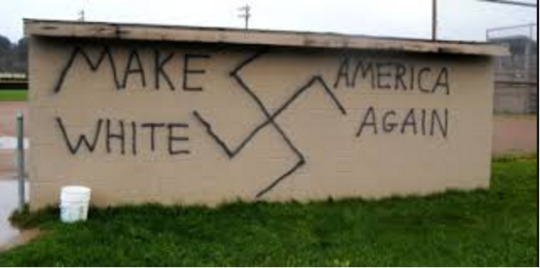
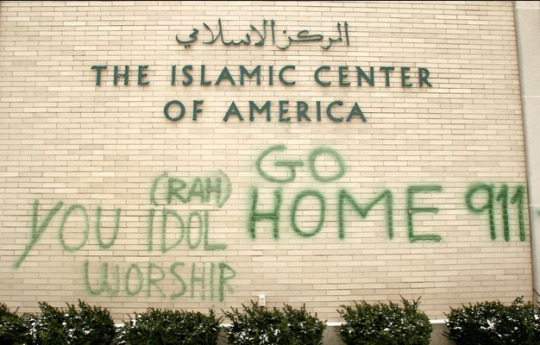
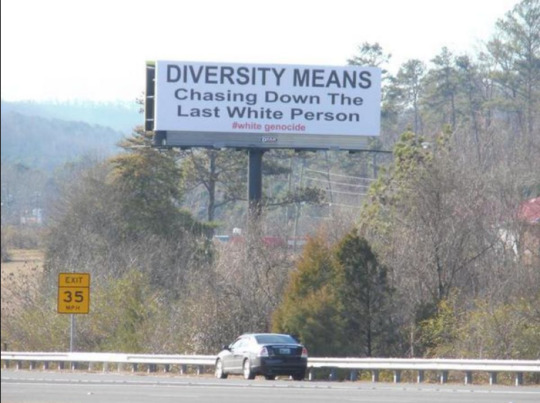


They think this is allowed now. Sixty-three million people, complacently or enthusiastically or ignorantly aligned with white supremacy, gave them the idea it is. It’s going to be our job to show them otherwise. We must show them otherwise. And. Even if you voted for Trump—especially if you voted for Trump—the door is wide open for you to join in that struggle. You show them otherwise, too. All you have to do to join...is join. Your intentions were good? Excellent. I believe you. I've badly misunderstood you? Excellent. I believe you. Now, show it. Show your good intention by your good actions. You, like all of us, possess tremendous moral authority. Don't lend it any longer to those who have promised to squander it on atrocity. They seem intent on doing as they say. If you wait too long, they will leave you with none left to withdraw. Use it to protect those different than you. Use it against your own advantage, for the advantage of those who have none. And. If you, like me, did not vote for Trump, there is the great danger of complicity. You will be offered, if you, like me are white and straight and employed and well-off and cis-gendered and able-bodied and healthy and property-owning, the opportunity to be indifferent. Resist that current.
If the universe bends toward justice, the engine it has chosen for this good work is the hard and sacrificial struggle of good people willing to acknowledge the basic humanity of all other people. People who don’t think profitability is the foundational metric of goodness. People who don't think life holds a value that begins at conception but ends the moment it enters poverty. People bold and willing to become peaceful pebbles in the gears. To give time and money. To link arms with a married gay couple. To take sides in a cafeteria skirmish with a transgendered teen. To take a truncheon in the head for a Muslim. To paraphrase Jesus (another favorite who those of us in white Christian America appear by our words and deeds to consider as safely dead as Dr. King): to live, first you must die.
Or, as another poet says, love’s the only engine of survival.
So, what’s next?
First, we lament. We acknowledge the un-sky, the void. We listen to those who’ve been staring at it far longer than us. We name the challenge with clear eyes. That, I suppose, is what this has been.
And then we get to work. Let us hope our leaders will prove other than than they say they will. Let us not be so naive to think it likely. Let us oppose in a fierce and broken love. Let us meet with friends, we eat good meals with them. Let us consider people before money, and notice where our society fails to do so. Let us make art, and we try to make it well. Let us refuse to allow a comfortable silence to enfold a hateful or ignorant statement. Let us stand up against hate, bodily if necessary. Let us learn our system, and work within it. Let us call our leaders, and advocate for those who suffer. Let us practice generosity without care for the merit of the beneficiary, but only for their need. Let us investigate before we publish. Let us loudly proclaim the humanity others try to diminish. Let loudly proclaim the humanity of those who do not share our values, even as we oppose. Let us never celebrate the suffering of those who oppose us, for they suffer, too. Let us seek to divest ourselves of unearned cultural advantage. Let us enter spaces where our voices are not primary, and listen without thinking to speak. Let us create space to speak, in places where our voices are primary, for those who have had no voice. Let us reject optimism and blind belief. Let us embrace hope. Let us work. Let us work. Let us work. We are a people who have dreamed of the sky. I’d like to see if we can make it real.
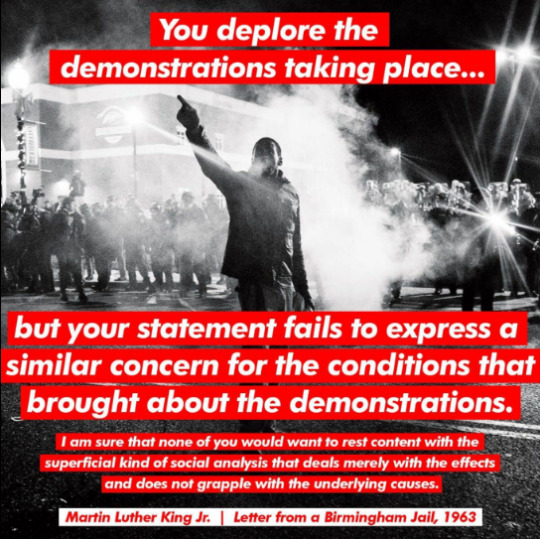

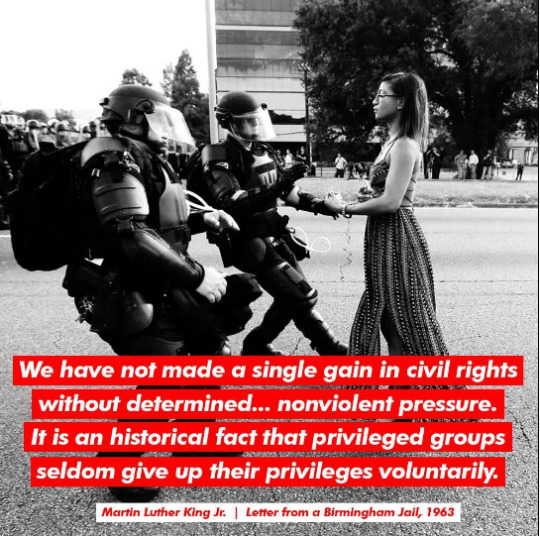
source: http://www.armoxon.com/2017/01/sky.html (January 16, 2017)
VOTE
26 notes
·
View notes
Link
Describing Dashiell Hammett’s noir detective character The Continental Op, literary critic Steven Marcus inadvertently captures the reactionary. Both detective and reactionary emerge from profoundly disordered societies. Their gut tells them something is amiss, that their circumstances are fundamentally unsatisfying. Each finds himself waking up to a world of falsehoods, where natural inclinations are everywhere subverted, where human flourishing is derailed or destroyed, and where truth is buried under mounds of error. With little to nothing left to ‘conserve’, the reactionary becomes a deconstructionist, a detective, stripping away contemporary liberalism’s false legitimations.
There are several branches of reactionary thought, but most if not all share at the core an antipathy for the money-power, a sacral understanding of culture, affinity for hierarchy, and some degree of hero-worship. These threads persist regardless of any particular riffs or permutations. The reactionary, through churchism, nationalism, vitalism, traditionalism, or some combination thereof, struggles against liberal nihilism, the deracination of romantic visions and immaterial goods. In short, reaction rejects the myth of Progress.
…
Modern decadence rarely takes the form of lavish balls or orgiastic retreats. Instead, it is characterized by exhaustion, the desocialization of pleasure and thrill, anhedonia. Late cartographer of capitalism Mark Fisher describes the latter vividly as “the soft narcosis, the simstim eternity, the comfort food oblivion of Playstation, all-night TV and marijuana.” All forms of fulfillment eternally forestalled by gluttony, onanism, and the general inability to disconnect from our ever-present digital dopamine drip. Contemporary reaction, then, often originates as a backlash against passivity, consumerism, sterility, physical weakness, and all the other rotten fruits of disenchantment.
…
While it is no doubt true that many past eras surpassed our own in virtue, beauty, and spirituality, it is impossible to return to the same set of social, economic, and technological conditions that shaped the past. A Bushism summarizes the issue well: “I think we can agree, the past is over.” The challenge, then, is to fashion a society out of postmodern clay, in which natural virtues again flourish. The reactionary mind must attune itself to the particular ailments, conditions, and advantages of postmodernity.
…
Until very recently, this was an apt description of the Western world. But as liberalism works itself pure and intersectionality marches through the institutions, it also reintroduces the West to metanarrative. From the Enlightenment’s murder of myth, through to the Enlightenment’s death, we have arrived again at an era of myth. As the United States continues its transformation into an ideological state premised on gender gnosticism, anti-whiteness, and anti-nationalism, liberalism’s hyper-moralism becomes clearer.
Today, the West is returning to the political as such, to a state of polemos, the social warfare that punishes, purges, and partitions. Yet the regime’s tendency toward anarcho-tyranny, as well as postmodernity’s general liquidity and chaos, lends extra potency to reaction’s promises of order, beauty, and the sacrosanct. These developments are a great boon to reaction. Politicization is a preferable outcome for the reactionary, and one step closer to the outright conflict necessary to effect social rejuvenation.
…
With normalcy demonized at every turn, the West finds itself in another Prohibition era. The person who honors his ancestors, obeys God, and admires traditional mores participates in “collaborative illegality.” Societies of illegality, where day-to-day life becomes a radical state of affairs, are fertile ground for reaction. Confrontation is everywhere preferable to obfuscation. If, as detectives, reactionaries are emergent byproducts of decline, then we should expect them to proliferate as decline accelerates and the spirit of polemos enlarges.
…
The scuttled America First Caucus recently proclaimed America as “a nation with a border, and a culture, strengthened by a common respect for uniquely Anglo-Saxon political traditions,” and decried mass migrations disruption and disintegration. The media backlash to the term ‘Ango-Saxon’ was both predictable and educational. America, as it was perceived by the Founders and most subsequent generations, no longer exists.
The Confederates are clarifying here. If we considered the United States as an Anglo-Saxon civilization, which incorporated other ethnic groups into this civilizational fabric, the Civil War was a tragic conflict between kin. If being American means identifying with a vacuous, chimeric liberalism, then the Civil War was an existential battle between the supposedly chthonic horror of racism and the ever-perfected march of reason. This is exactly how the ruling elite perceives the United States: a polity on an ideological mission to liberate the world, whatever form that liberation may take in each succeeding generation. America’s refusal or inability to recover a moderate and reasonable ethnos is nothing less than suicidal. If immigration continues and there is no American identity aside from vapid cosmopolitanism, the money-power will continue its disintegration and rulership over the United States.
A bleak portrait, perhaps. But so is a crime only halfway solved. As a detective continues his investigation, to be called on amid a crumbling society of illegality, so does the reactionary continue forward. He is often the fortunate benefactor of Providence, that sublime knife which eternally slips loose Gordian knots. The Gracchi brothers’ assassinations by the optimates and their mob paved the way for Caesar; Jacobin excess unwittingly opened Fontainebleau’s doors to Napoleon, and Europe’s midcentury dirge kept Iberia under reactionary rule until the third Christian millennium. If Buchanan began transforming American conservatives into reactionaries, and Trump made reaction politically viable — if even for a moment — we can reasonably hope reaction will maintain its historical relationship with decline, and be nourished by decay.
…
With that and all the above in mind, we may sketch a vision for an Occident shaped by reaction. As with reaction generally, it will be a romantic vision. After liberalism’s society of illegality inevitably buckles under its own weight, the regime’s simultaneous reaction emerges triumphant. The inevitable degeneration of republics into oligarchies reaches its climax: the ‘one and the many’, king and peasantry, president and people, triumph over ‘the few’, optimates, oligarchs, regime Brahmans, and the like. Porous borders are shut, capital is disciplined and reordered to serve national rather than global, financial interests. Liberalism’s atomization buffet is shut down for good, the policies and laws that annihilated the family are overturned, gender is reembodied, and voluntary infertility is a dwindling artifact, a bygone object of derision. The past, which Fisher calls “forever lost and forever insistent,” is insisted upon, and revitalized through new modes of government, old sacraments, and the erection of monuments that honor the past and promise the future.
If this sounds fanciful, it’s because it is. No clarion call to ‘build’ can make the path any straighter or the course any clearer. What reactionaries may take solace in, however, is the organic nature of human societies, the predictable decline and rejuvenation of civilization as superorganism, history’s countless overthrows and about-faces. When it happens, it will seem as if it couldn’t have happened any other way. Georges Sorel speaks to this through Vincent Garton’s translation, prophesying: “We would very much need a Mongol conquest to effect the rebirth of great art, today enslaved to the barbarian tastes of the plutocracy.” Accordingly, only terminal decline produces successful reaction.
A reactionary West will emerge from the same organic historical process that has carried reaction to power again and again: the Hamiltonian battle between, on one side, ‘the one and the many’, and on the other, ‘the few’, from revitalized conceptions of ethnos, thymos, and telos. In the vain hope of identifying and reestablishing a timeless and just social order, the Western Man today must dig through refuse and rubble and investigate the gleaming scraps and trinkets he finds underneath. He must do as the noir detective does — live within and struggle against the society of illegality, case by case, until there are no more crimes to be solved, no deconstruction and reconstruction to be undertaken. He must exist as something ‘natural’, beyond reason and beneath society, so that when the time comes, when Providence cuts the Gordian knot, he will be ready to lend his labor to monuments that honor the West’s past and promise its future.
4 notes
·
View notes
Note
Hello, sorry if this is annoying but can you explain how Himiko is neurodivirgent, I don't mean to come off as rude or anything, I just don't know much about the topic and am curious? Sorry to cause any trouble.
It’s absolutely not any trouble!! I love talking about how Himiko shows signs of being neurodivergent. It hits close to home specifically since not only is she one of my favorite characters, but I relate to her a lot. Okay, this might be a bit long, so sorry about that lol:
So in case you don’t know exactly what it is, neurodiversity is when mentally your brain is wired differently than normal, or “neurotypical”, peoples brains. Especially with considerably easy functions like socialising, thinking, learning, developing or ageing, and many others. Many disorders can fall under the neurodiversity spectrum. ADHD, BPD, autism spectrum disorder, bipolar disorder, schizophrenia, dyslexia, and many others.
Personally, I think Himiko would fall into the category of being autistic, which has a lot going into it, but can be summed up as a developmental disorder that involves delays in communication, thinking, social situations, and basic human understanding.
Though there is a thread on Twitter that does a good job covering certain criterias that I won’t end up covering (her lack of understanding of social cues, development delays, the reason why she’s depressed, etc.) and it’s really good!!
Below, I’ll list the traits that, in my opinion, Himiko possesses that are common in ND people. Not all of them will be listed, just the bigger ones:
Talking in a slow, almost “emotionless” way
Himiko talks a certain way throughout the whole of the game, rarely ever changing even when she’s expressing very strong emotions. From the very first line she speaks, Himiko talks about something exciting to her, but still sounds very flat and unenthused. Most ND people will always speak in the same tone of voice no matter what. Sometimes, it's very flat and monotone, like Himikos. Sometimes they'll speak slowly either to gather together what they want to say next, or that's just how they were wired to speak. (Almost exactly like Jataro from DR:AE who speaks in a similar way. Who also has a few neurodivergent traits. But that's just a theory c:)
Childish behavior
This usually ranges, but Himiko has a few traits that neurodivergent people have that others consider “too childish”. She’s extremely naive in how she perceives the world, people around her, and their intentions with interacting with her. Like when Kaito asked her to bring her a crossbow of all things and it takes little for her to be convinced to assist him. Or when Kokichi makes fun of her, and she doesn't always gets it. She's sometimes able to understand, but mostly she doesn't understand that he's just taking advantage of her innocence to treat her how he does with others. She takes things everyone says at face value and believes them easily. Her peers consider her to be a bit slow in many areas, almost in a childlike way. She almost has a child-level understanding of vocabulary (i.e. pronounces words the way children do like how the way she says magic almost sounds like “myagic”, her vocabulary is pretty limited, and she usually starts using certain words that she hears others use). When having her Master brought up with the possibility that he left her selfishly and that she was better than him, she always denies it, keeping an innocent mentality so she won’t feel too bad. After being motivated to move forward, she’s seen a lot to want to be helpful to the group and do something useful, and in return they, in my opinion, view that behavior how older people view a child wanting to be helpful to them. The thread above goes more into detail (her bathroom issues, having a unique way of remembering and referring to objects), but these are only some of the examples for Himiko's maturity.
Being a “gifted child” when she was young
This is entirely my speculation since this is never addressed in canon, but Himiko strikes me as a former “gifted child” which most NDs go through. Her “gift” was discovered at a young age and she was really skilled at it. She was known for it by huge masses of people and praised for it. She even had to save the person who saw the talent in her and taught her everything she knows about it when he made a mistake. She gets invited to all types of events because of it. Lot’s of ND kids who were thought of as “gifted'' may have gone through the same thing. It would also explain why she’s so depressed and unmotivated through most of the game, as a result of what’s called “gifted child syndrome”. Having so much praise and expectations set on her so young. Getting older and not having the same energy for it as you had before. Technically all the DR kids are former gifted children, since they're the product of a company exploiting their "gifts", which is a factor in how the world ended in the way it was. But Himiko has more, you could say "traditional" symptoms and after-effects of growing up as a gifted child (depressed, lack of motivation, lack of motivation in her subject, etc.).
Being viewed as lazy
Even though she takes what she's passionate about seriously, less than when she was younger or not, Himiko doesn't always take action with magic, and even everyday tasks. ND people usually lack any sort of drive, sometimes having an “I’ll come back to it later” mentality, excited about it or not. Himiko lacks any drive and motivation throughout the game, even at the idea of being killed, or put in the line of suspicion for someone's killer. She’ll always make excuses on why she can’t act on things, the most common being “she doesn’t have enough MP”. Which goes back to her talent as a magician, which she is especially sluggish in.
Bottling in her emotions and not wanting them to show. But when she does, it results in an on-going meltdown
We all saw it in its prime during the end of the third trial after all, right? Himiko was sort of always closed in, but it wasn't extreme since she hadn't hit her lowest yet. When she did though, (being the prime suspect of Ryoma dying, her closest friends Tenko and Angie dying, being one of the suspects of one of their murders, etc.) She still attempted to hold it all in, which ND people do for a variety of reasons (not knowing how to process extreme emotions, not wanting too much attention by expressing them, or choosing unhealthy ways to process your feelings, amongst others). But once Kokichi called her out for the second time? Not only was everything practically gushing out of her face, but she literally passed out from crying for so long. I don't know whether to laugh or cry at that myself, ha.
The same thing happened in the last trial kind of. Once the truth of the killing game and their identities is revealed, she seems to have a meltdown. It could be from the overwhelmingness of the situation. It could be the amount of "change" of the situation, which she doesn't even remember. It could also be overstimulating tones with the change in environment, the info dumping, and how everyone jumped from topic to topic etc. Meltdowns are normal for ND people, especially since they usually hold in their feelings. Himiko got better at expressing herself, but meltdowns will still happen once something overwhelming occurs (it's a great way to let out steam!!)
Stimming
Stimming is when someone, ND or not, self-stimulates themselves by repeatedly moving in some way either by speaking, moving either themselves or something else, or watching someone else do it. Most of the time, you can see Himiko fidgeting with her fingers or with her hat. Doing something with her hands, which is a form of stimming
Despite that, Himiko most noticeably stims by speaking, as she sometimes repeats stuff others say, sometimes repeats a word in order to comfort herself and her beliefs (saying “it’s magic” over and over, either in retaliation or in general), and has a go-to word that she’ll always use almost every sentence when she doesn’t know what to say, is caught off guard/by surprise, or just when she starts and ends her sentences (y’know like, “nyeh”?).
“Odd” facial features/expressions
This one presents itself a lot in the game and through her design as well. Her lip stays tucked out all the time, her eyes don’t always stay open, and her face often keeps the same expression (tired and kind of bored). Just like when she speaks, even when she's expressing intense emotions, she'll keep a mellow expression. She lifts her hat into the air and not much changes expression-wise. She'll be accusatory to someone and not much changes expression-wise. To certain people she interacts with, they think her face is "weird" since it'll pull in ways it usually doesn't for NT people. It could be because she's trying to force the look on herself so it's more easier for people to read (which is shown to be the case for most people), but it's also possible that it's just how she looks. Since she's older, she has more freedom to make more strategies to have more natural expressions, but it's still off-putting to some of her peers.
The infamous saying, “she comes off as annoying”
Many people know this one well, and Himiko is no different, especially in the earlier chapters. Almost everything stated above is a factor that plays in people's disdain for Himiko, in the game and the fandom. Characters like Shuichi, Kaede, Tenko, and even Angie are one of the only few people who try to understand and adjust to Himiko's behavior in their own method, while everyone else either ignores her, doesn’t take her seriously, or even end up bullying her because of it, not willing to adjust themselves for her specific brand of behavior. Being an obvious target, coming off as weird, being too blunt and coming off as rude (which even caused her having strained relationships with K1-B0, Miu, etc.), sometimes hyperfixating too hard on magic (her “special interest”), all seem to be a reason for people thinking she’s too high maintenance.
,,,this ask sure is a month old isn’t it? retrdfyugihhuyt I am EXTREMELY sorry I answered this so late, but I haven’t been online lately because of moving, but at least I managed to finish this in less than a day lol. It’s long, but I love Himiko, and love all the quirks that make her who she is, and am happy to explain it to others!! I hope this answered your questions either way (ノ◕ヮ◕)ノ*:・゚✧
#side blog asks n answers#danganronpa#danganronpa v3#ndrv3#danganronpa killing harmony#new danganronpa v3#himiko yumeno#danganronpa discourse#GOD i practically just excreted infodump all over this post#hopefully this clear essay which i was clearly excited to write which i clearly wrote in a day is coherent
13 notes
·
View notes
Text

“Concentration camps were not invented in Germany,” Hitler said in 1941. “It is the English who are their inventors, using this institution to gradually break the backs of other nations.” The British had operated camps in South Africa, the Nazis pointed out. Party propagandists similarly highlighted the sufferings of Native Americans and Stalin’s slaughter in the Soviet Union. In 1943, Goebbels triumphantly broadcast news of the Katyn Forest massacre, in the course of which the Soviet secret police killed more than twenty thousand Poles. (Goebbels wanted to show footage of the mass graves, but generals overruled him.) Nazi sympathizers carry on this project today, alternately denying the Holocaust and explaining it away.
The magnitude of the abomination almost forbids that it be mentioned in the same breath as any other horror. Yet the Holocaust has unavoidable international dimensions—lines of influence, circles of complicity, moments of congruence. Hitler’s “scientific anti-Semitism,” as he called it, echoed the French racial theorist Arthur de Gobineau and anti-Semitic intellectuals who normalized venomous language during the Dreyfus Affair. The British Empire was Hitler’s ideal image of a master race in dominant repose. “The Protocols of the Elders of Zion,” a Russian forgery from around 1900, fuelled the Nazis’ paranoia. The Armenian genocide of 1915-16 encouraged the belief that the world community would care little about the fate of the Jews. Just before the outbreak of the Second World War, Hitler spoke of the planned mass murder of Poles and asked, “Who, after all, is today speaking about the destruction of the Armenians?” The Nazis found collaborators in almost every country that they invaded. In one Lithuanian town, a crowd cheered while a local man clubbed dozens of Jewish people to death. He then stood atop the corpses and played the Lithuanian anthem on an accordion. German soldiers looked on, taking photographs.
How American Racism Influenced Hitler
The mass killings by Stalin and Hitler existed in an almost symbiotic relationship, the one giving license to the other, in remorseless cycles of revenge. Large-scale deportations of Jews from the countries of the Third Reich followed upon Stalin’s deportation of the Volga Germans. Reinhard Heydrich, one of the chief planners of the Holocaust, thought that, once the Soviet Union had been defeated, the Jews of Europe could be left to die in the Gulag. The most dangerous claim made by right-wing historians during the Historikerstreit was that Nazi terror was a response to Bolshevik terror, and was therefore to some degree excusable. One can, however, keep the entire monstrous landscape in view without minimizing the culpability of perpetrators on either side. This was the achievement of Timothy Snyder’s profoundly disturbing 2010 book, “Bloodlands,” which seems to fix cameras in spots across Eastern Europe, recording wave upon wave of slaughter.
As for Hitler and America, the issue goes beyond such obvious suspects as Henry Ford and Charles Lindbergh. Whitman’s “Hitler’s American Model,” with its comparative analysis of American and Nazi race law, joins such previous studies as Carroll Kakel’s “The American West and the Nazi East,” a side-by-side discussion of Manifest Destiny and Lebensraum; and Stefan Kühl’s “The Nazi Connection,” which describes the impact of the American eugenics movement on Nazi thinking. This literature is provocative in tone and, at times, tendentious, but it engages in a necessary act of self-examination, of a kind that modern Germany has exemplified.
The Nazis were not wrong to cite American precedents. Enslavement of African-Americans was written into the U.S. Constitution. Thomas Jefferson spoke of the need to “eliminate” or “extirpate” Native Americans. In 1856, an Oregonian settler wrote, “Extermination, however unchristianlike it may appear, seems to be the only resort left for the protection of life and property.” General Philip Sheridan spoke of “annihilation, obliteration, and complete destruction.” To be sure, others promoted more peaceful—albeit still repressive—policies. The historian Edward B. Westermann, in “Hitler’s Ostkrieg and the Indian Wars” (Oklahoma), concludes that, because federal policy never officially mandated the “physical annihilation of the Native populations on racial grounds or characteristics,” this was not a genocide on the order of the Shoah. The fact remains that between 1500 and 1900 the Native population of U.S. territories dropped from many millions to around two hundred thousand.
America’s knack for maintaining an air of robust innocence in the wake of mass death struck Hitler as an example to be emulated. He made frequent mention of the American West in the early months of the Soviet invasion. The Volga would be “our Mississippi,” he said. “Europe—and not America—will be the land of unlimited possibilities.” Poland, Belarus, and Ukraine would be populated by pioneer farmer-soldier families. Autobahns would cut through fields of grain. The present occupants of those lands—tens of millions of them—would be starved to death. At the same time, and with no sense of contradiction, the Nazis partook of a long-standing German romanticization of Native Americans. One of Goebbels’s less propitious schemes was to confer honorary Aryan status on Native American tribes, in the hope that they would rise up against their oppressors.
Jim Crow laws in the American South served as a precedent in a stricter legal sense. Scholars have long been aware that Hitler’s regime expressed admiration for American race law, but they have tended to see this as a public-relations strategy—an “everybody does it” justification for Nazi policies. Whitman, however, points out that if these comparisons had been intended solely for a foreign audience they would not have been buried in hefty tomes in Fraktur type. “Race Law in the United States,” a 1936 study by the German lawyer Heinrich Krieger, attempts to sort out inconsistencies in the legal status of nonwhite Americans. Krieger concludes that the entire apparatus is hopelessly opaque, concealing racist aims behind contorted justifications. Why not simply say what one means? This was a major difference between American and German racism.
American eugenicists made no secret of their racist objectives, and their views were prevalent enough that F. Scott Fitzgerald featured them in “The Great Gatsby.” (The cloddish Tom Buchanan, having evidently read Lothrop Stoddard’s 1920 tract “The Rising Tide of Color Against White World-Supremacy,” says, “The idea is if we don’t look out the white race will be—will be utterly submerged.”) California’s sterilization program directly inspired the Nazi sterilization law of 1934. There are also sinister, if mostly coincidental, similarities between American and German technologies of death. In 1924, the first execution by gas chamber took place, in Nevada. In a history of the American gas chamber, Scott Christianson states that the fumigating agent Zyklon-B, which was licensed to American Cyanamid by the German company I. G. Farben, was considered as a lethal agent but found to be impractical. Zyklon-B was, however, used to disinfect immigrants as they crossed the border at El Paso—a practice that did not go unnoticed by Gerhard Peters, the chemist who supplied a modified version of Zyklon-B to Auschwitz. Later, American gas chambers were outfitted with a chute down which poison pellets were dropped. Earl Liston, the inventor of the device, explained, “Pulling a lever to kill a man is hard work. Pouring acid down a tube is easier on the nerves, more like watering flowers.” Much the same method was introduced at Auschwitz, to relieve stress on S.S. guards.
When Hitler praised American restrictions on naturalization, he had in mind the Immigration Act of 1924, which imposed national quotas and barred most Asian people altogether. For Nazi observers, this was evidence that America was evolving in the right direction, despite its specious rhetoric about equality. The Immigration Act, too, played a facilitating role in the Holocaust, because the quotas prevented thousands of Jews, including Anne Frank and her family, from reaching America. In 1938, President Roosevelt called for an international conference on the plight of European refugees; this was held in Évian-les-Bains, France, but no substantive change resulted. The German Foreign Office, in a sardonic reply, found it “astounding” that other countries would decry Germany’s treatment of Jews and then decline to admit them.
Hundreds of thousands of Americans died fighting Nazi Germany. Still, bigotry toward Jews persisted, even toward Holocaust survivors. General George Patton criticized do-gooders who “believe that the Displaced person is a human being, which he is not, and this applies particularly to the Jews who are lower than animals.” Leading Nazi scientists had it better. Brian Crim’s “Our Germans: Project Paperclip and the National Security State” (Johns Hopkins) reviews the shady history of Wernher von Braun and his colleagues from the V-2 program. When Braun was captured, in 1945, he realized that the Soviets would become the next archenemy of the American military-industrial complex, and cannily promoted the idea of a high-tech weapons program to ward off the Bolshevik menace. He was able to reconstitute most of his operation Stateside, minus the slave labor. Records were airbrushed; de-Nazification procedures were bypassed (they were considered “demoralizing”); immigration was expedited. J. Edgar Hoover became concerned that Jewish obstructionists in the State Department were asking too many questions about the scientists’ backgrounds. Senator Styles Bridges proposed that the State Department needed a “first-class cyanide fumigating job.”
These chilling points of contact are little more than footnotes to the history of Nazism. But they tell us rather more about modern America. Like a colored dye coursing through the bloodstream, they expose vulnerabilities in the national consciousness. The spread of white-supremacist propaganda on the Internet is the latest chapter. As Zeynep Tufekci recently observed, in the Times, YouTube is a superb vehicle for the circulation of such content, its algorithms guiding users toward ever more inflammatory material. She writes, “Given its billion or so users, YouTube may be one of the most powerful radicalizing instruments of the 21st century.” When I did a search for “Hitler” on YouTube the other day, I was first shown a video labelled “Best Hitler Documentary in color!”—the British production “Hitler in Color.” A pro-Hitler remark was featured atop the comments, and soon, thanks to Autoplay, I was viewing contributions from such users as CelticAngloPress and SoldatdesReiches.
In 1990, Vanity Fair reported that Donald Trump once kept a book of Hitler’s speeches by his bed. When Trump was asked about it, he said, “If I had these speeches, and I am not saying that I do, I would never read them.” Since Trump entered politics, he has repeatedly been compared to Hitler, not least by neo-Nazis. Although some resemblances can be found—at times, Trump appears to be emulating Hitler’s strategy of cultivating rivalries among those under him, and his rallies are cathartic rituals of racism, xenophobia, and self-regard—the differences are obvious and stark. For one thing, Hitler had more discipline. What is worth pondering is how a demagogue of Hitler’s malign skill might more effectively exploit flaws in American democracy. He would certainly have at his disposal craven right-wing politicians who are worthy heirs to Hindenburg, Brüning, Papen, and Schleicher. He would also have millions of citizens who acquiesce in inconceivably potent networks of corporate surveillance and control.
The artist-politician of the future will not bask in the antique aura of Wagner and Nietzsche. He is more likely to take inspiration from the newly minted myths of popular culture. The archetype of the ordinary kid who discovers that he has extraordinary powers is a familiar one from comic books and superhero movies, which play on the adolescent feeling that something is profoundly wrong with the world and that a magic weapon might banish the spell. With one stroke, the inconspicuous outsider assumes a position of supremacy, on a battlefield of pure good against pure evil. For most people, such stories remain fantasy, a means of embellishing everyday life. One day, though, a ruthless dreamer, a loner who has a “vague notion of being reserved for something else,” may attempt to turn metaphor into reality. He might be out there now, cloaked by the blue light of a computer screen, ready, waiting.
4 notes
·
View notes
Text
The Forgotten Ones were some of the Rebel Elvhen [theory]
There is very little known about The Forgotten Ones, referenced in so few of the codex entries throughout Dragon Age, however, from what is offered to us, I believe them to be Elvhen who opposed the tyranny of the Evanuris, likely freed from their enslavement by Solas, and since raged and warred against them. They were perhaps the favoured slaves, the most talented of them, to have been considered as gods as well upon facing against their enemies. This is just a theory that I’ve been playing around with, a post of rambling, but I figured I’d share my thoughts on what little we have of them.
“The Forgotten Ones belong to the ancient Elven pantheon, but their names were lost after the Great Betrayal. Their worship continued in the shadows, despite efforts to stamp it out in the old Dalish kingdom. This staff belonged to a priest of those gods, specifically Daern'thal.” - Codex attached to the Weapon Pyre of the Forgotten.
“The legend says that before the fall of Arlathan, the gods we know and revere fought an endless war with others of their kind. There is not a hahren among us who remembers these others: Only in dreams do we hear whispered the names of Geldauran and Daern'thal and Anaris, for they are the Forgotten Ones, the gods of terror and malice, spite and pestilence. In ancient times, only Fen'Harel could walk without fear among both our gods and the Forgotten Ones, for although he is kin to the gods of the People, the Forgotten Ones knew of his cunning ways, and saw him as one of their own.” - Codex: Fen'Harel: The Dread Wolf
So, the Forgotten Ones were of Elvhen kind, if this codex entry is to be believed, that they were the ones who resisted the enslavement of the People? Some were likely freed and joined the cause? Their names, or what they represent also seems important, because unlike the Evanuris, they are named rather abstractly as representing feelings, emotions or other such general (often negative) terms, such as pestilence. In the same way that Abelas means sorrow, I feel their names were adopted dependant on their ruling pantheon, or what they represented. That these were people, rather than abstract ideas. This is similar to how the Protheans were named in Mass Effect, when we meet the last living Prothean Javik, and wake him up to find he embodies or is named for vengeance.
“There is precious little we know about Fen'Harel, for they say he did not care for our people. Elgar'nan and Mythal created the world as we know it, Andruil taught us the Ways of the Hunter, Sylaise and June gave us fire and crafting, but Fen'Harel kept to himself and plotted the betrayal of all the gods. And after the destruction of Arlathan, when the gods could no longer hear our prayers, it is said that Fen'Harel spent centuries in a far corner of the earth, giggling madly and hugging himself in glee.In ancient times, only Fen'Harel could walk without fear among both our gods and the Forgotten Ones, for although he is kin to the gods of the People, the Forgotten Ones knew of his cunning ways and saw him as one of their own. And that is how Fen'Harel tricked them. Our gods saw him as a brother, and they trusted him when he said that they must keep to the heavens while he arranged a truce. And the Forgotten Ones trusted him also when he said he would arrange for the defeat of our gods, if only the Forgotten Ones would return to the abyss for a time. They trusted Fen'Harel, and they were all of them betrayed. And Fen’Harel sealed them away so they could never again walk among the People.” —From Codex entry: Fen'Harel: The Dread Wolf
It’s also very clear that the Forgotten Ones have been smeared throughout history to appear as negatively as possible. Quite like how Fen’Harel has been misunderstood as a malevolent god, rather than the god of rebellion, which is far more accurate an interpretation. In the above codex entry it makes the Forgotten Ones and Fen’Harel appear as the villains, whereas post-Trespasser we know this is not the case -- and so the situation can be turned on it’s head in that the Forgotten Ones were not the wicked anti-pantheon, but warring against and resisting their wicked gods, the Evanuris. It’s also important to note that from the codex entries, Fen’Harel tricked only the Evanuris, and got the Forgotten Ones to return to the abyss (likely for protection) as he defeated the gods -- which was what the Forgotten Ones desired. It’s also likely Solas chose to do this only after the murder of Mythal.
As for the abyss -- and where the Forgotten Ones are -- I feel as though they are in Uthenera, likely returned to the mines within Titans. In Trespasser we see that ancient mines are discovered to have protecting statues of both Mythal and Fen’Harel guarding. We know that Mythal was the most motherly towards the People -- compared to the likes of Andruil and Falon’Din, and their statues and iconography surrounding these locations was not only completely unexpected and out-of-place, but as though those mines had been re-purposed for protection or safety for the People. The undiscovered location within the Titan in The Descent DLC is known as the Uncharted Abyss.
Quick note on the Abyss: “Here lies the abyss, the well of all souls.
From these emerald waters doth life begin anew.
Come to me, child, and I shall embrace you.
In my arms lies Eternity”.—Canticle of Andraste, 14:11 This fragment is where Andraste goes to speak to the Maker for the first time and convinces him to forgive mankind. It describes a beautiful temple deep under the earth surrounded by emerald waters. In which we find a sea called The Buried Sea within the Titan in The Descent. Though I feel like the Forgotten Ones aren’t in that particular Titan, they may be in a fallen Titan hidden away and in Uthenera, a death sleep within the mines Solas asked them to briefly return to. Which is also similar to how the Protheans in Mass Effect were stored, only in cryo stasis. I do feel as though Solas did not intend to leave them this way, but his battle with the gods left him unable to return to them once it was done. What with the Veil stripping the realm of its natural state and all of its magic. We also know that the Evanuris did not like to linger within the Titans. Andruil, for example, would hunt (likely dwarves and creatures) within the Titans, and also the Forgotten Ones, but returned more and more lyrium addled. “One day Andruil grew tired of hunting mortal men and beasts. She began stalking The Forgotten Ones, wicked things that thrive in the abyss. Yet even a god should not linger there, and each time she entered the Void, Andruil suffered longer and longer periods of madness after returning. Andruil put on armor made of the Void, and all forgot her true face. She made weapons of darkness, and plague ate her lands. She howled things meant to be forgotten, and the other gods became fearful Andruil would hunt them in turn. So Mythal spread rumors of a monstrous creature and took the form of a great serpent, waiting for Andruil at the base of a mountain. When Andruil came, Mythal sprang on the hunter. They fought for three day and nights, Andruil slashing deep gouges in the serpent's hide. But Mythal's magic sapped Andruil's strength, and stole her knowledge of how to find the Void. After this, the great hunter could never make her way back to the abyss, and peace returned.”—Translated from ancient elven found in the Arbor Wilds It’s also worth noting, that when the time came when the Forgotten Ones needed a place that was safe and to hide, Mythal had removed the location from Andruil’s memories.
Other such information on the Forgotten Ones that strengthens the idea for me that they were never gods, nor malicious, but rather the opposing forces of the People against the Evanuris:
“The script is an ancient elven dialect. Upon further observation, it twists, the words becoming visible: There are no gods. There is only the subject and the object, the actor and the acted upon. Those with will to earn dominance over others gain title not by nature but by deed. I am Geldauran, and I refuse those who would exert will upon me. Let Andruil's bow crack, let June's fire grow cold. Let them build temples and lure the faithful with promises. Their pride will consume them, and I, forgotten, will claim power of my own, apart from them until I strike in mastery.” -- Codex entry: Geldauran's Claim
A Forgotten One enforcing the idea that there were no gods, but rather extremely powerful people whom ensnared and enslaved the rest. That the Forgotten Ones themselves should not be viewed as a pantheon either, but rather a powerful opposing force in their own right.
"In the story, Fen'Harel was captured by the hunting goddess, Andruil. He had angered her by hunting the halla without her blessing, and she tied him to a tree and declared that he would have to serve in her bed for a year and a day to pay her back. But as she made camp that night, the dark god Anaris found them, and Anaris swore that he would kill Fen'Harel for crimes against the Forgotten Ones. Andruil and Anaris decided that they would duel for the right to claim Fen'Harel. He called out to Anaris during the fight and told him of a flaw in Andruil's armor just above the hip, and Anaris stabbed Andruil in the side, and she fell. Then Fen'Harel told Anaris that he owed the Dread Wolf for the victory and ought to get his freedom. Anaris was so affronted by Fen'Harel's audacity that he turned and shouted insults at the prisoner, and so he did not see Andruil, injured but alive, rise behind him and attack with her great bow. Anaris fell with a golden arrow in his back, badly injured, and while both gods slumbered to heal their wounds, Fen'Harel chewed through his ropes and escaped." --Felassan, to Briala
Note: This is a story being told within the book and should be regarded as such, a tale including myth rather than entirely fact -- however, it is also important in understanding the Forgotten Ones lived amongst the Evanuris, and were also powerful. This is also likely referencing to Fen’Harel’s relationship with the People prior to the Evanuris’ plot to kill Mythal.
“The carvings tell the story of the Betrayal. The Dread Wolf tricking all the gods away from the world. Long ago, there were two clans of gods. The Creators looked after the People. The Forgotten Ones preyed upon us. And one god who was neither. Fen'Harel, the Dread Wolf. He was kin to the Creators, and in the old days, often helped them in their endless war against the Forgotten Ones. We barely even remember all their names, let alone who struck the first blow, who was wrong… Fen'Harel was clever. He could walk among both clans of gods without fear, and both believed he was one of them. He went to each side, and told them the other had forged a terrible weapon, a blade that would end the war. He told the Creators it was forged in the heavens, and the Forgotten Ones, that it was hidden in the abyss. And when the gods went seeking it, he sealed them both in their realms forever. Now he alone is left in the world.” --Merrill to Hawke during Memento of the Dalish
Again, this is a perfect example of the tale having been turned on its head throughout history. That the Evanuris are believed to be the innocent party and that it was the Forgotten Ones who were wicked. Come Trespasser we discover it was the Evanuris who were in fact malicious and cruel and enslaved their People. Therefore, such tales can be viewed from the opposite end. That what we hear and read of the Forgotten Ones is that they have been mostly erased -- and when not -- smeared by propaganda.
And a little silly, but I love this one: A Bottles of Thedas is the Abyssal Peach: "Not so much filtered as dredged. Should be kept in a cold, dark place. Also locked. Forgotten as well, if one is wise." This could be a cheeky reference to the Forgotten Ones locked away inside of a Titan. There are a lot of other codex entries that link to and from this topic and I may go into more detail at a later date if people are interested! I also have a very tinfoily hat as to how the Blight is potentially related to the Forgotten Ones -- but that will need another post entirely. Thanks so much for reading, if you got this far through all of my rambling! And if you’re not quite done, see my collaborative theory post with @kita-lavellan on The Old Gods HERE!
#evanuris#solas#dragon age#dragon age inquisition#mythal#fen'harel#titans#meta#headcanons#theories#elves#elvhen pantheon#falon'din#andruil#ghilan'nain#felassan#briala#here lies the abyss#lyrium#uthernera
36 notes
·
View notes
Text
this is just a dump don’t worry about it
And i’ll break their ass down
Felicity Smoak
How I feel about this character
I’m love her. Felicity is the main reason why I kept on my Arrow binge, and now it’s one of my favorite shows.
All the people I ship romantically with this character
Oliver, of course! Let’s go down the list, in order of which I shipped them; Sara, Alena, Nyssa, Black Siren. Probably more but i haven’t rewatched the earlier seasons in a while
My non-romantic OTP for this character
Curtis, bffs
My unpopular opinion about this character
One thing I wish would happen / had happened with this character in canon
More badass moments. Felicity is an amazing hacker, but I truly believe she would have advanced in the field as well if trained. Sure, I love Morally Gray! Felicity, but this part of her was quickly demonized by her friend group and I dunno that’s just uncomfortable for me. Felicity ain’t allowed to carry a gun so she can feel safe? She’s been kidnapped how many fucking times and Oliver’s throwing a shitfit now that she has the means to protect herself? It just doesn’t make sense. I feel like Oliver would object to Felicity killing, but also, she’s already commited mass murder? That’s the entire reason Ragboy left? Like she’s already killed people, Oliver, she’s been to the dark side before, dude, you can’t “save” her. I think he would’ve been more likely to train Felicity so she can defend herself properly so the gun wasn’t her only source of defense just in case it was used against her. Honestly all the teams need to train their more brainy members how to fight in general, you cannot have a person involved in something that could get them killed and not do that guys
Killer Frost (The Flash)
How I feel about this character
TSUNDERE BABE
All the people I ship romantically with this character
Caitlin, OTP. I’ve never created so much art for a pairing before, whether it be fanfics or drawings. Silver Banshee and Livewire is my favorite crack ot3 for her. Probably makes passes at all her boys’ girls, like Iris and Kamilla and Sue
My non-romantic OTP for this character
Ralphie! They’re bros
My unpopular opinion about this character
Gagagagagagagaagay, socially awkward tsundere, just wants to be loved, will punch you in the face if you find out, panic attacks 24/7, so much anger issues
One thing I wish would happen / had happened with this character in canon.
More soft moments with the team. I think she and Iris would work really well as passive-aggressive friends, y’know the type whose love language is insulting each other constantly
Cisco Ramon (The Flash)
How I feel about this character
I wuv him. Third favorite in the Flash, behind Frost and Cait respectively. Long hair, don’t care, nerd boy, i have a big gay crush on him, I really connect to his whole ‘i-was-emotionally-neglected-by-my- parents-and-fictional-characters-raised-me’ vibe. Also hair. pwetty. run hair??? run fingers through hair? ples
All the people I ship romantically with this character
Alright I’m poly and a multishipper so this is gonna be a long one. Keep in mind that I personally headcanon Cisco as bisexual aromantic, but as a subset identity called cupioromantic; my basic understanding of it is that though this label has no romantic feelings, they desire relations that are romantic-esque. Let’s go down the list! Ralph Dibny, Sue, and Kamilla as an ot4 absolutely melts me, Iris and Cisco are so good but Barco is neat too! Them as an ot3 could be so cute. Ronnie x Cisco is a gem. OH and he and Hartley used to date but broke up
My non-romantic OTP for this character
Caitlin of course! They’re best bros! The nerdy scientist and the professional doctor, both emotionally stunted idiots. I like to think they bonded over a shared love for horror movies, and that’s how they became friends. Also a bit of Killer Frost! Of course Cisco would have some relationship with his best friend’s alter. They’re not best friends (Frost considers Ralph her best friend), but they’re close. He introduced her to Game of Thrones. Frost calls him “Cissy,” “Transco” and “Vibeboy.” Cisco overuses “White Walker” way too much when talking with her.
My unpopular opinion about this character
A good boy?? I dunno, I can never find any content for Aro Cisco. I like to think that he’s emotionally stunted because his parents weren’t affectionate, and he developed a broad fixation on escapist fantasies for comfort and stimulation, like tv shows and comics. This could just be a projection ha
One thing I wish would happen / had happened with this character in canon.
I wish Cisco would just get confirmed as trans already! And he should talk about the fact he has a dead brother more often, that sting doesn’t just go away after a few episodes. Also give him and Iris more of a relationship. Also make him talk to Ralph more. Also there needs to be more chemistry with Kamilla, like comeon guys let’s see some banter over here rn he has more canonical chemistry with Ralph’s girlfriend
Caitlin Snow (The Flash)
How I feel about this character
My socially awkward darling.
All the people I ship romantically with this character
Killer Frost. Just,, Frostie. Killersnow is my jam, I still chug out content for it to this day. Also Patty x Cait is a fun crackship, maybe throw Iris in it, too. Probably has a small crush on Kara and Kate. Way bigger crush on Lena and Alex. Buff smarties are her bread and butter, probably why she was so into Ronnie. Otherwise I generally see her as asexual
My non-romantic OTP for this character
Cisco, Barry, Ralphie. Cisco especially, they’re besties, everyday, inside jokes, binge-watch together, dumb idiots with wildly different coping mechanisms, I think that;s why I like their friendship so much? Cait sort of just shuts down, ignores it, pushes herself into something she views as more productive than her thoughts and feelings. Cisco de-constructs his emotions by putting them in ways he can easily understand, into comics and characters, because tv was his only escape from the emotional neglect his family offered. Caitlin focused solely on getting out and being someone Thomas could be proud of, y’know?
My unpopular opinion about this character
Ace, bi, poly. Neutral, polite, aloof, superiority complex, inferiority complex, definite imposter syndrome-- idunno i fell in love with s1 Cait and I wish her canonically life-long tendency to repress and deny would show up more. Definitely the smartest in any given group (and she knows it), but is nice about it. Remember in season one when she called a brain freeze the long-ass scientific name? Instant love, I’m love her, I wish she did that more, clearly she loves science and medicine and biology so so much and I really hope they show more of her being a fuckin dork for it, it makes her feel so much more human, she’s just. great
One thing I wish would happen / had happened with this character in canon.
Just went on a rant about it in the above text. Let Caitlin be a dork! Let her be repressive and emotional and I-can-do-it-on-my-own-y! Let her be all this and more, a human whose conditioned herself a robot, I love that concept so much. Let Caitlin be herself!
3 notes
·
View notes
Text
Reviewing every Hitman level - Part 2: World of Assassination
Part 1 here: https://maydaymemer.tumblr.com/post/635416983034380288/reviewing-every-hitman-level-part-1-the-ps2
WoA1 (2016):
ICA Facility - 3/5
Both Freeform Training and The Final Test are okay. There’s just enough there to be enjoyable, but I wish Freeform had Contracts mode since I think that would bolster replayability. As infamous as Final Test is for newbie Contracts some of them provide more interesting gameplay scenarios than Jasper’s basic route.
The Showstopper/Paris - 4/5
In most of these reviews for WoA levels I’m judging both the mission and location at the same time. As for Paris there’s level design when it comes to the geometry itself but I think the targets leave a lot to be desired. I’m a little harsher on Blood Money and WoA because their rating systems are a lot less flexible than previous games, so they have to make up for that with highly manipulatable targets. Sure I can kill either target anywhere I want but due to Victor standing in a lot of crowds that’s not going to get my SA unless I use accidents, which even then can backfire if a non-target gets caught under them. Victor and Dalia are likeable assholes but I couldn’t find many good ways to manipulate them and break their scripting. There’s still ways sure, the coin is a godsend, but not as many as say Robert Knox in Miami. If IO brought back the escalations this could be bumped up to a perfect score based on level design alone, but right now it’s way too simple and reliant on doing what the devs want. It was their first true attempt at this new style so it’s understandable they were a little squeamish at giving total freedom.
Holiday Hoarders - 3/5
This is a fun little distraction. Unfortunately Harry and Marv don’t react to distractions but their routes are long and they’re alone most of the one which makes up for it. It’s easier to get SA with these guys without using opportunities than it is with the main mission targets. The challenges are also fun, requiring you to stop the targets from stealing from the palace then becoming Santa to kill them.
World of Tomorrow/Sapienza - 5/5
The first masterpiece of the new style. Highly manipulatable targets, great level design and great potential for Contracts. I’m still finding new things about this level, from kills I’ve never done before two areas I didn’t know I could go to. It took a while to grow on me but it’s definitely one of the best maps IO has ever made.
The Icon - 3/5
This bonus mission relies a little too much on scripted kills. There’s still ways to break that scripting but the level is really pushing them as something you need to try. Not a bad thing, they are fun kills, but it’s not a level that holds up and gets better on replays like the main mission. You’ll still find ways to kill Bosco without the Rube Goldberg routine, but not as many as the near limitless possibilities of Francesca and Silvio have.
Landslide - 4/5
This is much better, less of a reliance on the mission stories/opportunities and the scripted moments themselves have lots of variants. You can snipe Marco in the graveyard from afar rather than setting up the electrocution kill, you can drop a chandelier on him as a bodyguard while he meets the lawyer rather than becoming him yourself. You can also just hit him with the Sieker and plant an explosive on the toilet and book it. Great bonus mission.
The Author - 3/5
Getting the targets to meet is a good way of creating your own kills, either partaking in the meeting, watching from afar or letting Craig Black flee. But the routes themselves around up to snuff. Akram stays in his tiny apartment until you ring the bell and Black spends way too much time reading.
A Gilded Cage/Marrakesh - 5/5
This level has really grown on me. I used to say “it’s okay but it is a bit of a disappointment compared to Sapienza”, then “it’s a pretty good level it’s a little unfairly maligned” to “this is one of the best maps in the series and I don’t understand why people don’t like it.” The map does have the big problem of its middle section being pointless but the routes of the targets themselves, their synergy, how manipulatable they are and how easy it is to kill them in all kinds of different ways suit only is an absolute treat. You can snipe Zaydan in his office and no one will find him, you can lure him into the room next to the prisoner and strangle him and you can lure him into the toilet and push him to his death. With Strandberg you can electrocute him sure, but that’s intended, instead you can follow him into his office (keep in mind, in the suit) and when he’s in that area no one goes in you can strangle him, or you can toss a coin into the toilet and if he hears you can drown him. The mission is criminally underrated and I think it’s on par with Sapienza.
A House Built On Sand - 3/5
It’s alright but it suffers from a lack of suit only options for manipulating targets via Mission Stories. The rooftop meeting is actually good for getting non-story related kills like dropping the cafe sign on Kwang, or you can just strangle him when he gets there. It’s neat. You can do something similar with getting rid of the guy the fortune teller is talking to, enabling a suit only kill by distracting the fortune teller when he talks to Mendola. That’s what I like about the scripted kills, when you can do shit with them the devs might’ve not directly intended, or are just secret ways to do them. I love missions that give me a lot of either that or ways to create my own kills, which you can do with AHBOS but since it’s a bonus mission and one set around the crowd it’s a lot more difficult with the rating system we have currently, so having more ways to use mission stories/opportunities for the purpose of getting different kills they weren’t meant for would’ve improved this level.
Club 27/Bangkok - 4/5
This level is really poorly designed but I like it anyway. I think it’s the atmosphere but also Jordan Cross as both a character and a target. He’s really interesting but he’s also fun to manipulate and try to take out suit only, of which there are multiple ways to do so without using stories. Even then I do like using the USB story occasionally for suit only runs because it’s so cool. Ken Morgan is a pretty terrible target, not that manipulatable, personality wise he’s really generic and his short route is out in public a lot so it’s a bitch to get him. I’ve gotten an SA kill on him in that little table he phones at but it wasn’t easy. Jordan makes up for it, however, even if getting to him is overly linear due to a lack of climbing in this very vertical location the options you have for actually killing him are numerous and you can really make a suit only run your own with him.
The Source - 2/5
This mission, on the other hand, is just bad. Every time you start you have to jog up flights of stairs to get to the targets, and while they have decent routes good luck intercepting them before they do that ritual that takes ages to finish and come back down. The targets also suffer from being too close to eachother, it’s almost pointless. At least there’s some cool challenges, I’m pretty sure you can use a sniper rifle on a gas canister from the other side of the hotel and get SA but don’t quote me on that.
Freedom Fighters/Colorado - 1/5
The entire location is garbage, I’ve played some pretty neat contracts but overall it’s a boring place whether you’re in the main mission or not. Rose and Graves have decent routes but Berg and Parvati are terrible targets. Sure you can manipulate them if you’re doing suit only but that requires a lot of movement and stealthing via an area that’s hostile to you without a disguise. Almost everything interesting is given to either Rose or Graves, which makes me think this would probably be a lot more fun as a mission if Berg and Parvati were just used as people for those two to interact with as part of their route or mission stories. It’s a very flat map with lots of walking, WoA 2’s maps have a large amount of movement too but they have shortcuts and verticality to remain engaging. Easily the worst map of the trilogy.
The Vector - 3/5
The map lost a lot of its flow with the WoA 2 changes to explosions, but it’s still a pretty fun, frantic mission with random targets to spice things up. It’s also go bushes and accidents everywhere leading to a lot of flexibility, even if you use up a kill there’s always more nearby since the targets can be pretty much anywhere - even clumped together - which is randomness done right considering the short long of the mission.
Situs Inversus/Hokkaido - 4/5
Pretty good mission and a great location. Erich has tons of ways to kill him despite not even being an NPC and more of an objective according to the logic of the engine, and Yuki has a pretty good route with lots of variance, my favourite kill method being sniping her in her private area of the restaurant. I discovered it recently, usually no one sees her. I would say the level design is better than the target design, which is good because Hokkaido is a great jumping off point for secondary content.
Patient Zero - 4/5
This is a great experimental mission. Like Vector but on a larger scale this mission could go different every time. The Virus means anyone in the mission could become an additional target and your playstyle can vary from subtle and sneaky to panicked to mass murderer depending on how much you fuck up or don’t handle the virus effectively. I’d say that WoA 1’s version was a little bit better, I think WoA 2 changed something about like guard placement or just general glitchyness which can make it a pain sometimes. Hopefully H3 fixes it.
Hokkaido Snow Festival - 2/5
This was a free mission made for WoA2 so I’m not going to shit on it too hard, but it’s not very good. It’s overall way too easy to finish this level in under a minute by starting as the ninja, going to the helicopter, shooting an icicle over the target and leaving immediately. That creativity I love about Hitman isn’t really encouraged here, which is a problem with bonus missions in general but it’s at its most pronounced here.
2 God-tier Levels 2 Missions
3 Good-to-Great Levels 5 Missions
1 Average-to-Good Level 6 Missions
0 Bad-to-Mediocre Level 2 Missions
1 Really Bad Level 1 Mission
0 Horrible Missions
For the WoA games I’ve split up levels and missions in the totals. I think it gives a better indication of the quality of each game. WoA part 1 is a good start for this new style but I feel it suffers from inconsistent level design. While Part 2 can feel like they played it safe by basing the design philosophy off of Sapienza for almost every location, WoA 1 has some levels with outright sloppy design like Bangkok, wasted space or locations that are just plain bad. Something the sequel fixes and more.
WoA2 (2018):
Nightcall/Hawke’s Bay - 3/5
Hawke’s Bay really suffers from one exit and a mandatory objective. If you could exit via a car or if some guards were posted at the house before you got in it’d make the rest of the mission up to par with the actual assassination of Alma, which is great but unfortunately a small part of the mission. It’s a neat little puzzle box location ruined by some forced tutorialisation and sloppy story integration.
The Finish Line/Miami - 5/5
The perfect Hitman level. Everything from the geometry to the target routes is perfect. Hitman levels have a problem where sometimes one target is better than the other, this is one of those rare exceptions where both targets are equally fantastic with a balance between scripted kills and having a route that’s ripe for manipulation and creating your own kills even without doing so.
A Silver Tongue - 2/5
As good as Miami is it can’t save this boring target. His route is a small triangle which is a giant missed opportunity when he’s right next to bar area which is mostly unused in the main mission.
3-Headed Serpent/Colombia - 4/5
I’ve made an effort recently to play this level a whole bunch because it used to be my least favourite. I think after really getting familiar with it this is one of the times the rating system used in Blood Money and the new games really lets down a great location. There are cool ways to snipe the Rico and Jorge, poison Jorge with a cocaine brick, blow Andrea up and kill Jorge in the bushes that make this level so much more fun to play, but the rating system discourages bodies found or collateral accident which instead force you to do a lot of walking to each target to get up close and personal. I like how interconnected and intricate everything is, but I don’t like being forced to use that every time I play. It should be a rare luxury rather than a require part of dealing with the level.
Embrace of the Serpent - 1/5
Terrible terrible terrible. A target with a shit route in a small area that’s “repurposed” by just covering it in guards. Not to mention the missed opportunity of making the target a poacher but not giving us a way to make an animal kill him, when there’s an animal in the main mission that can kill a target. For shame, IO.
Chasing a Ghost/Mumbai - 5/5
Another God-tier level and an atmospheric masterpiece. The Maelstrom has one of the best routes in the series and the other two aren’t so shabby either, with ways to get them out of their fortresses for manual kills like the smoke and the laundry foreman. Having a target not locatable via instinct is so cool, and the Maelstrom goes places I don’t expect him to sometimes. It fits his character that his behaviour is as mysterious and varied as he is, leading to lots of ways to kill him. The only problems level design wise I have other than the rating system is the fact that there’s no big area you can climb up to survey and snipe the whole area due to its weird horizontal layout, and there’s lots of disguise swapping that doesn’t make sense. Why can’t I go into the Crows’ hideout as Vanya’s guard? They’re on the same side. The mission also has mission stories with lots of variance and experimentation, which wouldn’t save the mission if it did have bad routes and experimentation without that but it’s the cherry on top to have scripted kills that can feel unscripted with how you do them. Like suit only Kashmirian strategies, poisoning Dawood’s glass as the actor or using the script opportunity to blow him up in the bathroom. And not to mention that Dawood Rangan is one of the best targets in the series personality wise. He’s so awesome.
Illusions of Grandeur - 2/5
Basil Carnaby’s route is actually not bad, making the chawed a hostile area is kinda neat but all that is thrown out the window when the dude offers to hypnotise you. He takes you upstairs alone, you jab a poison syringe in his back then you leave the level. I don’t know what IO was thinking. What a waste of a pretty reskin of Mumbai.
Another Life/Whittleton Creek - 5/5
A brilliant sequel to A New Life. The clues thing can get old but I won’t let that get in the way of two fantastic targets. Nolan’s route is filled with accidents whilst Janus can be lured out of his home with a couple of coin throws, even then I would say Janus’ house in general I would single out as being one of the best single areas of gameplay in the trilogy. Guard placement, security cameras and enforcer choice is perfect.
A Bitter Pill - 3/5
This mission’s okay. It’s basically just a full level version of Janus’ house but security is way too easy to get past. If they just locked the basement door this mission would be so much better.
The Ark Society/Isle of Sgail - 4/5
Mediocre targets let down some fantastic vertical level design. Sgail is very fun to stealth through and explore but the Washington twins are kind of boring compared to Janus from the previous mission. They’re not outright bad, there’s lots of non-story kills you can do since they’re highly manipulatable, but their routes are usually taken through crowds and take to long to get to those areas. It’s great for Contracts mode however, with the most markable NPCs of any level, in fact the Constant has a pretty good route which is unfortunate since the whole point of the level is NOT to kill him.
Golden Handshake/New York - 3/5
Great level geometry that’s fun to sneak around, this level is also great for Contracts mode, but I feel the actual objective while fun is mostly there to make up for a mediocre target route. You can kill Athena anywhere anyway with some knock outs or items so manipulating her to go someplace else to try new kills isn’t that attractive an option. Plus her route is very short.
The Last Resort/Haven Island - 4/5
This is one of my favourites level design wise, all three targets have enjoyable routes with even Tyson being manipulatable via coins to get him out to his balcony. However what kills the levels for me is the viewcones. To give some context IOI decided to change sightlines for NPCs just for this level in order to accommodate the wide beaches of the map. As it wouldn’t make sense for a guy not to see you jogging on an empty beach you’re not supposed to be if he’s looking into the distance. This was a terrible idea and means you’re never sure when you’re going to be seen doing something or not. I understand the reasoning but some areas like the villa were clearly designed for smaller viewcones, and I think consistency of mechanics trumps realism any day.
The Last Yardbird/Austria - 3/5
The first of WoA 2’s three sniper missions. It’s decent but due to it being the first they made it’s a bit too simple and becomes very repetitive on replays. Most target manipulations are cryptic and slow, and a larger problem with Sniper Assassin is due to it being a shooting gallery you tend to just pick one strategy that works and stick with it, you don’t tend to experiment like you do the main game.
Pen & the Sword/Hantu Port - 3/5
This one is my least favourite of the sniper maps. While manipulations this time are faster and simpler the map being so wide and open means you’re going to get caught when you don’t think you should’ve. I played all three sniper maps again recently and this was the one I gave up getting silent assassin with. The strat I usually used for grinding just didn’t work consistently like the ones for Himmelstein and Siberia
Crime & Punishment/Siberia - 4/5
This is the one where they finally go it right. Crime and Punishment is a legitimately great mission, sniper or otherwise. The riot mechanic gives way to a lot of variance and experimentation that actually consistently works, there’s lots of ways to change target routes in subtle ways that make sense (like killing a guard that was meant to get someone for the target, so the target walks over there himself) and the design isn’t so wide bodies are getting found left and right. Whether you’re starting a riot or playing it quiet it’s an excellent Hitman-style shooting gallery.
3 God-tier Levels 3 Missions
4 Good-to-Great Levels 4 Missions
4 Average-to-Good Level 5 Mission
0 Bad-to-Mediocre Level 2 Missions
0 Really Bad Levels 1 Mission
0 Horrible Missions
As you can see where Hitman 2 excels in pure level design it flops hard when it comes to the bonus missions. Hitman 2 is still my favourite game in the series, I’m very biased towards it and its specific levels, but I’m not close minded and I hope IO can take the little failures and huge successes of Hitman 2 and deliver the magnum opus of the series with upcoming third part of WoA.
And that means the totals for the whole franchise are (and if you want to correspond this to a tier list it basically means S, A, B, D, E, and F, respectively):
12 God-Tier Missions
29 Good-to-Great Missions
21 Average-to-Good Missions
8 Bad-to-Mediocre Missions
5 Really Bad Missions
1 Horrible Mission
3 notes
·
View notes
Text
The Dunwich Horror
H.P. Lovecraft (1928)
Gorgons and Hydras, and Chimaeras - dire stories of Celaeno and the Harpies - may reproduce themselves in the brain of superstition - but they were there before. They are transcripts, types - the archtypes are in us, and eternal. How else should the recital of that which we know in a waking sense to be false come to affect us all? Is it that we naturally conceive terror from such objects, considered in their capacity of being able to inflict upon us bodily injury? O, least of all! These terrors are of older standing. They date beyond body - or without the body, they would have been the same... That the kind of fear here treated is purely spiritual - that it is strong in proportion as it is objectless on earth, that it predominates in the period of our sinless infancy - are difficulties the solution of which might afford some probable insight into our ante-mundane condition, and a peep at least into the shadowland of pre-existence.
- Charles Lamb: Witches and Other Night-Fears
I.
When a traveller in north central Massachusetts takes the wrong fork at the junction of Aylesbury pike just beyond Dean's Corners he comes upon a lonely and curious country.
The ground gets higher, and the brier-bordered stone walls press closer and closer against the ruts of the dusty, curving road. The trees of the frequent forest belts seem too large, and the wild weeds, brambles and grasses attain a luxuriance not often found in settled regions. At the same time the planted fields appear singularly few and barren; while the sparsely scattered houses wear a surprisingly uniform aspect of age, squalor, and dilapidation.
Without knowing why, one hesitates to ask directions from the gnarled solitary figures spied now and then on crumbling doorsteps or on the sloping, rock-strewn meadows. Those figures are so silent and furtive that one feels somehow confronted by forbidden things, with which it would be better to have nothing to do. When a rise in the road brings the mountains in view above the deep woods, the feeling of strange uneasiness is increased. The summits are too rounded and symmetrical to give a sense of comfort and naturalness, and sometimes the sky silhouettes with especial clearness the queer circles of tall stone pillars with which most of them are crowned.
Gorges and ravines of problematical depth intersect the way, and the crude wooden bridges always seem of dubious safety. When the road dips again there are stretches of marshland that one instinctively dislikes, and indeed almost fears at evening when unseen whippoorwills chatter and the fireflies come out in abnormal profusion to dance to the raucous, creepily insistent rhythms of stridently piping bull-frogs. The thin, shining line of the Miskatonic's upper reaches has an oddly serpent-like suggestion as it winds close to the feet of the domed hills among which it rises.
As the hills draw nearer, one heeds their wooded sides more than their stone-crowned tops. Those sides loom up so darkly and precipitously that one wishes they would keep their distance, but there is no road by which to escape them. Across a covered bridge one sees a small village huddled between the stream and the vertical slope of Round Mountain, and wonders at the cluster of rotting gambrel roofs bespeaking an earlier architectural period than that of the neighbouring region. It is not reassuring to see, on a closer glance, that most of the houses are deserted and falling to ruin, and that the broken-steepled church now harbours the one slovenly mercantile establishment of the hamlet. One dreads to trust the tenebrous tunnel of the bridge, yet there is no way to avoid it. Once across, it is hard to prevent the impression of a faint, malign odour about the village street, as of the massed mould and decay of centuries. It is always a relief to get clear of the place, and to follow the narrow road around the base of the hills and across the level country beyond till it rejoins the Aylesbury pike. Afterwards one sometimes learns that one has been through Dunwich.
Outsiders visit Dunwich as seldom as possible, and since a certain season of horror all the signboards pointing towards it have been taken down. The scenery, judged by an ordinary aesthetic canon, is more than commonly beautiful; yet there is no influx of artists or summer tourists. Two centuries ago, when talk of witch-blood, Satan-worship, and strange forest presences was not laughed at, it was the custom to give reasons for avoiding the locality. In our sensible age - since the Dunwich horror of 1928 was hushed up by those who had the town's and the world's welfare at heart - people shun it without knowing exactly why. Perhaps one reason - though it cannot apply to uninformed strangers - is that the natives are now repellently decadent, having gone far along that path of retrogression so common in many New England backwaters. They have come to form a race by themselves, with the well-defined mental and physical stigmata of degeneracy and inbreeding. The average of their intelligence is woefully low, whilst their annals reek of overt viciousness and of half-hidden murders, incests, and deeds of almost unnameable violence and perversity. The old gentry, representing the two or three armigerous families which came from Salem in 1692, have kept somewhat above the general level of decay; though many branches are sunk into the sordid populace so deeply that only their names remain as a key to the origin they disgrace. Some of the Whateleys and Bishops still send their eldest sons to Harvard and Miskatonic, though those sons seldom return to the mouldering gambrel roofs under which they and their ancestors were born.
No one, even those who have the facts concerning the recent horror, can say just what is the matter with Dunwich; though old legends speak of unhallowed rites and conclaves of the Indians, amidst which they called forbidden shapes of shadow out of the great rounded hills, and made wild orgiastic prayers that were answered by loud crackings and rumblings from the ground below. In 1747 the Reverend Abijah Hoadley, newly come to the Congregational Church at Dunwich Village, preached a memorable sermon on the close presence of Satan and his imps; in which he said:
"It must be allow'd, that these Blasphemies of an infernall Train of Daemons are Matters of too common Knowledge to be deny'd; the cursed Voices of Azazel and Buzrael, of Beelzebub and Belial, being heard now from under Ground by above a Score of credible Witnesses now living. I myself did not more than a Fortnight ago catch a very plain Discourse of evill Powers in the Hill behind my House; wherein there were a Rattling and Rolling, Groaning, Screeching, and Hissing, such as no Things of this Earth could raise up, and which must needs have come from those Caves that only black Magick can discover, and only the Divell unlock".
Mr. Hoadley disappeared soon after delivering this sermon, but the text, printed in Springfield, is still extant. Noises in the hills continued to be reported from year to year, and still form a puzzle to geologists and physiographers.
Other traditions tell of foul odours near the hill-crowning circles of stone pillars, and of rushing airy presences to be heard faintly at certain hours from stated points at the bottom of the great ravines; while still others try to explain the Devil's Hop Yard - a bleak, blasted hillside where no tree, shrub, or grass-blade will grow. Then, too, the natives are mortally afraid of the numerous whippoorwills which grow vocal on warm nights. It is vowed that the birds are psychopomps lying in wait for the souls of the dying, and that they time their eerie cries in unison with the sufferer's struggling breath. If they can catch the fleeing soul when it leaves the body, they instantly flutter away chittering in daemoniac laughter; but if they fail, they subside gradually into a disappointed silence.
These tales, of course, are obsolete and ridiculous; because they come down from very old times. Dunwich is indeed ridiculously old - older by far than any of the communities within thirty miles of it. South of the village one may still spy the cellar walls and chimney of the ancient Bishop house, which was built before 1700; whilst the ruins of the mill at the falls, built in 1806, form the most modern piece of architecture to be seen. Industry did not flourish here, and the nineteenth-century factory movement proved short-lived. Oldest of all are the great rings of rough-hewn stone columns on the hilltops, but these are more generally attributed to the Indians than to the settlers. Deposits of skulls and bones, found within these circles and around the sizeable table-like rock on Sentinel Hill, sustain the popular belief that such spots were once the burial-places of the Pocumtucks; even though many ethnologists, disregarding the absurd improbability of such a theory, persist in believing the remains Caucasian.
II.
It was in the township of Dunwich, in a large and partly inhabited farmhouse set against a hillside four miles from the village and a mile and a half from any other dwelling, that Wilbur Whateley was born at 5 a.m. on Sunday, the second of February, 1913. This date was recalled because it was Candlemas, which people in Dunwich curiously observe under another name; and because the noises in the hills had sounded, and all the dogs of the countryside had barked persistently, throughout the night before. Less worthy of notice was the fact that the mother was one of the decadent Whateleys, a somewhat deformed, unattractive albino woman of thirty-five, living with an aged and half-insane father about whom the most frightful tales of wizardry had been whispered in his youth. Lavinia Whateley had no known husband, but according to the custom of the region made no attempt to disavow the child; concerning the other side of whose ancestry the country folk might - and did - speculate as widely as they chose. On the contrary, she seemed strangely proud of the dark, goatish-looking infant who formed such a contrast to her own sickly and pink-eyed albinism, and was heard to mutter many curious prophecies about its unusual powers and tremendous future.
Lavinia was one who would be apt to mutter such things, for she was a lone creature given to wandering amidst thunderstorms in the hills and trying to read the great odorous books which her father had inherited through two centuries of Whateleys, and which were fast falling to pieces with age and wormholes. She had never been to school, but was filled with disjointed scraps of ancient lore that Old Whateley had taught her. The remote farmhouse had always been feared because of Old Whateley's reputation for black magic, and the unexplained death by violence of Mrs Whateley when Lavinia was twelve years old had not helped to make the place popular. Isolated among strange influences, Lavinia was fond of wild and grandiose day-dreams and singular occupations; nor was her leisure much taken up by household cares in a home from which all standards of order and cleanliness had long since disappeared.
There was a hideous screaming which echoed above even the hill noises and the dogs' barking on the night Wilbur was born, but no known doctor or midwife presided at his coming. Neighbours knew nothing of him till a week afterward, when Old Wateley drove his sleigh through the snow into Dunwich Village and discoursed incoherently to the group of loungers at Osborne's general store. There seemed to be a change in the old man - an added element of furtiveness in the clouded brain which subtly transformed him from an object to a subject of fear - though he was not one to be perturbed by any common family event. Amidst it all he showed some trace of the pride later noticed in his daughter, and what he said of the child's paternity was remembered by many of his hearers years afterward.
'I dun't keer what folks think - ef Lavinny's boy looked like his pa, he wouldn't look like nothin' ye expeck. Ye needn't think the only folks is the folks hereabouts. Lavinny's read some, an' has seed some things the most o' ye only tell abaout. I calc'late her man is as good a husban' as ye kin find this side of Aylesbury; an' ef ye knowed as much abaout the hills as I dew, ye wouldn't ast no better church weddin' nor her'n. Let me tell ye suthin - some day yew folks'll hear a child o' Lavinny's a-callin' its father's name on the top o' Sentinel Hill!'
The only person who saw Wilbur during the first month of his life were old Zechariah Whateley, of the undecayed Whateleys, and Earl Sawyer's common-law wife, Mamie Bishop. Mamie's visit was frankly one of curiosity, and her subsequent tales did justice to her observations; but Zechariah came to lead a pair of Alderney cows which Old Whateley had bought of his son Curtis. This marked the beginning of a course of cattle-buying on the part of small Wilbur's family which ended only in 1928, when the Dunwich horror came and went; yet at no time did the ramshackle Wateley barn seem overcrowded with livestock. There came a period when people were curious enough to steal up and count the herd that grazed precariously on the steep hillside above the old farm-house, and they could never find more than ten or twelve anaemic, bloodless-looking specimens. Evidently some blight or distemper, perhaps sprung from the unwholesome pasturage or the diseased fungi and timbers of the filthy barn, caused a heavy mortality amongst the Whateley animals. Odd wounds or sores, having something of the aspect of incisions, seemed to afflict the visible cattle; and once or twice during the earlier months certain callers fancied they could discern similar sores about the throats of the grey, unshaven old man and his slattemly, crinkly-haired albino daughter.
In the spring after Wilbur's birth Lavinia resumed her customary rambles in the hills, bearing in her misproportioned arms the swarthy child. Public interest in the Whateleys subsided after most of the country folk had seen the baby, and no one bothered to comment on the swift development which that newcomer seemed every day to exhibit. Wilbur's growth was indeed phenomenal, for within three months of his birth he had attained a size and muscular power not usually found in infants under a full year of age. His motions and even his vocal sounds showed a restraint and deliberateness highly peculiar in an infant, and no one was really unprepared when, at seven months, he began to walk unassisted, with falterings which another month was sufficient to remove.
It was somewhat after this time - on Hallowe'en - that a great blaze was seen at midnight on the top of Sentinel Hill where the old table-like stone stands amidst its tumulus of ancient bones. Considerable talk was started when Silas Bishop - of the undecayed Bishops - mentioned having seen the boy running sturdily up that hill ahead of his mother about an hour before the blaze was remarked. Silas was rounding up a stray heifer, but he nearly forgot his mission when he fleetingly spied the two figures in the dim light of his lantern. They darted almost noiselessly through the underbrush, and the astonished watcher seemed to think they were entirely unclothed. Afterwards he could not be sure about the boy, who may have had some kind of a fringed belt and a pair of dark trunks or trousers on. Wilbur was never subsequently seen alive and conscious without complete and tightly buttoned attire, the disarrangement or threatened disarrangement of which always seemed to fill him with anger and alarm. His contrast with his squalid mother and grandfather in this respect was thought very notable until the horror of 1928 suggested the most valid of reasons.
The next January gossips were mildly interested in the fact that 'Lavinny's black brat' had commenced to talk, and at the age of only eleven months. His speech was somewhat remarkable both because of its difference from the ordinary accents of the region, and because it displayed a freedom from infantile lisping of which many children of three or four might well be proud. The boy was not talkative, yet when he spoke he seemed to reflect some elusive element wholly unpossessed by Dunwich and its denizens. The strangeness did not reside in what he said, or even in the simple idioms he used; but seemed vaguely linked with his intonation or with the internal organs that produced the spoken sounds. His facial aspect, too, was remarkable for its maturity; for though he shared his mother's and grandfather's chinlessness, his firm and precociously shaped nose united with the expression of his large, dark, almost Latin eyes to give him an air of quasi-adulthood and well-nigh preternatural intelligence. He was, however, exceedingly ugly despite his appearance of brilliancy; there being something almost goatish or animalistic about his thick lips, large-pored, yellowish skin, coarse crinkly hair, and oddly elongated ears. He was soon disliked even more decidedly than his mother and grandsire, and all conjectures about him were spiced with references to the bygone magic of Old Whateley, and how the hills once shook when he shrieked the dreadful name of Yog-Sothoth in the midst of a circle of stones with a great book open in his arms before him. Dogs abhorred the boy, and he was always obliged to take various defensive measures against their barking menace.
III.
Meanwhile Old Whateley continued to buy cattle without measurably increasing the size of his herd. He also cut timber and began to repair the unused parts of his house - a spacious, peak-roofed affair whose rear end was buried entirely in the rocky hillside, and whose three least-ruined ground-floor rooms had always been sufficient for himself and his daughter.
There must have been prodigious reserves of strength in the old man to enable him to accomplish so much hard labour; and though he still babbled dementedly at times, his carpentry seemed to show the effects of sound calculation. It had already begun as soon as Wilbur was born, when one of the many tool sheds had been put suddenly in order, clapboarded, and fitted with a stout fresh lock. Now, in restoring the abandoned upper storey of the house, he was a no less thorough craftsman. His mania showed itself only in his tight boarding-up of all the windows in the reclaimed section - though many declared that it was a crazy thing to bother with the reclamation at all.
Less inexplicable was his fitting up of another downstairs room for his new grandson - a room which several callers saw, though no one was ever admitted to the closely-boarded upper storey. This chamber he lined with tall, firm shelving, along which he began gradually to arrange, in apparently careful order, all the rotting ancient books and parts of books which during his own day had been heaped promiscuously in odd corners of the various rooms.
'I made some use of 'em,' he would say as he tried to mend a torn black-letter page with paste prepared on the rusty kitchen stove, 'but the boy's fitten to make better use of 'em. He'd orter hev 'em as well so as he kin, for they're goin' to be all of his larnin'.'
When Wilbur was a year and seven months old - in September of 1914 - his size and accomplishments were almost alarming. He had grown as large as a child of four, and was a fluent and incredibly intelligent talker. He ran freely about the fields and hills, and accompanied his mother on all her wanderings. At home he would pore dilligently over the queer pictures and charts in his grandfather's books, while Old Whateley would instruct and catechize him through long, hushed afternoons. By this time the restoration of the house was finished, and those who watched it wondered why one of the upper windows had been made into a solid plank door. It was a window in the rear of the east gable end, close against the hill; and no one could imagine why a cleated wooden runway was built up to it from the ground. About the period of this work's completion people noticed that the old tool-house, tightly locked and windowlessly clapboarded since Wilbur's birth, had been abandoned again. The door swung listlessly open, and when Earl Sawyer once stepped within after a cattle-selling call on Old Whateley he was quite discomposed by the singular odour he encountered - such a stench, he averred, as he had never before smelt in all his life except near the Indian circles on the hills, and which could not come from anything sane or of this earth. But then, the homes and sheds of Dunwich folk have never been remarkable for olfactory immaculateness.
The following months were void of visible events, save that everyone swore to a slow but steady increase in the mysterious hill noises. On May Eve of 1915 there were tremors which even the Aylesbury people felt, whilst the following Hallowe'en produced an underground rumbling queerly synchronized with bursts of flame - 'them witch Whateleys' doin's' - from the summit of Sentinel Hill. Wilbur was growing up uncannily, so that he looked like a boy of ten as he entered his fourth year. He read avidly by himself now; but talked much less than formerly. A settled taciturnity was absorbing him, and for the first time people began to speak specifically of the dawning look of evil in his goatish face. He would sometimes mutter an unfamiliar jargon, and chant in bizarre rhythms which chilled the listener with a sense of unexplainable terror. The aversion displayed towards him by dogs had now become a matter of wide remark, and he was obliged to carry a pistol in order to traverse the countryside in safety. His occasional use of the weapon did not enhance his popularity amongst the owners of canine guardians.
The few callers at the house would often find Lavinia alone on the ground floor, while odd cries and footsteps resounded in the boarded-up second storey. She would never tell what her father and the boy were doing up there, though once she turned pale and displayed an abnormal degree of fear when a jocose fish-pedlar tried the locked door leading to the stairway. That pedlar told the store loungers at Dunwich Village that he thought he heard a horse stamping on that floor above. The loungers reflected, thinking of the door and runway, and of the cattle that so swiftly disappeared. Then they shuddered as they recalled tales of Old Whateley's youth, and of the strange things that are called out of the earth when a bullock is sacrificed at the proper time to certain heathen gods. It had for some time been noticed that dogs had begun to hate and fear the whole Whateley place as violently as they hated and feared young Wilbur personally.
In 1917 the war came, and Squire Sawyer Whateley, as chairman of the local draft board, had hard work finding a quota of young Dunwich men fit even to be sent to development camp. The government, alarmed at such signs of wholesale regional decadence, sent several officers and medical experts to investigate; conducting a survey which New England newspaper readers may still recall. It was the publicity attending this investigation which set reporters on the track of the Whateleys, and caused the Boston Globe and Arkham Advertiser to print flamboyant Sunday stories of young Wilbur's precociousness, Old Whateley's black magic, and the shelves of strange books, the sealed second storey of the ancient farmhouse, and the weirdness of the whole region and its hill noises. Wilbur was four and a half then, and looked like a lad of fifteen. His lips and cheeks were fuzzy with a coarse dark down, and his voice had begun to break.
Earl Sawyer went out to the Whateley place with both sets of reporters and camera men, and called their attention to the queer stench which now seemed to trickle down from the sealed upper spaces. It was, he said, exactly like a smell he had found in the toolshed abandoned when the house was finally repaired; and like the faint odours which he sometimes thought he caught near the stone circle on the mountains. Dunwich folk read the stories when they appeared, and grinned over the obvious mistakes. They wondered, too, why the writers made so much of the fact that Old Whateley always paid for his cattle in gold pieces of extremely ancient date. The Whateleys had received their visitors with ill-concealed distaste, though they did not dare court further publicity by a violent resistance or refusal to talk.
IV.
For a decade the annals of the Whateleys sink indistinguishably into the general life of a morbid community used to their queer ways and hardened to their May Eve and All-Hallows orgies. Twice a year they would light fires on the top of Sentinel Hill, at which times the mountain rumblings would recur with greater and greater violence; while at all seasons there were strange and portentous doings at the lonely farm-house. In the course of time callers professed to hear sounds in the sealed upper storey even when all the family were downstairs, and they wondered how swiftly or how lingeringly a cow or bullock was usually sacrificed. There was talk of a complaint to the Society for the Prevention of Cruelty to Animals but nothing ever came of it, since Dunwich folk are never anxious to call the outside world's attention to themselves.
About 1923, when Wilbur was a boy of ten whose mind, voice, stature, and bearded face gave all the impressions of maturity, a second great siege of carpentry went on at the old house. It was all inside the sealed upper part, and from bits of discarded lumber people concluded that the youth and his grandfather had knocked out all the partitions and even removed the attic floor, leaving only one vast open void between the ground storey and the peaked roof. They had torn down the great central chimney, too, and fitted the rusty range with a flimsy outside tin stove-pipe.
In the spring after this event Old Whateley noticed the growing number of whippoorwills that would come out of Cold Spring Glen to chirp under his window at night. He seemed to regard the circumstance as one of great significance, and told the loungers at Osborn's that he thought his time had almost come.
'They whistle jest in tune with my breathin' naow,' he said, 'an' I guess they're gittin' ready to ketch my soul. They know it's a-goin' aout, an' dun't calc'late to miss it. Yew'll know, boys, arter I'm gone, whether they git me er not. Ef they dew, they'll keep up a-singin' an' laffin' till break o' day. Ef they dun't they'll kinder quiet daown like. I expeck them an' the souls they hunts fer hev some pretty tough tussles sometimes.'
On Lammas Night, 1924, Dr Houghton of Aylesbury was hastily summoned by Wilbur Whateley, who had lashed his one remaining horse through the darkness and telephoned from Osborn's in the village. He found Old Whateley in a very grave state, with a cardiac action and stertorous breathing that told of an end not far off. The shapeless albino daughter and oddly bearded grandson stood by the bedside, whilst from the vacant abyss overhead there came a disquieting suggestion of rhythmical surging or lapping, as of the waves on some level beach. The doctor, though, was chiefly disturbed by the chattering night birds outside; a seemingly limitless legion of whippoorwills that cried their endless message in repetitions timed diabolically to the wheezing gasps of the dying man. It was uncanny and unnatural - too much, thought Dr Houghton, like the whole of the region he had entered so reluctantly in response to the urgent call.
Towards one o'clock Old Whateley gained consciousness, and interrupted his wheezing to choke out a few words to his grandson.
'More space, Willy, more space soon. Yew grows - an' that grows faster. It'll be ready to serve ye soon, boy. Open up the gates to Yog-Sothoth with the long chant that ye'll find on page 751 of the complete edition, an' then put a match to the prison. Fire from airth can't burn it nohaow.'
He was obviously quite mad. After a pause, during which the flock of whippoorwills outside adjusted their cries to the altered tempo while some indications of the strange hill noises came from afar off, he added another sentence or two.
'Feed it reg'lar, Willy, an' mind the quantity; but dun't let it grow too fast fer the place, fer ef it busts quarters or gits aout afore ye opens to Yog-Sothoth, it's all over an' no use. Only them from beyont kin make it multiply an' work... Only them, the old uns as wants to come back...'
But speech gave place to gasps again, and Lavinia screamed at the way the whippoorwills followed the change. It was the same for more than an hour, when the final throaty rattle came. Dr Houghton drew shrunken lids over the glazing grey eyes as the tumult of birds faded imperceptibly to silence. Lavinia sobbed, but Wilbur only chuckled whilst the hill noises rumbled faintly.
'They didn't git him,' he muttered in his heavy bass voice.
Wilbur was by this time a scholar of really tremendous erudition in his one-sided way, and was quietly known by correspondence to many librarians in distant places where rare and forbidden books of old days are kept. He was more and more hated and dreaded around Dunwich because of certain youthful disappearances which suspicion laid vaguely at his door; but was always able to silence inquiry through fear or through use of that fund of old-time gold which still, as in his grandfather's time, went forth regularly and increasingly for cattle-buying. He was now tremendously mature of aspect, and his height, having reached the normal adult limit, seemed inclined to wax beyond that figure. In 1925, when a scholarly correspondent from Miskatonic University called upon him one day and departed pale and puzzled, he was fully six and three-quarters feet tall.
Through all the years Wilbur had treated his half-deformed albino mother with a growing contempt, finally forbidding her to go to the hills with him on May Eve and Hallowmass; and in 1926 the poor creature complained to Mamie Bishop of being afraid of him.
'They's more abaout him as I knows than I kin tell ye, Mamie,' she said, 'an' naowadays they's more nor what I know myself. I vaow afur Gawd, I dun't know what he wants nor what he's a-tryin' to dew.'
That Hallowe'en the hill noises sounded louder than ever, and fire burned on Sentinel Hill as usual; but people paid more attention to the rhythmical screaming of vast flocks of unnaturally belated whippoorwills which seemed to be assembled near the unlighted Whateley farmhouse. After midnight their shrill notes burst into a kind of pandemoniac cachinnation which filled all the countryside, and not until dawn did they finally quiet down. Then they vanished, hurrying southward where they were fully a month overdue. What this meant, no one could quite be certain till later. None of the countryfolk seemed to have died - but poor Lavinia Whateley, the twisted albino, was never seen again.
In the summer of 1927 Wilbur repaired two sheds in the farmyard and began moving his books and effects out to them. Soon afterwards Earl Sawyer told the loungers at Osborn's that more carpentry was going on in the Whateley farmhouse. Wilbur was closing all the doors and windows on the ground floor, and seemed to be taking out partitions as he and his grandfather had done upstairs four years before. He was living in one of the sheds, and Sawyer thought he seemed unusually worried and tremulous. People generally suspected him of knowing something about his mother disappearance, and very few ever approached his neighbourhood now. His height had increased to more than seven feet, and showed no signs of ceasing its development.
V.
The following winter brought an event no less strange than Wilbur's first trip outside the Dunwich region. Correspondence with the Widener Library at Harvard, the Bibliothèque Nationale in Paris, the British Museum, the University of Buenos Ayres, and the Library of Miskatonic University at Arkham had failed to get him the loan of a book he desperately wanted; so at length he set out in person, shabby, dirty, bearded, and uncouth of dialect, to consult the copy at Miskatonic, which was the nearest to him geographically. Almost eight feet tall, and carrying a cheap new valise from Osborne's general store, this dark and goatish gargoyle appeared one day in Arkham in quest of the dreaded volume kept under lock and key at the college library - the hideous Necronomicon of the mad Arab Abdul Alhazred in Olaus Wormius' Latin version, as printed in Spain in the seventeenth century. He had never seen a city before, but had no thought save to find his way to the university grounds; where indeed, he passed heedlessly by the great white-fanged watchdog that barked with unnatural fury and enmity, and tugged frantically at its stout chaim.
Wilbur had with him the priceless but imperfect copy of Dr Dee's English version which his grandfather had bequeathed him, and upon receiving access to the Latin copy he at once began to collate the two texts with the aim of discovering a certain passage which would have come on the 751st page of his own defective volume. This much he could not civilly refrain from telling the librarian - the same erudite Henry Armitage (A.M. Miskatonic, Ph.D. Princeton, Litt.D. Johns Hopkins) who had once called at the farm, and who now politely plied him with questions. He was looking, he had to admit, for a kind of formula or incantation containing the frightful name Yog-Sothoth, and it puzzled him to find discrepancies, duplications, and ambiguities which made the matter of determination far from easy. As he copied the formula he finally chose, Dr Armitage looked involuntarily over his shoulder at the open pages; the left-hand one of which, in the Latin version, contained such monstrous threats to the peace and sanity of the world.
Nor is it to be thought (ran the text as Armitage mentally translated it) that man is either the oldest or the last of earth's masters, or that the common bulk of life and substance walks alone. The Old Ones were, the Old Ones are, and the Old Ones shall be. Not in the spaces we know, but between them, they walk serene and primal, undimensioned and to us unseen. Yog-Sothoth knows the gate. Yog-Sothoth is the gate. Yog-Sothoth is the key and guardian of the gate. Past, present, future, all are one in Yog-Sothoth. He knows where the Old Ones broke through of old, and where They shall break through again. He knows where They had trod earth's fields, and where They still tread them, and why no one can behold Them as They tread. By Their smell can men sometimes know Them near, but of Their semblance can no man know, saving only in the features of those They have begotten on mankind; and of those are there many sorts, differing in likeness from man's truest eidolon to that shape without sight or substance which is Them. They walk unseen and foul in lonely places where the Words have been spoken and the Rites howled through at their Seasons. The wind gibbers with Their voices, and the earth mutters with Their consciousness. They bend the forest and crush the city, yet may not forest or city behold the hand that smites. Kadath in the cold waste hath known Them, and what man knows Kadath? The ice desert of the South and the sunken isles of Ocean hold stones whereon Their seal is engraver, but who bath seen the deep frozen city or the sealed tower long garlanded with seaweed and barnacles? Great Cthulhu is Their cousin, yet can he spy Them only dimly. Iä! Shub-Niggurath! As a foulness shall ye know Them. Their hand is at your throats, yet ye see Them not; and Their habitation is even one with your guarded threshold. Yog-Sothoth is the key to the gate, whereby the spheres meet. Man rules now where They ruled once; They shall soon rule where man rules now. After summer is winter, after winter summer. They wait patient and potent, for here shall They reign again.
Dr. Annitage, associating what he was reading with what he had heard of Dunwich and its brooding presences, and of Wilbur Whateley and his dim, hideous aura that stretched from a dubious birth to a cloud of probable matricide, felt a wave of fright as tangible as a draught of the tomb's cold clamminess. The bent, goatish giant before him seemed like the spawn of another planet or dimension; like something only partly of mankind, and linked to black gulfs of essence and entity that stretch like titan phantasms beyond all spheres of force and matter, space and time. Presently Wilbur raised his head and began speaking in that strange, resonant fashion which hinted at sound-producing organs unlike the run of mankind's.
'Mr Armitage,' he said, 'I calc'late I've got to take that book home. They's things in it I've got to try under sarten conditions that I can't git here, en' it 'ud be a mortal sin to let a red-tape rule hold me up. Let me take it along, Sir, an' I'll swar they wun't nobody know the difference. I dun't need to tell ye I'll take good keer of it. It wan't me that put this Dee copy in the shape it is...'
He stopped as he saw firm denial on the librarian's face, and his own goatish features grew crafty. Armitage, half-ready to tell him he might make a copy of what parts he needed, thought suddenly of the possible consequences and checked himself. There was too much responsibility in giving such a being the key to such blasphemous outer spheres. Whateley saw how things stood, and tried to answer lightly.
'Wal, all right, ef ye feel that way abaout it. Maybe Harvard won't be so fussy as yew be.' And without saying more he rose and strode out of the building, stooping at each doorway.
Armitage heard the savage yelping of the great watchdog, and studied Whateley's gorilla-like lope as he crossed the bit of campus visible from the window. He thought of the wild tales he had heard, and recalled the old Sunday stories in the Advertiser; these things, and the lore he had picked up from Dunwich rustics and villagers during his one visit there. Unseen things not of earth - or at least not of tridimensional earth - rushed foetid and horrible through New England's glens, and brooded obscenely on the mountain tops. Of this he had long felt certain. Now he seemed to sense the close presence of some terrible part of the intruding horror, and to glimpse a hellish advance in the black dominion of the ancient and once passive nightmare. He locked away the Necronomicon with a shudder of disgust, but the room still reeked with an unholy and unidentifiable stench. 'As a foulness shall ye know them,' he quoted. Yes - the odour was the same as that which had sickened him at the Whateley farmhouse less than three years before. He thought of Wilbur, goatish and ominous, once again, and laughed mockingly at the village rumours of his parentage.
'Inbreeding?' Armitage muttered half-aloud to himself. 'Great God, what simpletons! Show them Arthur Machen's Great God Pan and they'll think it a common Dunwich scandal! But what thing - what cursed shapeless influence on or off this three-dimensional earth - was Wilbur Whateley's father? Born on Candlemas - nine months after May Eve of 1912, when the talk about the queer earth noises reached clear to Arkham - what walked on the mountains that May night? What Roodmas horror fastened itself on the world in half-human flesh and blood?'
During the ensuing weeks Dr Armitage set about to collect all possible data on Wilbur Whateley and the formless presences around Dunwich. He got in communication with Dr Houghton of Aylesbury, who had attended Old Whateley in his last illness, and found much to ponder over in the grandfather's last words as quoted by the physician. A visit to Dunwich Village failed to bring out much that was new; but a close survey of the Necronomicon, in those parts which Wilbur had sought so avidly, seemed to supply new and terrible clues to the nature, methods, and desires of the strange evil so vaguely threatening this planet. Talks with several students of archaic lore in Boston, and letters to many others elsewhere, gave him a growing amazement which passed slowly through varied degrees of alarm to a state of really acute spiritual fear. As the summer drew on he felt dimly that something ought to be done about the lurking terrors of the upper Miskatonic valley, and about the monstrous being known to the human world as Wilbur Whateley.
VI.
The Dunwich horror itself came between Lammas and the equinox in 1928, and Dr Armitage was among those who witnessed its monstrous prologue. He had heard, meanwhile, of Whateley's grotesque trip to Cambridge, and of his frantic efforts to borrow or copy from the Necronomicon at the Widener Library. Those efforts had been in vain, since Armitage had issued warnings of the keenest intensity to all librarians having charge of the dreaded volume. Wilbur had been shockingly nervous at Cambridge; anxious for the book, yet almost equally anxious to get home again, as if he feared the results of being away long.
Early in August the half-expected outcome developed, and in the small hours of the third Dr Armitage was awakened suddenly by the wild, fierce cries of the savage watchdog on the college campus. Deep and terrible, the snarling, half-mad growls and barks continued; always in mounting volume, but with hideously significant pauses. Then there rang out a scream from a wholly different throat - such a scream as roused half the sleepers of Arkham and haunted their dreams ever afterwards - such a scream as could come from no being born of earth, or wholly of earth.
Armitage, hastening into some clothing and rushing across the street and lawn to the college buildings, saw that others were ahead of him; and heard the echoes of a burglar-alarm still shrilling from the library. An open window showed black and gaping in the moonlight. What had come had indeed completed its entrance; for the barking and the screaming, now fast fading into a mixed low growling and moaning, proceeded unmistakably from within. Some instinct warned Armitage that what was taking place was not a thing for unfortified eyes to see, so he brushed back the crowd with authority as he unlocked the vestibule door. Among the others he saw Professor Warren Rice and Dr Francis Morgan, men to whom he had told some of his conjectures and misgivings; and these two he motioned to accompany him inside. The inward sounds, except for a watchful, droning whine from the dog, had by this time quite subsided; but Armitage now perceived with a sudden start that a loud chorus of whippoorwills among the shrubbery had commenced a damnably rhythmical piping, as if in unison with the last breaths of a dying man.
The building was full of a frightful stench which Dr Armitage knew too well, and the three men rushed across the hall to the small genealogical reading-room whence the low whining came. For a second nobody dared to turn on the light, then Armitage summoned up his courage and snapped the switch. One of the three - it is not certain which - shrieked aloud at what sprawled before them among disordered tables and overturned chairs. Professor Rice declares that he wholly lost consciousness for an instant, though he did not stumble or fall.
The thing that lay half-bent on its side in a foetid pool of greenish-yellow ichor and tarry stickiness was almost nine feet tall, and the dog had torn off all the clothing and some of the skin. It was not quite dead, but twitched silently and spasmodically while its chest heaved in monstrous unison with the mad piping of the expectant whippoorwills outside. Bits of shoe-leather and fragments of apparel were scattered about the room, and just inside the window an empty canvas sack lay where it had evidently been thrown. Near the central desk a revolver had fallen, a dented but undischarged cartridge later explaining why it had not been fired. The thing itself, however, crowded out all other images at the time. It would be trite and not wholly accurate to say that no human pen could describe it, but one may properly say that it could not be vividly visualized by anyone whose ideas of aspect and contour are too closely bound up with the common life-forms of this planet and of the three known dimensions. It was partly human, beyond a doubt, with very manlike hands and head, and the goatish, chinless face had the stamp of the Whateley's upon it. But the torso and lower parts of the body were teratologically fabulous, so that only generous clothing could ever have enabled it to walk on earth unchallenged or uneradicated.
Above the waist it was semi-anthropomorphic; though its chest, where the dog's rending paws still rested watchfully, had the leathery, reticulated hide of a crocodile or alligator. The back was piebald with yellow and black, and dimly suggested the squamous covering of certain snakes. Below the waist, though, it was the worst; for here all human resemblance left off and sheer phantasy began. The skin was thickly covered with coarse black fur, and from the abdomen a score of long greenish-grey tentacles with red sucking mouths protruded limply.
Their arrangement was odd, and seemed to follow the symmetries of some cosmic geometry unknown to earth or the solar system. On each of the hips, deep set in a kind of pinkish, ciliated orbit, was what seemed to be a rudimentary eye; whilst in lieu of a tail there depended a kind of trunk or feeler with purple annular markings, and with many evidences of being an undeveloped mouth or throat. The limbs, save for their black fur, roughly resembled the hind legs of prehistoric earth's giant saurians, and terminated in ridgy-veined pads that were neither hooves nor claws. When the thing breathed, its tail and tentacles rhythmically changed colour, as if from some circulatory cause normal to the non-human greenish tinge, whilst in the tail it was manifest as a yellowish appearance which alternated with a sickly grayish-white in the spaces between the purple rings. Of genuine blood there was none; only the foetid greenish-yellow ichor which trickled along the painted floor beyond the radius of the stickiness, and left a curious discoloration behind it.
As the presence of the three men seemed to rouse the dying thing, it began to mumble without turning or raising its head. Dr Armitage made no written record of its mouthings, but asserts confidently that nothing in English was uttered. At first the syllables defied all correlation with any speech of earth, but towards the last there came some disjointed fragments evidently taken from the Necronomicon, that monstrous blasphemy in quest of which the thing had perished. These fragments, as Armitage recalls them, ran something like 'N'gai, n'gha'ghaa, bugg-shoggog, y'hah: Yog-Sothoth, Yog-Sothoth ...' They trailed off into nothingness as the whippoorwills shrieked in rhythmical crescendos of unholy anticipation.
Then came a halt in the gasping, and the dog raised its head in a long, lugubrious howl. A change came over the yellow, goatish face of the prostrate thing, and the great black eyes fell in appallingly. Outside the window the shrilling of the whippoorwills had suddenly ceased, and above the murmurs of the gathering crowd there came the sound of a panic-struck whirring and fluttering. Against the moon vast clouds of feathery watchers rose and raced from sight, frantic at that which they had sought for prey.
All at once the dog started up abruptly, gave a frightened bark, and leaped nervously out of the window by which it had entered. A cry rose from the crowd, and Dr Armitage shouted to the men outside that no one must be admitted till the police or medical examiner came. He was thankful that the windows were just too high to permit of peering in, and drew the dark curtains carefully down over each one. By this time two policemen had arrived; and Dr Morgan, meeting them in the vestibule, was urging them for their own sakes to postpone entrance to the stench-filled reading-room till the examiner came and the prostrate thing could be covered up.
Meanwhile frightful changes were taking place on the floor. One need not describe the kind and rate of shrinkage and disintegration that occurred before the eyes of Dr Armitage and Professor Rice; but it is permissible to say that, aside from the external appearance of face and hands, the really human element in Wilbur Whateley must have been very small. When the medical examiner came, there was only a sticky whitish mass on the painted boards, and the monstrous odour had nearly disappeared. Apparently Whateley had had no skull or bony skeleton; at least, in any true or stable sense. He had taken somewhat after his unknown father.
VII.
Yet all this was only the prologue of the actual Dunwich horror. Formalities were gone through by bewildered officials, abnormal details were duly kept from press and public, and men were sent to Dunwich and Aylesbury to look up property and notify any who might be heirs of the late Wilbur Whateley. They found the countryside in great agitation, both because of the growing rumblings beneath the domed hills, and because of the unwonted stench and the surging, lapping sounds which came increasingly from the great empty shell formed by Whateley's boarded-up farmhouse. Earl Sawyer, who tended the horse and cattle during Wilbur's absence, had developed a woefully acute case of nerves. The officials devised excuses not to enter the noisome boarded place; and were glad to confine their survey of the deceased's living quarters, the newly mended sheds, to a single visit. They filed a ponderous report at the courthouse in Aylesbury, and litigations concerning heirship are said to be still in progress amongst the innumerable Whateleys, decayed and undecayed, of the upper Miskatonic valley.
An almost interminable manuscript in strange characters, written in a huge ledger and adjudged a sort of diary because of the spacing and the variations in ink and penmanship, presented a baffling puzzle to those who found it on the old bureau which served as its owner's desk. After a week of debate it was sent to Miskatonic University, together with the deceased's collection of strange books, for study and possible translation; but even the best linguists soon saw that it was not likely to be unriddled with ease. No trace of the ancient gold with which Wilbur and Old Whateley had always paid their debts has yet been discovered.
It was in the dark of September ninth that the horror broke loose. The hill noises had been very pronounced during the evening, and dogs barked frantically all night. Early risers on the tenth noticed a peculiar stench in the air. About seven o'clock Luther Brown, the hired boy at George Corey's, between Cold Spring Glen and the village, rushed frenziedly back from his morning trip to Ten-Acre Meadow with the cows. He was almost convulsed with fright as he stumbled into the kitchen; and in the yard outside the no less frightened herd were pawing and lowing pitifully, having followed the boy back in the panic they shared with him. Between gasps Luther tried to stammer out his tale to Mrs Corey.
'Up thar in the rud beyont the glen, Mis' Corey - they's suthin' ben thar! It smells like thunder, an' all the bushes an' little trees is pushed back from the rud like they'd a haouse ben moved along of it. An' that ain't the wust, nuther. They's prints in the rud, Mis' Corey - great raound prints as big as barrel-heads, all sunk dawon deep like a elephant had ben along, only they's a sight more nor four feet could make! I looked at one or two afore I run, an' I see every one was covered with lines spreadin' aout from one place, like as if big palm-leaf fans - twict or three times as big as any they is - hed of ben paounded dawon into the rud. An' the smell was awful, like what it is around Wizard Whateley's ol' haouse...'
Here he faltered, and seemed to shiver afresh with the fright that had sent him flying home. Mrs Corey, unable to extract more information, began telephoning the neighbours; thus starting on its rounds the overture of panic that heralded the major terrors. When she got Sally Sawyer, housekeeper at Seth Bishop's, the nearest place to Whateley's, it became her turn to listen instead of transmit; for Sally's boy Chauncey, who slept poorly, had been up on the hill towards Whateley's, and had dashed back in terror after one look at the place, and at the pasturage where Mr Bishop's cows had been left out all night.
'Yes, Mis' Corey,' came Sally's tremulous voice over the party wire, 'Cha'ncey he just come back a-postin', and couldn't half talk fer bein' scairt! He says Ol' Whateley's house is all bowed up, with timbers scattered raound like they'd ben dynamite inside; only the bottom floor ain't through, but is all covered with a kind o' tar-like stuff that smells awful an' drips daown offen the aidges onto the graoun' whar the side timbers is blowed away. An' they's awful kinder marks in the yard, tew - great raound marks bigger raound than a hogshead, an' all sticky with stuff like is on the browed-up haouse. Cha'ncey he says they leads off into the medders, whar a great swath wider'n a barn is matted daown, an' all the stun walls tumbled every whichway wherever it goes.
'An' he says, says he, Mis' Corey, as haow he sot to look fer Seth's caows, frightened ez he was an' faound 'em in the upper pasture nigh the Devil's Hop Yard in an awful shape. Haff on 'em's clean gone, an' nigh haff o' them that's left is sucked most dry o' blood, with sores on 'em like they's ben on Whateleys cattle ever senct Lavinny's black brat was born. Seth hes gone aout naow to look at 'em, though I'll vaow he won't keer ter git very nigh Wizard Whateley's! Cha'ncey didn't look keerful ter see whar the big matted-daown swath led arter it leff the pasturage, but he says he thinks it p'inted towards the glen rud to the village.
'I tell ye, Mis' Corey, they's suthin' abroad as hadn't orter be abroad, an' I for one think that black Wilbur Whateley, as come to the bad end he deserved, is at the bottom of the breedin' of it. He wa'n't all human hisself, I allus says to everybody; an' I think he an' Ol' Whateley must a raised suthin' in that there nailed-up haouse as ain't even so human as he was. They's allus ben unseen things araound Dunwich - livin' things - as ain't human an' ain't good fer human folks.
'The graoun' was a-talkin' las' night, an' towards mornin' Cha'ncey he heered the whippoorwills so laoud in Col' Spring Glen he couldn't sleep nun. Then he thought he heered another faint-like saound over towards Wizard Whateley's - a kinder rippin' or tearin' o' wood, like some big box er crate was bein' opened fur off. What with this an' that, he didn't git to sleep at all till sunup, an' no sooner was he up this mornin', but he's got to go over to Whateley's an' see what's the matter. He see enough I tell ye, Mis' Corey! This dun't mean no good, an' I think as all the men-folks ought to git up a party an' do suthin'. I know suthin' awful's abaout, an' feel my time is nigh, though only Gawd knows jest what it is.
'Did your Luther take accaount o' whar them big tracks led tew? No? Wal, Mis' Corey, ef they was on the glen rud this side o' the glen, an' ain't got to your haouse yet, I calc'late they must go into the glen itself. They would do that. I allus says Col' Spring Glen ain't no healthy nor decent place. The whippoorwills an' fireflies there never did act like they was creaters o' Gawd, an' they's them as says ye kin hear strange things a-rushin' an' a-talkin' in the air dawon thar ef ye stand in the right place, atween the rock falls an' Bear's Den.'
By that noon fully three-quarters of the men and boys of Dunwich were trooping over the roads and meadows between the newmade Whateley ruins and Cold Spring Glen, examining in horror the vast, monstrous prints, the maimed Bishop cattle, the strange, noisome wreck of the farmhouse, and the bruised, matted vegetation of the fields and roadside. Whatever had burst loose upon the world had assuredly gone down into the great sinister ravine; for all the trees on the banks were bent and broken, and a great avenue had been gouged in the precipice-hanging underbrush. It was as though a house, launched by an avalanche, had slid down through the tangled growths of the almost vertical slope. From below no sound came, but only a distant, undefinable foetor; and it is not to be wondered at that the men preferred to stay on the edge and argue, rather than descend and beard the unknown Cyclopean horror in its lair. Three dogs that were with the party had barked furiously at first, but seemed cowed and reluctant when near the glen. Someone telephoned the news to the Aylesbury Transcript; but the editor, accustomed to wild tales from Dunwich, did no more than concoct a humorous paragraph about it; an item soon afterwards reproduced by the Associated Press.
That night everyone went home, and every house and barn was barricaded as stoutly as possible. Needless to say, no cattle were allowed to remain in open pasturage. About two in the morning a frightful stench and the savage barking of the dogs awakened the household at Elmer Frye's, on the eastern edge of Cold Spring Glen, and all agreed that they could hear a sort of muffled swishing or lapping sound from somewhere outside. Mrs Frye proposed telephoning the neighbours, and Elmer was about to agree when the noise of splintering wood burst in upon their deliberations. It came, apparently, from the barn; and was quickly followed by a hideous screaming and stamping amongst the cattle. The dogs slavered and crouched close to the feet of the fear-numbed family. Frye lit a lantern through force of habit, but knew it would be death to go out into that black farmyard. The children and the women-folk whimpered, kept from screaming by some obscure, vestigial instinct of defence which told them their lives depended on silence. At last the noise of the cattle subsided to a pitiful moaning, and a great snapping, crashing, and crackling ensued. The Fryes, huddled together in the sitting-room, did not dare to move until the last echoes died away far down in Cold Spring Glen. Then, amidst the dismal moans from the stable and the daemoniac piping of the late whippoorwills in the glen, Selina Frye tottered to the telephone and spread what news she could of the second phase of the horror.
The next day all the countryside was in a panic; and cowed, uncommunicative groups came and went where the fiendish thing had occurred. Two titan swaths of destruction stretched from the glen to the Frye farmyard, monstrous prints covered the bare patches of ground, and one side of the old red barn had completely caved in. Of the cattle, only a quarter could be found and identified. Some of these were in curious fragments, and all that survived had to be shot. Earl Sawyer suggested that help be asked from Aylesbury or Arkham, but others maintained it would be of no use. Old Zebulon Whateley, of a branch that hovered about halfway between soundness and decadence, made darkly wild suggestions about rites that ought to be practiced on the hill-tops. He came of a line where tradition ran strong, and his memories of chantings in the great stone circles were not altogether connected with Wilbur and his grandfather.
Darkness fell upon a stricken countryside too passive to organize for real defence. In a few cases closely related families would band together and watch in the gloom under one roof; but in general there was only a repetition of the barricading of the night before, and a futile, ineffective gesture of loading muskets and setting pitchforks handily about. Nothing, however, occurred except some hill noises; and when the day came there were many who hoped that the new horror had gone as swiftly as it had come. There were even bold souls who proposed an offensive expedition down in the glen, though they did not venture to set an actual example to the still reluctant majority.
When night came again the barricading was repeated, though there was less huddling together of families. In the morning both the Frye and the Seth Bishop households reported excitement among the dogs and vague sounds and stenches from afar, while early explorers noted with horror a fresh set of the monstrous tracks in the road skirting Sentinel Hill. As before, the sides of the road showed a bruising indicative of the blasphemously stupendous bulk of the horror; whilst the conformation of the tracks seemed to argue a passage in two directions, as if the moving mountain had come from Cold Spring Glen and returned to it along the same path. At the base of the hill a thirty-foot swath of crushed shrubbery saplings led steeply upwards, and the seekers gasped when they saw that even the most perpendicular places did not deflect the inexorable trail. Whatever the horror was, it could scale a sheer stony cliff of almost complete verticality; and as the investigators climbed round to the hill's summit by safer routes they saw that the trail ended - or rather, reversed - there.
It was here that the Whateleys used to build their hellish fires and chant their hellish rituals by the table-like stone on May Eve and Hallowmass. Now that very stone formed the centre of a vast space thrashed around by the mountainous horror, whilst upon its slightly concave surface was a thick and foetid deposit of the same tarry stickiness observed on the floor of the ruined Whateley farmhouse when the horror escaped. Men looked at one another and muttered. Then they looked down the hill. Apparently the horror had descended by a route much the same as that of its ascent. To speculate was futile. Reason, logic, and normal ideas of motivation stood confounded. Only old Zebulon, who was not with the group, could have done justice to the situation or suggested a plausible explanation.
Thursday night began much like the others, but it ended less happily. The whippoorwills in the glen had screamed with such unusual persistence that many could not sleep, and about 3 A.M. all the party telephones rang tremulously. Those who took down their receivers heard a fright-mad voice shriek out, 'Help, oh, my Gawd! ...' and some thought a crashing sound followed the breaking off of the exclamation. There was nothing more. No one dared do anything, and no one knew till morning whence the call came. Then those who had heard it called everyone on the line, and found that only the Fryes did not reply. The truth appeared an hour later, when a hastily assembled group of armed men trudged out to the Frye place at the head of the glen. It was horrible, yet hardly a surprise. There were more swaths and monstrous prints, but there was no longer any house. It had caved in like an egg-shell, and amongst the ruins nothing living or dead could be discovered. Only a stench and a tarry stickiness. The Elmer Fryes had been erased from Dunwich.
VIII.
In the meantime a quieter yet even more spiritually poignant phase of the horror had been blackly unwinding itself behind the closed door of a shelf-lined room in Arkham. The curious manuscript record or diary of Wilbur Whateley, delivered to Miskatonic University for translation had caused much worry and bafflement among the experts in language both ancient and modern; its very alphabet, notwithstanding a general resemblance to the heavily-shaded Arabic used in Mesopotamia, being absolutely unknown to any available authority. The final conclusion of the linguists was that the text represented an artificial alphabet, giving the effect of a cipher; though none of the usual methods of cryptographic solution seemed to furnish any clue, even when applied on the basis of every tongue the writer might conceivably have used. The ancient books taken from Whateley's quarters, while absorbingly interesting and in several cases promising to open up new and terrible lines of research among philosophers and men of science, were of no assistance whatever in this matter. One of them, a heavy tome with an iron clasp, was in another unknown alphabet - this one of a very different cast, and resembling Sanskrit more than anything else. The old ledger was at length given wholly into the charge of Dr Armitage, both because of his peculiar interest in the Whateley matter, and because of his wide linguistic learning and skill in the mystical formulae of antiquity and the middle ages.
Armitage had an idea that the alphabet might be something esoterically used by certain forbidden cults which have come down from old times, and which have inherited many forms and traditions from the wizards of the Saracenic world. That question, however, he did not deem vital; since it would be unnecessary to know the origin of the symbols if, as he suspected, they were used as a cipher in a modern language. It was his belief that, considering the great amount of text involved, the writer would scarcely have wished the trouble of using another speech than his own, save perhaps in certain special formulae and incantations. Accordingly he attacked the manuscript with the preliminary assumption that the bulk of it was in English.
Dr Armitage knew, from the repeated failures of his colleagues, that the riddle was a deep and complex one; and that no simple mode of solution could merit even a trial. All through late August he fortified himself with the mass lore of cryptography; drawing upon the fullest resources of his own library, and wading night after night amidst the arcana of Trithemius' Poligraphia, Giambattista Porta's De Furtivis Literarum Notis, De Vigenere's Traite des Chiffres, Falconer's Cryptomenysis Patefacta, Davys' and Thicknesse's eighteenth-century treatises, and such fairly modern authorities as Blair, van Marten and Kluber's script itself, and in time became convinced that he had to deal with one of those subtlest and most ingenious of cryptograms, in which many separate lists of corresponding letters are arranged like the multiplication table, and the message built up with arbitrary key-words known only to the initiated. The older authorities seemed rather more helpful than the newer ones, and Armitage concluded that the code of the manuscript was one of great antiquity, no doubt handed down through a long line of mystical experimenters. Several times he seemed near daylight, only to be set back by some unforeseen obstacle. Then, as September approached, the clouds began to clear. Certain letters, as used in certain parts of the manuscript, emerged definitely and unmistakably; and it became obvious that the text was indeed in English.
On the evening of September second the last major barrier gave way, and Dr Armitage read for the first time a continuous passage of Wilbur Whateley's annals. It was in truth a diary, as all had thought; and it was couched in a style clearly showing the mixed occult erudition and general illiteracy of the strange being who wrote it. Almost the first long passage that Armitage deciphered, an entry dated November 26, 1916, proved highly startling and disquieting. It was written,he remembered, by a child of three and a half who looked like a lad of twelve or thirteen.
Today learned the Aklo for the Sabaoth (it ran), which did not like, it being answerable from the hill and not from the air. That upstairs more ahead of me than I had thought it would be, and is not like to have much earth brain. Shot Elam Hutchins's collie Jack when he went to bite me, and Elam says he would kill me if he dast. I guess he won't. Grandfather kept me saying the Dho formula last night, and I think I saw the inner city at the 2 magnetic poles. I shall go to those poles when the earth is cleared off, if I can't break through with the Dho-Hna formula when I commit it. They from the air told me at Sabbat that it will be years before I can clear off the earth, and I guess grandfather will be dead then, so I shall have to learn all the angles of the planes and all the formulas between the Yr and the Nhhngr. They from outside will help, but they cannot take body without human blood. That upstairs looks it will have the right cast. I can see it a little when I make the Voorish sign or blow the powder of Ibn Ghazi at it, and it is near like them at May Eve on the Hill. The other face may wear off some. I wonder how I shall look when the earth is cleared and there are no earth beings on it. He that came with the Aklo Sabaoth said I may be transfigured there being much of outside to work on.
Morning found Dr Armitage in a cold sweat of terror and a frenzy of wakeful concentration. He had not left the manuscript all night, but sat at his table under the electric light turning page after page with shaking hands as fast as he could decipher the cryptic text. He had nervously telephoned his wife he would not be home, and when she brought him a breakfast from the house he could scarcely dispose of a mouthful. All that day he read on, now and then halted maddeningly as a reapplication of the complex key became necessary. Lunch and dinner were brought him, but he ate only the smallest fraction of either. Toward the middle of the next night he drowsed off in his chair, but soon woke out of a tangle of nightmares almost as hideous as the truths and menaces to man's existence that he had uncovered.
On the morning of September fourth Professor Rice and Dr Morgan insisted on seeing him for a while, and departed trembling and ashen-grey. That evening he went to bed, but slept only fitfully. Wednesday - the next day - he was back at the manuscript, and began to take copious notes both from the current sections and from those he had already deciphered. In the small hours of that night he slept a little in a easy chair in his office, but was at the manuscript again before dawn. Some time before noon his physician, Dr Hartwell, called to see him and insisted that he cease work. He refused; intimating that it was of the most vital importance for him to complete the reading of the diary and promising an explanation in due course of time. That evening, just as twilight fell, he finished his terrible perusal and sank back exhausted. His wife, bringing his dinner, found him in a half-comatose state; but he was conscious enough to warn her off with a sharp cry when he saw her eyes wander toward the notes he had taken. Weakly rising, he gathered up the scribbled papers and sealed them all in a great envelope, which he immediately placed in his inside coat pocket. He had sufficient strength to get home, but was so clearly in need of medical aid that Dr Hartwell was summoned at once. As the doctor put him to bed he could only mutter over and over again, 'But what, in God's name, can we do?'
Dr Armitage slept, but was partly delirious the next day. He made no explanations to Hartwell, but in his calmer moments spoke of the imperative need of a long conference with Rice and Morgan. His wilder wanderings were very startling indeed, including frantic appeals that something in a boarded-up farmhouse be destroyed, and fantastic references to some plan for the extirpation of the entire human race and all animal and vegetable life from the earth by some terrible elder race of beings from another dimension. He would shout that the world was in danger, since the Elder Things wished to strip it and drag it away from the solar system and cosmos of matter into some other plane or phase of entity from which it had once fallen, vigintillions of aeons ago. At other times he would call for the dreaded Necronomicon and the Daemonolatreia of Remigius, in which he seemed hopeful of finding some formula to check the peril he conjured up.
'Stop them, stop theml' he would shout. 'Those Whateleys meant to let them in, and the worst of all is left! Tell Rice and Morgan we must do something - it's a blind business, but I know how to make the powder... It hasn't been fed since the second of August, when Wilbur came here to his death, and at that rate...'
But Armitage had a sound physique despite his seventy-three years, and slept off his disorder that night without developing any real fever. He woke late Friday, clear of head, though sober with a gnawing fear and tremendous sense of responsibility. Saturday afternoon he felt able to go over to the library and summon Rice and Morgan for a conference, and the rest of that day and evening the three men tortured their brains in the wildest speculation and the most desperate debate. Strange and terrible books were drawn voluminously from the stack shelves and from secure places of storage; and diagrams and formulae were copied with feverish haste and in bewildering abundance. Of scepticism there was none. All three had seen the body of Wilbur Whateley as it lay on the floor in a room of that very building, and after that not one of them could feel even slightly inclined to treat the diary as a madman's raving.
Opinions were divided as to notifying the Massachusetts State Police, and the negative finally won. There were things involved which simply could not be believed by those who had not seen a sample, as indeed was made clear during certain subsequent investigations. Late at night the conference disbanded without having developed a definite plan, but all day Sunday Armitage was busy comparing formulae and mixing chemicals obtained from the college laboratory. The more he reflected on the hellish diary, the more he was inclined to doubt the efficacy of any material agent in stamping out the entity which Wilbur Whateley had left behind him - the earth threatening entity which, unknown to him, was to burst forth in a few hours and become the memorable Dunwich horror.
Monday was a repetition of Sunday with Dr Armitage, for the task in hand required an infinity of research and experiment. Further consultations of the monstrous diary brought about various changes of plan, and he knew that even in the end a large amount of uncertainty must remain. By Tuesday he had a definite line of action mapped out, and believed he would try a trip to Dunwich within a week. Then, on Wednesday, the great shock came. Tucked obscurely away in a corner of the Arkham Advertiser was a facetious little item from the Associated Press, telling what a record-breaking monster the bootleg whisky of Dunwich had raised up. Armitage, half stunned, could only telephone for Rice and Morgan. Far into the night they discussed, and the next day was a whirlwind of preparation on the part of them all. Armitage knew he would be meddling with terrible powers, yet saw that there was no other way to annul the deeper and more malign meddling which others had done before him.
IX.
Friday morning Armitage, Rice, and Morgan set out by motor for Dunwich, arriving at the village about one in the afternoon. The day was pleasant, but even in the brightest sunlight a kind of quiet dread and portent seemed to hover about the strangely domed hills and the deep, shadowy ravines of the stricken region. Now and then on some mountain top a gaunt circle of stones could be glimpsed against the sky. From the air of hushed fright at Osborn's store they knew something hideous had happened, and soon learned of the annihilation of the Elmer Frye house and family. Throughout that afternoon they rode around Dunwich, questioning the natives concerning all that had occurred, and seeing for themselves with rising pangs of horror the drear Frye ruins with their lingering traces of the tarry stickiness, the blasphemous tracks in the Frye yard, the wounded Seth Bishop cattle, and the enormous swaths of disturbed vegetation in various places. The trail up and down Sentinel Hill seemed to Armitage of almost cataclysmic significance, and he looked long at the sinister altar-like stone on the summit.
At length the visitors, apprised of a party of State Police which had come from Aylesbury that morning in response to the first telephone reports of the Frye tragedy, decided to seek out the officers and compare notes as far as practicable. This, however, they found more easily planned than performed; since no sign of the party could be found in any direction. There had been five of them in a car, but now the car stood empty near the ruins in the Frye yard. The natives, all of whom had talked with the policemen, seemed at first as perplexed as Armitage and his companions. Then old Sam Hutchins thought of something and turned pale, nudging Fred Farr and pointing to the dank, deep hollow that yawned close by.
'Gawd,' he gasped, 'I telled 'em not ter go daown into the glen, an' I never thought nobody'd dew it with them tracks an' that smell an' the whippoorwills a-screechin' daown thar in the dark o' noonday...'
A cold shudder ran through natives and visitors alike, and every ear seemed strained in a kind of instinctive, unconscious listening. Armitage, now that he had actually come upon the horror and its monstrous work, trembled with the responsibility he felt to be his. Night would soon fall, and it was then that the mountainous blasphemy lumbered upon its eldritch course. Negotium perambuians in tenebris... The old librarian rehearsed the formulae he had memorized, and clutched the paper containing the alternative one he had not memorized. He saw that his electric flashlight was in working order. Rice, beside him, took from a valise a metal sprayer of the sort used in combating insects; whilst Morgan uncased the big-game rifle on which he relied despite his colleague's warnings that no material weapon would be of help.
Armitage, having read the hideous diary, knew painfully well what kind of a manifestation to expect; but he did not add to the fright of the Dunwich people by giving any hints or clues. He hoped that it might be conquered without any revelation to the world of the monstrous thing it had escaped. As the shadows gathered, the natives commenced to disperse homeward, anxious to bar themselves indoors despite the present evidence that all human locks and bolts were useless before a force that could bend trees and crush houses when it chose. They shook their heads at the visitors' plan to stand guard at the Frye ruins near the glen; and, as they left, had little expectancy of ever seeing the watchers again.
There were rumblings under the hills that night, and the whippoorwills piped threateningly. Once in a while a wind, sweeping up out of Cold Spring Glen, would bring a touch of ineffable foetor to the heavy night air; such a foetor as all three of the watchers had smelled once before, when they stood above a dying thing that had passed for fifteen years and a half as a human being. But the looked-for terror did not appear. Whatever was down there in the glen was biding its time, and Armitage told his colleagues it would be suicidal to try to attack it in the dark.
Morning came wanly, and the night-sounds ceased. It was a grey, bleak day, with now and then a drizzle of rain; and heavier and heavier clouds seemed to be piling themselves up beyond the hills to the north-west. The men from Arkham were undecided what to do. Seeking shelter from the increasing rainfall beneath one of the few undestroyed Frye outbuildings, they debated the wisdom of waiting, or of taking the aggressive and going down into the glen in quest of their nameless, monstrous quarry. The downpour waxed in heaviness, and distant peals of thunder sounded from far horizons. Sheet lightning shimmered, and then a forky bolt flashed near at hand, as if descending into the accursed glen itself. The sky grew very dark, and the watchers hoped that the storm would prove a short, sharp one followed by clear weather.
It was still gruesomely dark when, not much over an hour later, a confused babel of voices sounded down the road. Another moment brought to view a frightened group of more than a dozen men, running, shouting, and even whimpering hysterically. Someone in the lead began sobbing out words, and the Arkham men started violently when those words developed a coherent form.
'Oh, my Gawd, my Gawd,' the voice choked out. 'It's a-goin' agin, an' this time by day! It's aout - it's aout an' a-movin' this very minute, an' only the Lord knows when it'll be on us all!'
The speaker panted into silence, but another took up his message.
'Nigh on a haour ago Zeb Whateley here heered the 'phone a-ringin', an' it was Mis' Corey, George's wife, that lives daown by the junction. She says the hired boy Luther was aout drivin' in the caows from the storm arter the big bolt, when he see all the trees a-bendin' at the maouth o' the glen - opposite side ter this - an' smelt the same awful smell like he smelt when he faound the big tracks las' Monday mornin'. An' she says he says they was a swishin' lappin' saound, more nor what the bendin' trees an' bushes could make, an' all on a suddent the trees along the rud begun ter git pushed one side, an' they was a awful stompin' an' splashin' in the mud. But mind ye, Luther he didn't see nothin' at all, only just the bendin' trees an' underbrush.
'Then fur ahead where Bishop's Brook goes under the rud he heerd a awful creakin' an' strainin' on the bridge, an' says he could tell the saound o' wood a-startin' to crack an' split. An' all the whiles he never see a thing, only them trees an' bushes a-bendin'. An' when the swishin' saound got very fur off - on the rud towards Wizard Whateley's an' Sentinel Hill - Luther he had the guts ter step up whar he'd heerd it fust an' look at the graound. It was all mud an' water, an' the sky was dark, an' the rain was wipin' aout all tracks abaout as fast as could be; but beginnin' at the glen maouth, whar the trees hed moved, they was still some o' them awful prints big as bar'ls like he seen Monday.'
At this point the first excited speaker interrupted.
'But that ain't the trouble naow - that was only the start. Zeb here was callin' folks up an' everybody was a-listenin' in when a call from Seth Bishop's cut in. His haousekeeper Sally was carryin' on fit to kill - she'd jest seed the trees a-bendin' beside the rud, an' says they was a kind o' mushy saound, like a elephant puffin' an' treadin', a-headin' fer the haouse. Then she up an' spoke suddent of a fearful smell, an' says her boy Cha'ncey was a-screamin' as haow it was jest like what he smelt up to the Whateley rewins Monday mornin'. An' the dogs was barkin' an' whinin' awful.
'An' then she let aout a turrible yell, an' says the shed daown the rud had jest caved in like the storm bed blowed it over, only the wind w'an't strong enough to dew that. Everybody was a-listenin', an' we could hear lots o' folks on the wire a-gaspin'. All to onct Sally she yelled again, an' says the front yard picket fence hed just crumbled up, though they wa'n't no sign o' what done it. Then everybody on the line could hear Cha'ncey an' old Seth Bishop a-yellin' tew, an' Sally was shriekin' aout that suthin' heavy hed struck the haouse - not lightnin' nor nothin', but suthin' heavy again' the front, that kep' a-launchin' itself agin an' agin, though ye couldn't see nothin' aout the front winders. An' then... an' then...'
Lines of fright deepened on every face; and Armitage, shaken as he was, had barely poise enough to prompt the speaker.
'An' then.... Sally she yelled aout, "O help, the haouse is a-cavin' in... an' on the wire we could hear a turrible crashin' an' a hull flock o' screaming... jes like when Elmer Frye's place was took, only wuss...'
The man paused, and another of the crowd spoke.
'That's all - not a saound nor squeak over the 'phone arter that. Jest still-like. We that heerd it got aout Fords an' wagons an' rounded up as many able-bodied men-folks as we could git, at Corey's place, an' come up here ter see what yew thought best ter dew. Not but what I think it's the Lord's jedgment fer our iniquities, that no mortal kin ever set aside.'
Armitage saw that the time for positive action had come, and spoke decisively to the faltering group of frightened rustics.
'We must follow it, boys.' He made his voice as reassuring as possible. 'I believe there's a chance of putting it out of business. You men know that those Whateleys were wizards - well, this thing is a thing of wizardry, and must be put down by the same means. I've seen Wilbur Whateley's diary and read some of the strange old books he used to read; and I think I know the right kind of spell to recite to make the thing fade away. Of course, one can't be sure, but we can always take a chance. It's invisible - I knew it would be - but there's powder in this long-distance sprayer that might make it show up for a second. Later on we'll try it. It's a frightful thing to have alive, but it isn't as bad as what Wilbur would have let in if he'd lived longer. You'll never know what the world escaped. Now we've only this one thing to fight, and it can't multiply. It can, though, do a lot of harm; so we mustn't hesitate to rid the community of it.
'We must follow it - and the way to begin is to go to the place that has just been wrecked. Let somebody lead the way - I don't know your roads very well, but I've an idea there might be a shorter cut across lots. How about it?'
The men shuffled about a moment, and then Earl Sawyer spoke softly, pointing with a grimy finger through the steadily lessening rain.
'I guess ye kin git to Seth Bishop's quickest by cuttin' across the lower medder here, wadin' the brook at the low place, an' climbin' through Carrier's mowin' an' the timber-lot beyont. That comes aout on the upper rud mighty nigh Seth's - a leetle t'other side.'
Armitage, with Rice and Morgan, started to walk in the direction indicated; and most of the natives followed slowly. The sky was growing lighter, and there were signs that the storm had worn itself away. When Armitage inadvertently took a wrong direction, Joe Osborn warned him and walked ahead to show the right one. Courage and confidence were mounting, though the twilight of the almost perpendicular wooded hill which lay towards the end of their short cut, and among whose fantastic ancient trees they had to scramble as if up a ladder, put these qualities to a severe test.
At length they emerged on a muddy road to find the sun coming out. They were a little beyond the Seth Bishop place, but bent trees and hideously unmistakable tracks showed what had passed by. Only a few moments were consumed in surveying the ruins just round the bend. It was the Frye incident all over again, and nothing dead or living was found in either of the collapsed shells which had been the Bishop house and barn. No one cared to remain there amidst the stench and tarry stickiness, but all turned instinctively to the line of horrible prints leading on towards the wrecked Whateley farmhouse and the altar-crowned slopes of Sentinel Hill.
As the men passed the site of Wilbur Whateley's abode they shuddered visibly, and seemed again to mix hesitancy with their zeal. It was no joke tracking down something as big as a house that one could not see, but that had all the vicious malevolence of a daemon. Opposite the base of Sentinel Hill the tracks left the road, and there was a fresh bending and matting visible along the broad swath marking the monster's former route to and from the summit.
Armitage produced a pocket telescope of considerable power and scanned the steep green side of the hill. Then he handed the instrument to Morgan, whose sight was keener. After a moment of gazing Morgan cried out sharply, passing the glass to Earl Sawyer and indicating a certain spot on the slope with his finger. Sawyer, as clumsy as most non-users of optical devices are, fumbled a while; but eventually focused the lenses with Armitage's aid. When he did so his cry was less restrained than Morgan's had been.
'Gawd almighty, the grass an' bushes is a'movin'! It's a-goin' up - slow-like - creepin' - up ter the top this minute, heaven only knows what fur!'
Then the germ of panic seemed to spread among the seekers. It was one thing to chase the nameless entity, but quite another to find it. Spells might be all right - but suppose they weren't? Voices began questioning Armitage about what he knew of the thing, and no reply seemed quite to satisfy. Everyone seemed to feel himself in close proximity to phases of Nature and of being utterly forbidden and wholly outside the sane experience of mankind.
X.
In the end the three men from Arkham - old, white-bearded Dr Armitage, stocky, iron-grey Professor Rice, and lean, youngish Dr Morgan, ascended the mountain alone. After much patient instruction regarding its focusing and use, they left the telescope with the frightened group that remained in the road; and as they climbed they were watched closely by those among whom the glass was passed round. It was hard going, and Armitage had to be helped more than once. High above the toiling group the great swath trembled as its hellish maker repassed with snail-like deliberateness. Then it was obvious that the pursuers were gaining.
Curtis Whateley - of the undecayed branch - was holding the telescope when the Arkham party detoured radically from the swath. He told the crowd that the men were evidently trying to get to a subordinate peak which overlooked the swath at a point considerably ahead of where the shrubbery was now bending. This, indeed, proved to be true; and the party were seen to gain the minor elevation only a short time after the invisible blasphemy had passed it.
Then Wesley Corey, who had taken the glass, cried out that Armitage was adjusting the sprayer which Rice held, and that something must be about to happen. The crowd stirred uneasily, recalling that his sprayer was expected to give the unseen horror a moment of visibility. Two or three men shut their eyes, but Curtis Whateley snatched back the telescope and strained his vision to the utmost. He saw that Rice, from the party's point of advantage above and behind the entity, had an excellent chance of spreading the potent powder with marvellous effect.
Those without the telescope saw only an instant's flash of grey cloud - a cloud about the size of a moderately large building - near the top of the mountain. Curtis, who held the instrument, dropped it with a piercing shriek into the ankle-deep mud of the road. He reeled, and would have crumbled to the ground had not two or three others seized and steadied him. All he could do was moan half-inaudibly.
'Oh, oh, great Gawd... that... that...'
There was a pandemonium of questioning, and only Henry Wheeler thought to rescue the fallen telescope and wipe it clean of mud. Curtis was past all coherence, and even isolated replies were almost too much for him.
'Bigger'n a barn... all made o' squirmin' ropes... hull thing sort o' shaped like a hen's egg bigger'n anything with dozens o' legs like hogs-heads that haff shut up when they step... nothin' solid abaout it - all like jelly, an' made o' sep'rit wrigglin' ropes pushed clost together... great bulgin' eyes all over it... ten or twenty maouths or trunks a-stickin' aout all along the sides, big as stove-pipes an all a-tossin' an openin' an' shuttin'... all grey, with kinder blue or purple rings... an' Gawd it Heaven - that haff face on top...'
This final memory, whatever it was, proved too much for poor Curtis; and he collapsed completely before he could say more. Fred Farr and Will Hutchins carried him to the roadside and laid him on the damp grass. Henry Wheeler, trembling, turned the rescued telescope on the mountain to see what he might. Through the lenses were discernible three tiny figures, apparently running towards the summit as fast as the steep incline allowed. Only these - nothing more. Then everyone noticed a strangely unseasonable noise in the deep valley behind, and even in the underbrush of Sentinel Hill itself. It was the piping of unnumbered whippoorwills, and in their shrill chorus there seemed to lurk a note of tense and evil expectancy.
Earl Sawyer now took the telescope and reported the three figures as standing on the topmost ridge, virtually level with the altar-stone but at a considerable distance from it. One figure, he said, seemed to be raising its hands above its head at rhythmic intervals; and as Sawyer mentioned the circumstance the crowd seemed to hear a faint, half-musical sound from the distance, as if a loud chant were accompanying the gestures. The weird silhouette on that remote peak must have been a spectacle of infinite grotesqueness and impressiveness, but no observer was in a mood for aesthetic appreciation. 'I guess he's sayin' the spell,' whispered Wheeler as he snatched back the telescope. The whippoorwills were piping wildly, and in a singularly curious irregular rhythm quite unlike that of the visible ritual.
Suddenly the sunshine seemed to lessen without the intervention of any discernible cloud. It was a very peculiar phenomenon, and was plainly marked by all. A rumbling sound seemed brewing beneath the hills, mixed strangely with a concordant rumbling which clearly came from the sky. Lightning flashed aloft, and the wondering crowd looked in vain for the portents of storm. The chanting of the men from Arkham now became unmistakable, and Wheeler saw through the glass that they were all raising their arms in the rhythmic incantation. From some farmhouse far away came the frantic barking of dogs.
The change in the quality of the daylight increased, and the crowd gazed about the horizon in wonder. A purplish darkness, born of nothing more than a spectral deepening of the sky's blue, pressed down upon the rumbling hills. Then the lightning flashed again, somewhat brighter than before, and the crowd fancied that it had showed a certain mistiness around the altar-stone on the distant height. No one, however, had been using the telescope at that instant. The whippoorwills continued their irregular pulsation, and the men of Dunwich braced themselves tensely against some imponderable menace with which the atmosphere seemed surcharged.
Without warning came those deep, cracked, raucous vocal sounds which will never leave the memory of the stricken group who heard them. Not from any human throat were they born, for the organs of man can yield no such acoustic perversions. Rather would one have said they came from the pit itself, had not their source been so unmistakably the altar-stone on the peak. It is almost erroneous to call them sounds at all, since so much of their ghastly, infra-bass timbre spoke to dim seats of consciousness and terror far subtler than the ear; yet one must do so, since their form was indisputably though vaguely that of half-articulate words. They were loud - loud as the rumblings and the thunder above which they echoed - yet did they come from no visible being. And because imagination might suggest a conjectural source in the world of non-visible beings, the huddled crowd at the mountain's base huddled still closer, and winced as if in expectation of a blow.
'Ygnailh... ygnaiih... thflthkh'ngha.... Yog-Sothoth ...' rang the hideous croaking out of space. 'Y'bthnk... h'ehye - n'grkdl'lh...'
The speaking impulse seemed to falter here, as if some frightful psychic struggle were going on. Henry Wheeler strained his eye at the telescope, but saw only the three grotesquely silhouetted human figures on the peak, all moving their arms furiously in strange gestures as their incantation drew near its culmination. From what black wells of Acherontic fear or feeling, from what unplumbed gulfs of extra-cosmic consciousness or obscure, long-latent heredity, were those half-articulate thunder-croakings drawn? Presently they began to gather renewed force and coherence as they grew in stark, utter, ultimate frenzy.
'Eh-y-ya-ya-yahaah - e'yayayaaaa... ngh'aaaaa... ngh'aaa... h'yuh... h'yuh... HELP! HELP! ...ff - ff - ff - FATHER! FATHER! YOG-SOTHOTH!...'
But that was all. The pallid group in the road, still reeling at the indisputably English syllables that had poured thickly and thunderously down from the frantic vacancy beside that shocking altar-stone, were never to hear such syllables again. Instead, they jumped violently at the terrific report which seemed to rend the hills; the deafening, cataclysmic peal whose source, be it inner earth or sky, no hearer was ever able to place. A single lightning bolt shot from the purple zenith to the altar-stone, and a great tidal wave of viewless force and indescribable stench swept down from the hill to all the countryside. Trees, grass, and under-brush were whipped into a fury; and the frightened crowd at the mountain's base, weakened by the lethal foetor that seemed about to asphyxiate them, were almost hurled off their feet. Dogs howled from the distance, green grass and foliage wilted to a curious, sickly yellow-grey, and over field and forest were scattered the bodies of dead whippoorwills.
The stench left quickly, but the vegetation never came right again. To this day there is something queer and unholy about the growths on and around that fearsome hill Curtis Whateley was only just regaining consciousness when the Arkham men came slowly down the mountain in the beams of a sunlight once more brilliant and untainted. They were grave and quiet, and seemed shaken by memories and reflections even more terrible than those which had reduced the group of natives to a state of cowed quivering. In reply to a jumble of questions they only shook their heads and reaffirmed one vital fact.
'The thing has gone for ever,' Armitage said. 'It has been split up into what it was originally made of, and can never exist again. It was an impossibility in a normal world. Only the least fraction was really matter in any sense we know. It was like its father - and most of it has gone back to him in some vague realm or dimension outside our material universe; some vague abyss out of which only the most accursed rites of human blasphemy could ever have called him for a moment on the hills.'
There was a brief silence, and in that pause the scattered senses of poor Curtis Whateley began to knit back into a sort of continuity; so that he put his hands to his head with a moan. Memory seemed to pick itself up where it had left off, and the horror of the sight that had prostrated him burst in upon him again.
'Oh, oh, my Gawd, that haff face - that haff face on top of it... that face with the red eyes an' crinkly albino hair, an' no chin, like the Whateleys... It was a octopus, centipede, spider kind o' thing, but they was a haff-shaped man's face on top of it, an' it looked like Wizard Whateley's, only it was yards an' yards acrost....'
He paused exhausted, as the whole group of natives stared in a bewilderment not quite crystallized into fresh terror. Only old Zebulon Whateley, who wanderingly remembered ancient things but who had been silent heretofore, spoke aloud.
'Fifteen year' gone,' he rambled, 'I heered Ol' Whateley say as haow some day we'd hear a child o' Lavinny's a-callin' its father's name on the top o' Sentinel Hill...'
But Joe Osborn interrupted him to question the Arkham men anew.
'What was it, anyhaow, an' haowever did young Wizard Whateley call it aout o' the air it come from?'
Armitage chose his words very carefully.
'It was - well, it was mostly a kind of force that doesn't belong in our part of space; a kind of force that acts and grows and shapes itself by other laws than those of our sort of Nature. We have no business calling in such things from outside, and only very wicked people and very wicked cults ever try to. There was some of it in Wilbur Whateley himself - enough to make a devil and a precocious monster of him, and to make his passing out a pretty terrible sight. I'm going to burn his accursed diary, and if you men are wise you'll dynamite that altar-stone up there, and pull down all the rings of standing stones on the other hills. Things like that brought down the beings those Whateleys were so fond of - the beings they were going to let in tangibly to wipe out the human race and drag the earth off to some nameless place for some nameless purpose.
'But as to this thing we've just sent back - the Whateleys raised it for a terrible part in the doings that were to come. It grew fast and big from the same reason that Wilbur grew fast and big - but it beat him because it had a greater share of the outsideness in it. You needn't ask how Wilbur called it out of the air. He didn't call it out. It was his twin brother, but it looked more like the father than he did.'
2 notes
·
View notes
Text
innocent or guilty
Tagged by @adventuresofmeghatron! Thanks again, these are fun!
Tagging: this time around I’ll say if you feel like doing this, consider yourself tagged! I’ll back you up. ;)
Answering for one of my Sole Survivors, Anthony Nguyen, featured in A Line in the Sand, my Deacon/MacCready novel of a fanfic. I don’t have a lot of great screenshots handy but:

Asked someone to marry you? - Guilty
Kissed one of your friends? - Guilty. Turned out pretty well, though!
Danced on a table in a bar or tavern? - Innocent. Anthony’s a social guy and enjoys a good party but he’s not really the type to let go quite that much.
Ever told a lie? - Guilty. So guilty. Built a whole career out of it in the military, in covert ops.
Had feelings for someone whom you can’t have? - Innocent, insofar as I’ve thought up his backstory.
Ever kissed someone of the opposite sex? - Guilty.
Ever kissed someone of the same sex? - Guilty.
Kissed a picture? - Guilty.
Slept in until 5pm? - Guilty. ALITS doesn’t really go a lot into the details of Anthony’s life, but he’s had some bouts with depression. And waking up in the ruins of the old world doesn’t exactly improve things.
Fallen asleep at work or school? - Innocent.
Held a snake? - Innocent.
Been suspended from school? - Innocent. Anthony was a pretty straight-laced student until he got to college.
Stolen something? - Guilty, but mostly being an idiot in college pre-war. He’s mostly avoided it in the Commonwealth, surprisingly.
Done something you regret? - Guilty. So, so hugely guilty. He has deep regrets about a lot of his life before the war.
Caught a snowflake on your tongue? - Innocent. Aw, that’s sort of sad.
Laughed until liquid came out of your nose? - Innocent.
Kissed in the rain? - Guilty. Catch him in the right mood, he can be a little bit romantic. Maybe not as much as Preston deserves.
Sat on a roof top? - Guilty! He’s a sniper, he’s seen a lot of rooftops.
Kissed someone you shouldn’t? - Innocent.
Sang in the shower? - Guilty.
Been pushed into a pool with all your clothes on? - Guilty.
Shaved your head? - Guilty. Military man! He doesn’t wear it that way anymore though.
Slept naked? - Guilty.
Made a boyfriend/girlfriend cry? - Guilty. His military career and his obligations and his regrets all made things complicated in his marriage, at times. In the post-bomb world, he’s trying hard not to repeat those mistakes, but... things are rough. I’ve dropped hints here and there in ALITS, and we’ll scratch the surface later on, but he’s in a rough place mentally, and he has to make some tough decisions as a leader, and he’s in a lot of danger a lot of the time. He and Preston love each other like crazy but it takes a toll sometimes.
Donated blood? - Guilty.
Eaten alligator meat? - Innocent.
Eaten cheesecake? - Guilty, and he misses it!
Still loved someone you shouldn’t? - Innocent.
Have/had a tattoo? - Innocent. Easier not to have a lot of identifying marks pre-war, and doesn’t really have much of a desire post-bomb.
Liked someone, but will never tell who? - Innocent. Much as he’s generally bad at emotions, he’s not shy, either. He’d rather go for it and get turned down than pine.
Been too honest? - Guilty, though his problem is usually bottling things up.
Ruined a surprise? - Innocent.
Eaten so much that you can’t walk after? - Innocent.
Dressed in a man’s clothes? - Guilty.
Dressed in a woman’s clothes? - Innocent.
Joined a pageant? - Innocent.
Still have communication with your ex? - Innocent.
Been told that you’re beautiful by someone who meant it? - Guilty.
Cheated on someone? - Innocent.
Gotten totally drunk and missed an exam? - Innocent.
A total stranger treated you by paying your fare? - Innocent.
Got so angry that you cried? - Guilty. Not so much pre-war, but it’s definitely happened after. And will happen again.
Tried to stay away from someone for their own good? - Sort of guilty. More like... stayed sort of distant, in his marriage, trying to compartmentalize so he could have his life and his career.
Thought about suicide? - Guilty. He’s been in some dark places. Pre and post war.
Thought about murder? - Guilty.
Actually murdered someone? - Guilty, objectively. He’s definitely been in countless shootouts. If you’re talking intentionally hunting down and killing someone, then yes, Kellogg, and there were some... missions, during his military time.
Thought about mass murder? - Eventually he’ll have to consider the possibility, once we get to the end-game plotline.
Actually committed a mass murder? - Uhh... I mean again, depends how you look at it? Definitely won a lot of shootouts. But also, he wasn’t sitting around plotting to kill people for the fun of it.
Rode in a stranger’s vehicle? - Guilty.
Stalked someone? - Innocent.
Had a girlfriend? - Guilty.
Had a boyfriend? - Guilty.
Gotten totally drunk during a holiday? - Guilty.
7 notes
·
View notes
Text
to the anon from last night re: maxence
the ask broke the read more again and my reply was massive so I’ve copied and pasted all your messages and my response below.
side note does anyone know why the html for small text doesn’t work anymore??
[Not been on SM all week as seeing reposts of PoC murders is too triggering for me (I’m a 21 year old French black guy). Reading the stuff people wrote about maxence, all I have to say is that you and others were too focused on telling people off who were calling for action rather than fighting for black lives. People shouldn’t have sent them abuse, no. That was wrong, and most people have been acknowledging that. (Part 1)
[But axel at least uploaded a permanent show of support, whereas Maxence’s support has disappeared to his massive influence. It’s not a pedestal, it’s basic human decency in a time of crisis. Yes he posted petitions but they disappeared. Black lives don’t stop mattering after a 24 hour story. Please don’t police when black people ask for more from white allies in positions of power.
My Instagram posts get 100 likes, his gets thousands, and a permanent show would mean a lot, especially as France has such a racist history and present. Consider why people are asking for more before berating them for it, please. Not all who want to see lasting action are being rude, and while it’s great that he shared petitions, they only existed in his world for 24 hours, but the fight for racial equality lasts much longer. Consider that reality before dismissing critics of “putting celebrities on a pedestal.” It is not unjust for us to ask for action from people who in interviews frequently talk about their support for causes but don’t use the tools that best equip them to help. It’s great maxence went to the protest, I’m not saying he’s done nothing, but his most powerful tool is not his presence but his social media outreach and the thousands he could guide with a permanent link. Racism isn’t temporary. Please really consider this, and you’re own privileges, before dismissing people asking for help as being immature. Don’t lump everyone into the same boat. Don’t tar those with reasonable intentions with the same brush as those shouting abuse. Try and evaluate why your reaction was so blocked off to their plight. It is not unreasonable to ask those with power to help where they can, whether it’s money or SM reach or whatever you are equipped with. We have the right to ask for more.]
Hi anon. I appreciate that you’ve been away for your own health and safety, so I wish I knew specifically to which ask/post of mine you’re responding to. because I got several asks this week that devolved into lengthy responses; I’m hoping it wasn’t just the shortest post because I’d effectively run out of internet steam at that point and it does seem really dismissive outside the context of the rest of my blog/me as an actual person. that’s not my intention at all and I apologize if it comes across that way. I mentioned these things in another asks, but I’m not even sure how to respond to you now without trying to justify or validate my own actions to support the blm movement as an east-asian woman, my personal experiences with racism in canada and abroad – even literally in france as I lived there for a short period of time when I was 21 – or sounding like a jerk when talking about my first career as a teacher and my graduate education in media studies and communication. they frame a lot of my current thinking about the internet and celebrity culture, which I feel really strongly about even outside of this pivotal moment in global socio-political activism and black lives matter. but neither are the point here. to start, I completely agree with the everlasting nature of racism and the power of social media in general (stories vs post with a fucked up algorithm on insta is a whole other discussion, but I see your point in concept). I’m very aware of its impact and I would never purposefully suggest that you had no right to ask for support and allyship from those in positions of power – especially those who are white. I’m sorry again any post(s) of mine implied that. nor do I willfully accuse everyone who was calling for maxence’s more permanent support as being abusive or immature – I’m very able to separate the two and I obviously only condemn the assholes. asks that I personally received justified that behaviour with a ‘right motive, wrong message’ argument and a lot of condescension towards him, which is what I found more problematic than anything else they said. my personal expectations for any celebrity in the area of social justice (or general world awareness, frankly) are absurdly low. but that’s due to the lens of my own experience and education. that’s not to diminish or ignore their very real influence. I’m not sure how to phrase it without coming across like a complete weirdo, hipster, or porch sitting and fist shaking millennial, so I’m not going to try. I would also be an asshole to suggest that you’re objectively wrong in any way, because you aren’t. I have done this same labour for people in my own life, as someone who lives at the intersection of almost every minority qualifier – from woman all the way over to disabled person. but I’m still not a black person. I have a strange semi-privilege as the “model minority” (ugh) in a country where the most predominant and systemic racism is against an entirely different group of people. I feel like anything else I say about maxence specifically is going to sound like defending him no matter what, so I guess I can only talk about myself. social media and celebrities don’t carry real weight in my life. they don’t change the way I view anything besides the actual mechanisms of the internet, mass communication, and an ever-descending opinion of popular culture at large. but that’s a generally weird stance as a 28 year old so I try not to overly broadcast it. but it doesn’t mean these things don’t impact others. I enjoy what and whom I enjoy with a measured amount of critical thinking. I’ve had this blog since I was about your age, maybe a little longer, and this is the first time several people have genuinely come at me for innocuous tags or an offhand reply to a friend’s post despite a reasonably medium number of followers. it was a little overwhelming. that seems dumb to say but it was a hard week for a lot of other reasons, including the obvious, and everything felt a lot more intense than normal. I don’t send anonymous asks ever, but there’s no other option than to publicly respond when you receive them, which means we have to have these discussions in a very visible way. that’s either great or not, depending on the ask. I’d much rather engage personally, but so is the internet. I would hope that no one who’s been following me since I was 21 would think as poorly of me as you may, or other anons have. but you don’t know me personally at all and that’s okay. it would be strange to say I don’t want asks at all because that’s the fun of community and interaction, but I guess I can only speak to my own thoughts on my own blog and they will be interpreted a million different ways that are out of my control. I accept that. I apologize for my part in detracting from a larger and way more important time in everyone’s life – especially yours. again, never my intention. I hope that you are safe despite everything that’s going on. if you ever need support, I’m happy to offer some. thank you for the conversation.
5 notes
·
View notes